PORTFOLIO
MARCH ARCHITECTURE DESIGN
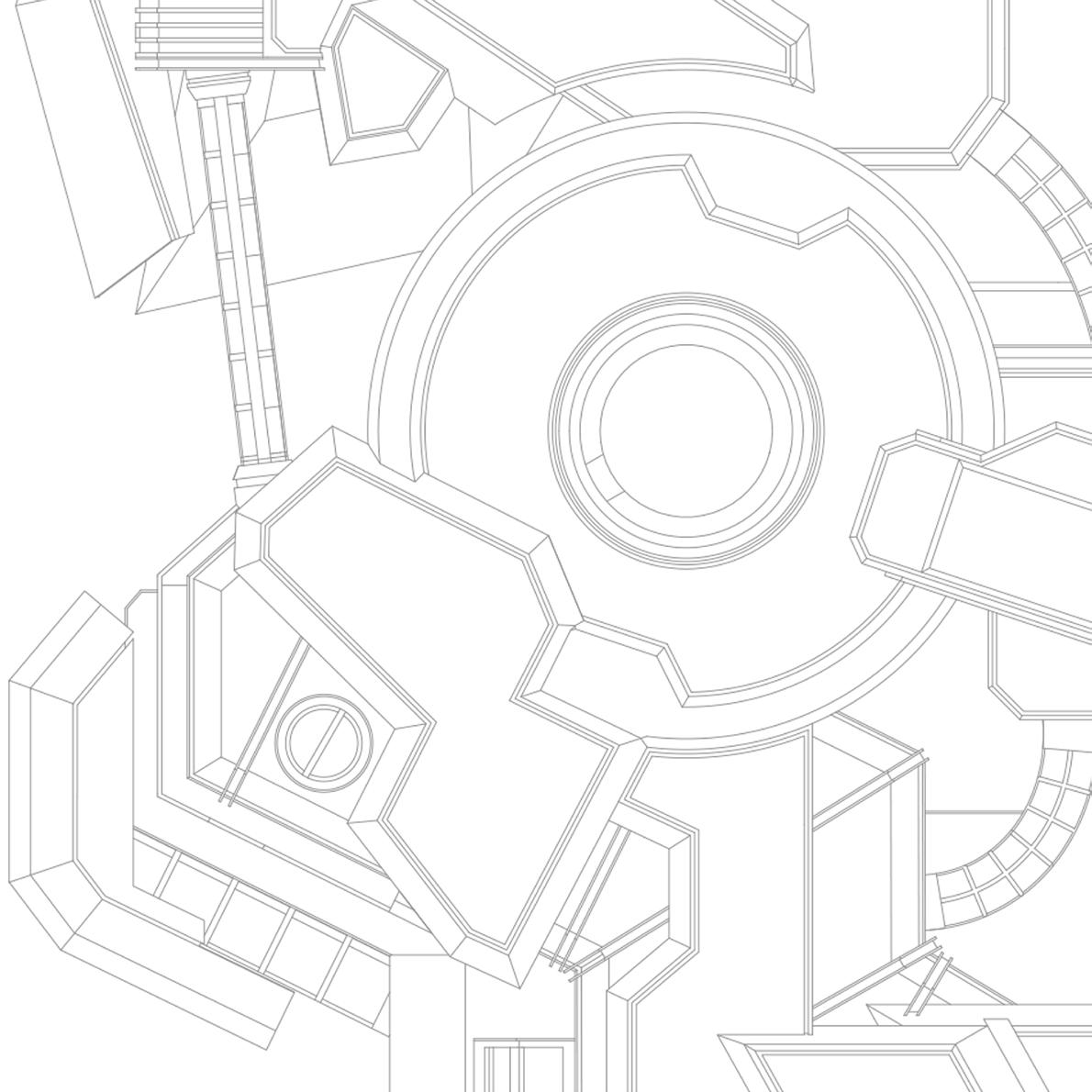
sHUCHENG zHANG (oLIVER)
APPLICATION NUMBER: 23156981
SELECTED DESIGN WORKS
2018-2022
[ RECREATION / DISASTER / LIFE / DEATH ]
School of Urban Design, Wuhan University.
Major: Architecture.
GPA: 3.82/4.0
Duncan of Jordanstone College of Art & Design, University of Dundee.
Major: BA Architecture Studies.
PROFICIENCY
RHINO SKETCHUP AUTO CAD PHOTOSHOP INDESIGN ILLUSTRATOR
WORKING EXPERIENCE
Position: Intern
Works: Plan / elevation drawing, Site investigation.
Henan Architecture Design Institue
Position: Intern Works: Site plan design, Project initial design, Digital modeling, Report document making.
Central - South Architecture Design Institue
Position: Intern Works: Concept design, Interior design, Digital modeling, Rendering, Site investigation, Report document making.
HONOR
SEP.2019 - SEP.2020
The Second Prize Scholarship in the acadamic year of 2019-2020. The Zhangren Huang Scholarship of WHU.
Outstanding Student Cadre in the acadamic year of 2019-2020.
SEP.2020 - SEP.2021
Outstanding Individual in summer social practice in 2021.
SEP.2021 - SEP.2022
The Second Prize Scholarship in the acadamic year of 2021-2022.
AWARDS
DEC.2019
The Second Prize of the National Architecure and envieonment design students art competition in China.
SEP.2021
The Third Prize of WHU Students Innovation and Entrepreneurship Competition.
AUG.2022
The Second Prize of 2022 NCDA Awards, National art & Design teacher teaching innovation contest.
LEADERSHIP
SEP.2018 - NOW
SEP.2018 - JUN.2022
SEP.2019 - JUL.2020
Monitor of WHU-UOD Architecture Cooperation Class.
President of Grade Student Union in School of Urban Design.
Leader of a Group in the Media Operation Dpartment of Student Innovation Practice Center in WHU.
EXTRACURRICULAR ACTIVITIES
JUN.2021 - FEB.2022
Joined a design team in WHU taking charge of the renovation design works of two villages in Enshi, Hubei Province as a part the Rural Revitalization Strategy in China.
OCT.2021 - DEC.2021
ABOUT ME
Assisted the professor in dormitory interior thermal environment experiment as an assistant.
My interest in architecture initially comes from my love of making models of buildings, robots or vehicles by various materials. I enjoy a lot turning the ideas in my head into 3D objects, so I chose architecture major.
I was not the smartest student, but I was always one of the most hardworking and optimistic one. My strong sense of responsibility enables me to play an important role in group cooperation.
In the future, I will keep move forward, just like my favorite Chinese adage: Feet on the ground, walk steadily and go far, and then be promising.
EDUCATION
Fivewin Architect
LUMION BLENDER V-RAY HANDMADE MODEL (Sep 2018 - Jun 2023) (Jul 2020 - Aug 2020) (Jul 2021 - Aug 2021) (Feb 2022 - Apr 2022) (Sep 2022 - Jun 2023)
SHUCHENG
(OLIVER)
ZHANG
CONTENT 01 / MAKE ARCHITECTURE LIKE A TOY / Wuhan Toys Museum Design 02 / FLOODED WUHAN / The Change & Continuation of Life in Wuhan After the City is Flooded 03 / STREET LIFE / Design of Rental Apartments in New Urban Agglomerations in the Age of Population Mobility 04 / ONE LAST DEDICATION / Sky Burial Center Design in Tibet 05 OTHER WORKS

MAKE ARCHITECTURE LIKE A TOY
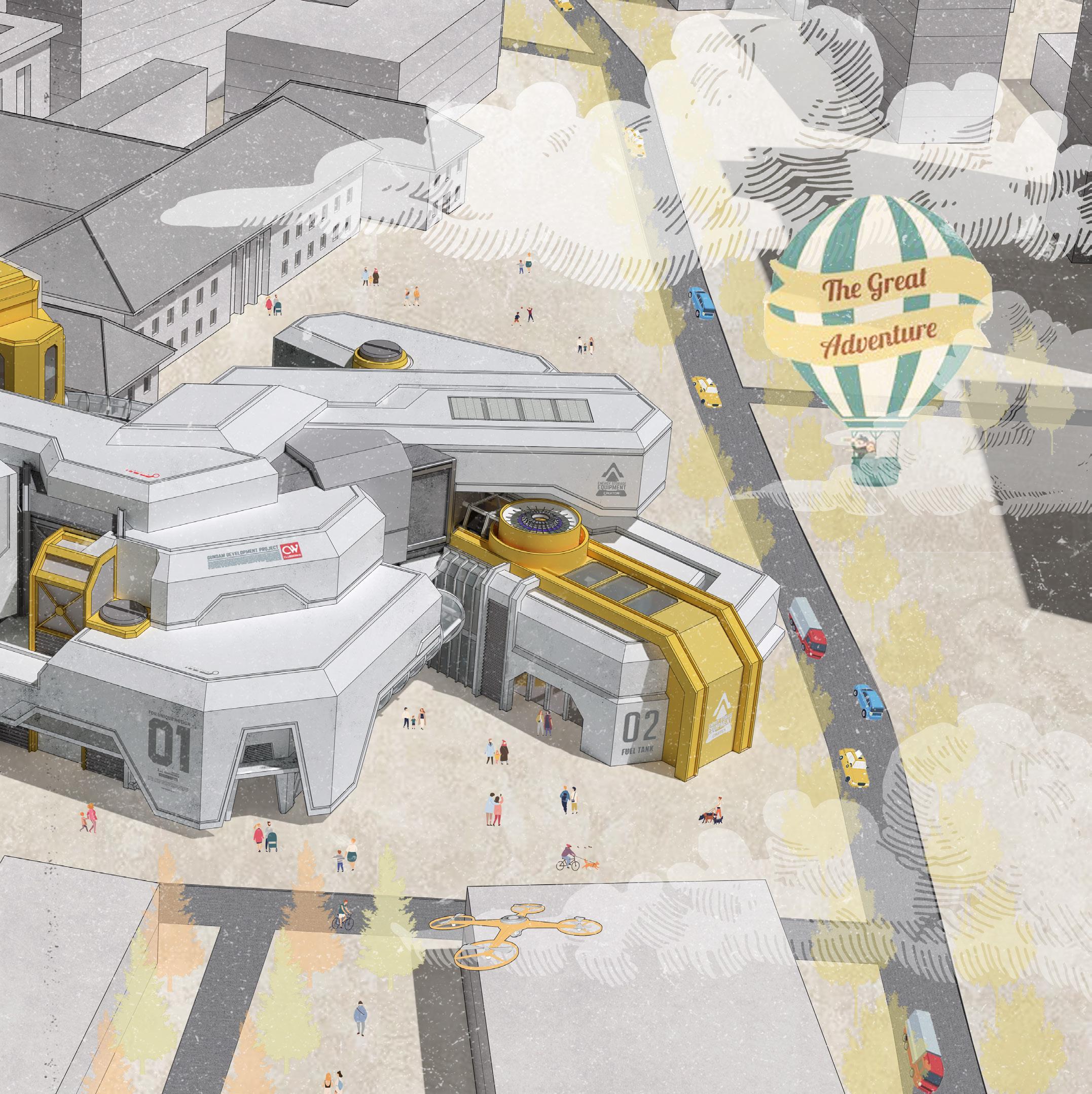
Wuhan Toys Museum Design
Individual Work Site: Wuhan, China Time: Feb 2021
We are all familiar with toys, which bring happiness to people in all ages. What happens if we apply the texture, details and design skills to architecture? The answer is they make the architecture like 'a big toy'. Now, a museum of toys is planed to be built in Wuhan to enriching people's entertainment options in the age of the internet. Come to this museum, they can play with toys in 'a big toy'.
Existing Museums in Wuhan

 The Revolution of 1911 Museum Zhang Zhidong & Wuhan Museum
Hubei Historical Museum Zhongshan Ship Museum Chinese Architecture Museum
The Revolution of 1911 Museum Zhang Zhidong & Wuhan Museum
Hubei Historical Museum Zhongshan Ship Museum Chinese Architecture Museum
SITE
Human & Toys & Architecture
The idea of toys come from both reality and imagination. There are various toys which bring joy to people in all ages because they bring what people loved and dreamed to somthing they can really touch and collect. Toys come from life and beyond that. This new museum is not only a traditional exhibition space, but a toys world. From the function aspect, people can find where toys come from, how toys are designed and produced or even make and their own toys with the help of the staff. From the Form and space aspect, I hope to take some elements from the toy design and apply them to the architecture. What's interesting is that the details on the toys are transformed from real things or imagination, and when I extract and enlarge these elements and applied them to the architectural design, it made the whole building look like a big toy.
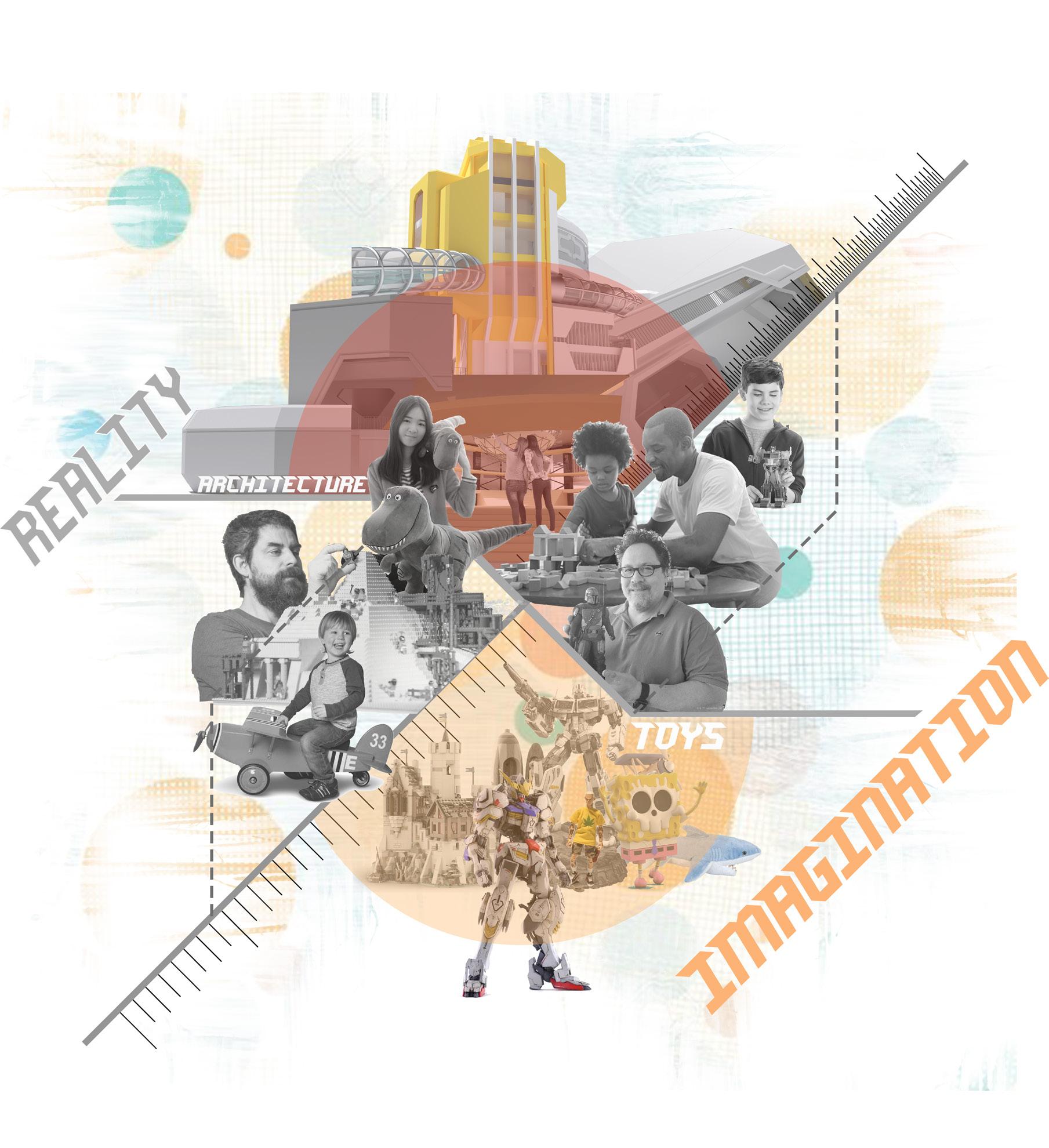
TYPOLOGY STUDY OF TOY'S ELEMENTS
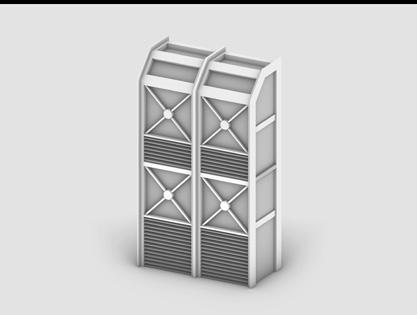
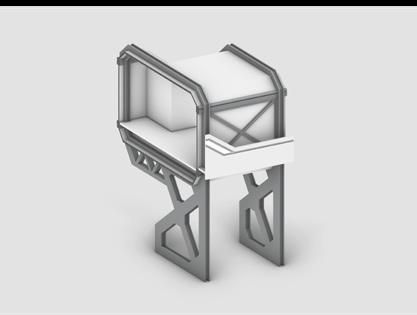
SCRIBING
SCULPTURE
DECALS
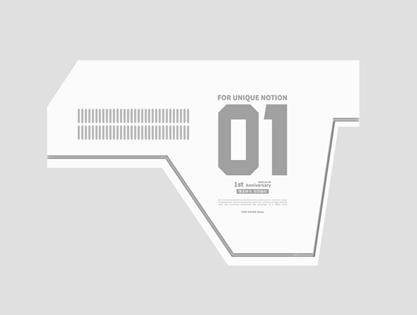
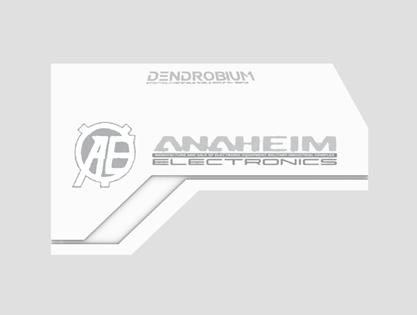
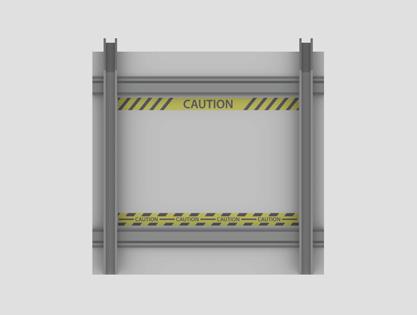

People usually use several methods to make toys more realsitic, for example, simplify and exaggerate elements like seams and rivets when bring something from reality to toys or add more details and decals when bring somthing from imagination to toys. Scribing, structure details, sculpture and decal are four typical elements used in toys design.
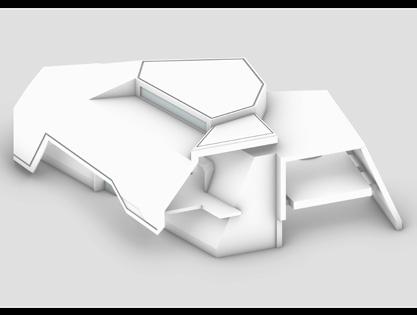
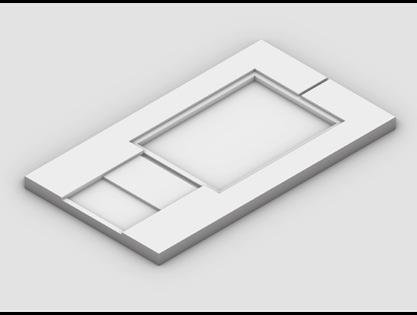
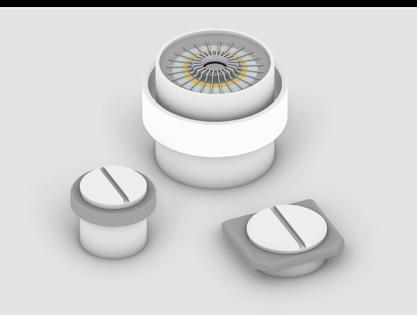
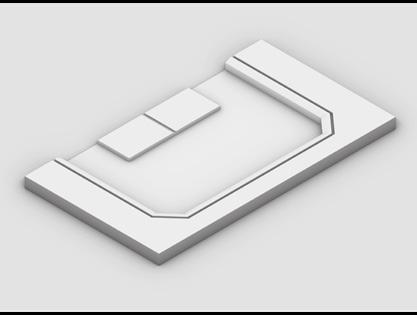
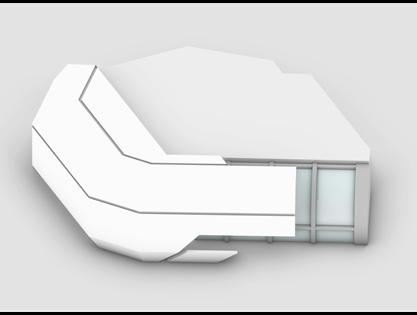

Warning Line
Type 1
Type 1
Type 1
Type 2
Type 2
Type 2
Type 3
Type 3
Type 3
Word
mark
Number & Pattern Signal
STRUCTURE DETAIL
The Mixture of Toy's Elements
All the ideas took from toys are combined together creating space, structure and facade. Those elements of toys are originally intended to make toys closer to the real things. However, when they are reorganized in an architecture, they make it like a huge toy.

VIRTUAL WORLD
This is the first part on the visit route. Peole will come in to the world of imagination with big screens and projections surrounding them. This is where the idea of toys come from.
LEISURE PART
This part includes the main entrance of visitors where they can go down to the virtual world, atrim and toys theme leisure space like shops and cafe.
EXPERIENCE CENTER
This is the space where people can make thier own toys like gundam, lego or 3D printing things. The double height atrim can be used as a lecture hall for experience sharing.
TOYS FACTORY PART 1
This large space on the top include a toy production line. tourists are allowed to visit this factory through the upper corridors. where they can find how toys are brought to the reality.
CORE
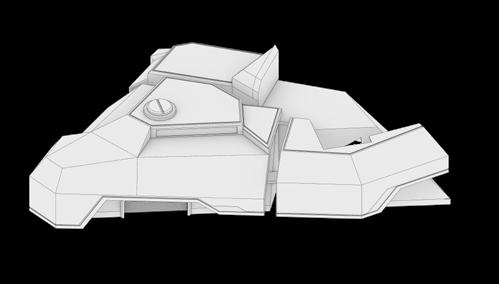
After people visit the factory, they will come in to the top of the core and visit several exhibition hall which are connected by a rotary ramp. A big stage is located at the bottom.
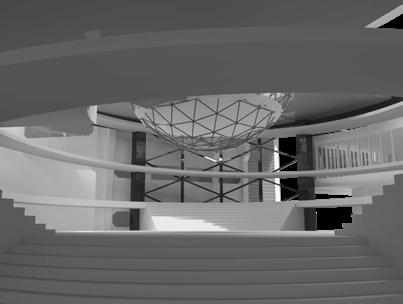
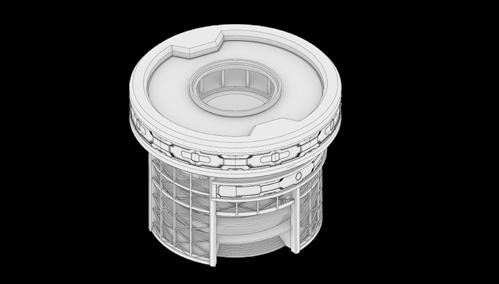
TOYS FACTORY PART 2
This part is used for sorting and packaging the product come from part 1. Several workshops are also included for handmade toys making.
DESIGN STUDIO
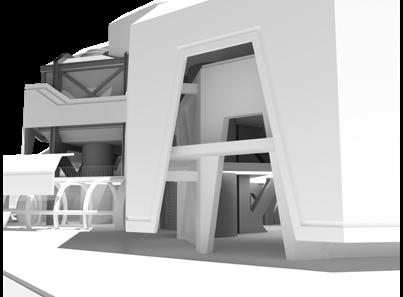
This part include several studios and chatting space for toys designer. Three tubular corridors connect it with two factory parts and the leisure part.

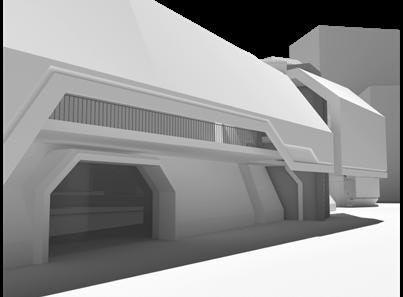

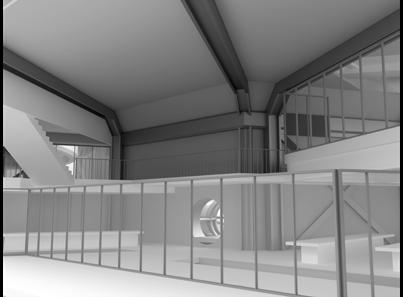
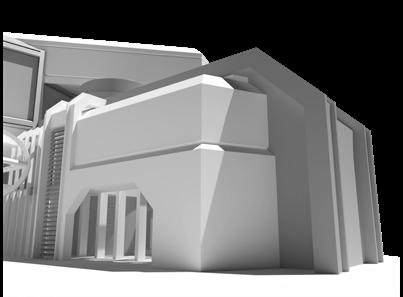
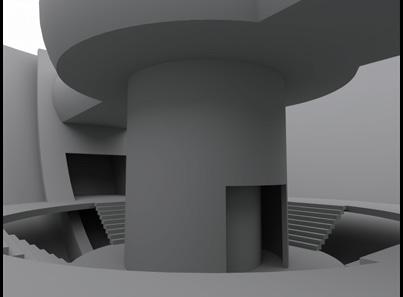
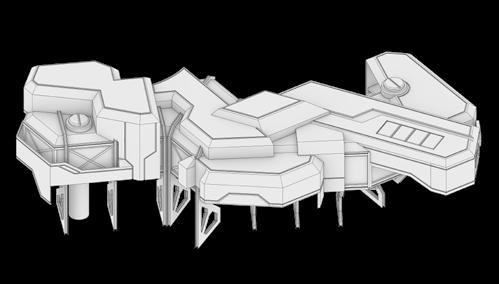
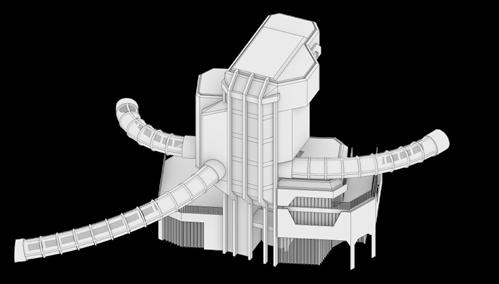
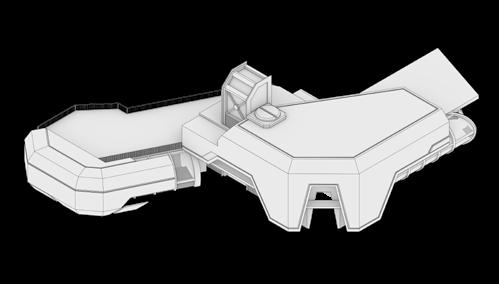
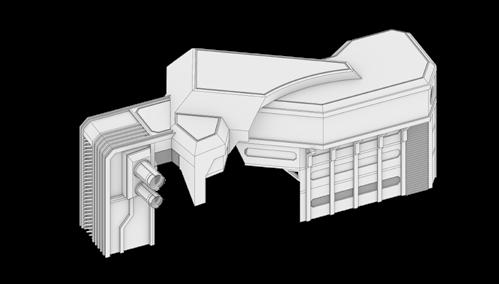


EXHIBITION HALL
The exhibition hall located at the north is used for large-scale temporary exhibitions. There are three floors inside and a corridor around it.
8 parts are organized together according to the shape of site and the relationship between different fucntion areas, which creates a world of toys. Not only can people enjoy the production and exhibition of toys, also they can meet people with same hobby, learn the idea of toys design and make their own toys.
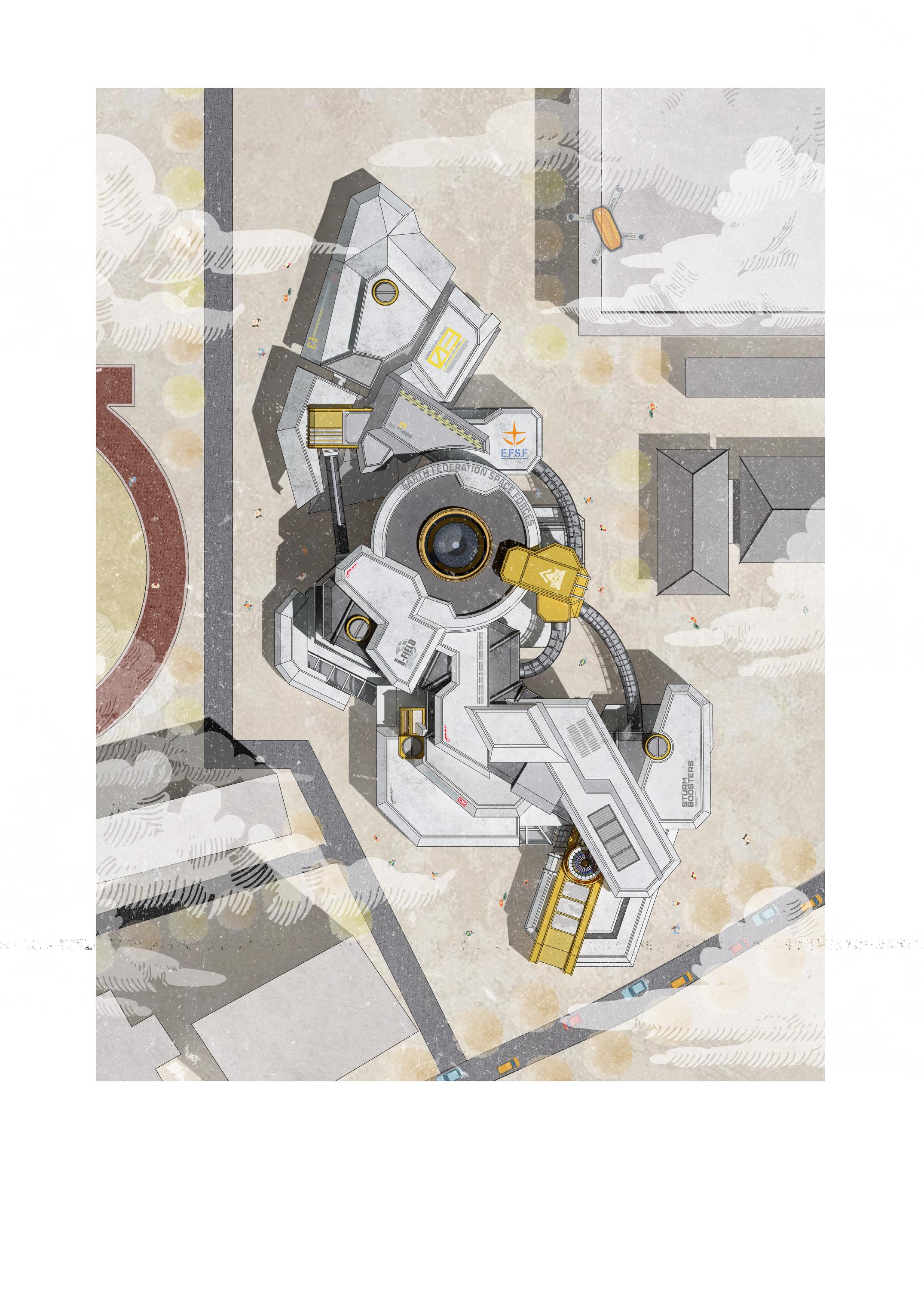
Top View Rendering

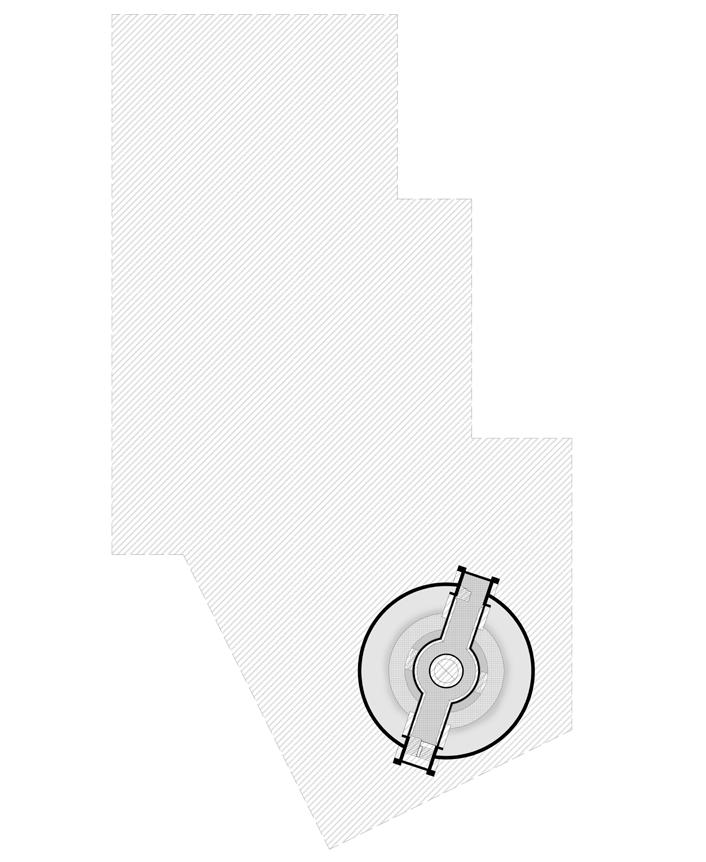

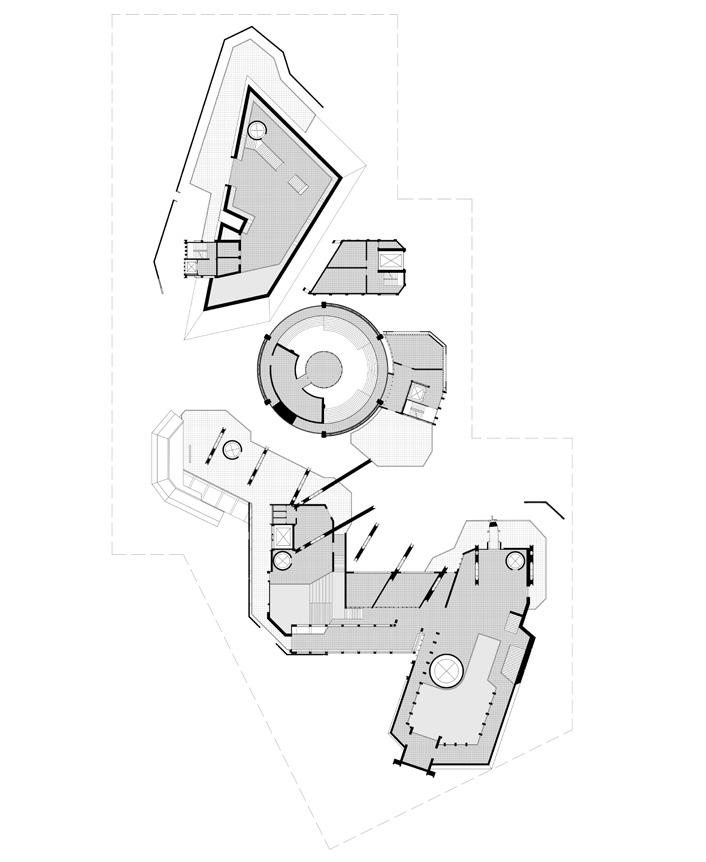
BASEMENT 1.Virtual experience space 1 2.Virtual experience space 2 GROUND FLOOR 1.Atrim 2.Lecture hall 3.Toys making experience 4.Toys shop 5.Central stage FIRST FLOOR 1.Toys cafe 2.Toys making experience 3.Toys playing space 4.Designer studio 5.Exhibition hall 6.Exhibition hall 7.Toys storage room 8.Facilities & service 6.Facilities & service Perspective 1 1 1 2 2 2 4 4 5 5 5 6 6 6 7 8 8 8 3 3
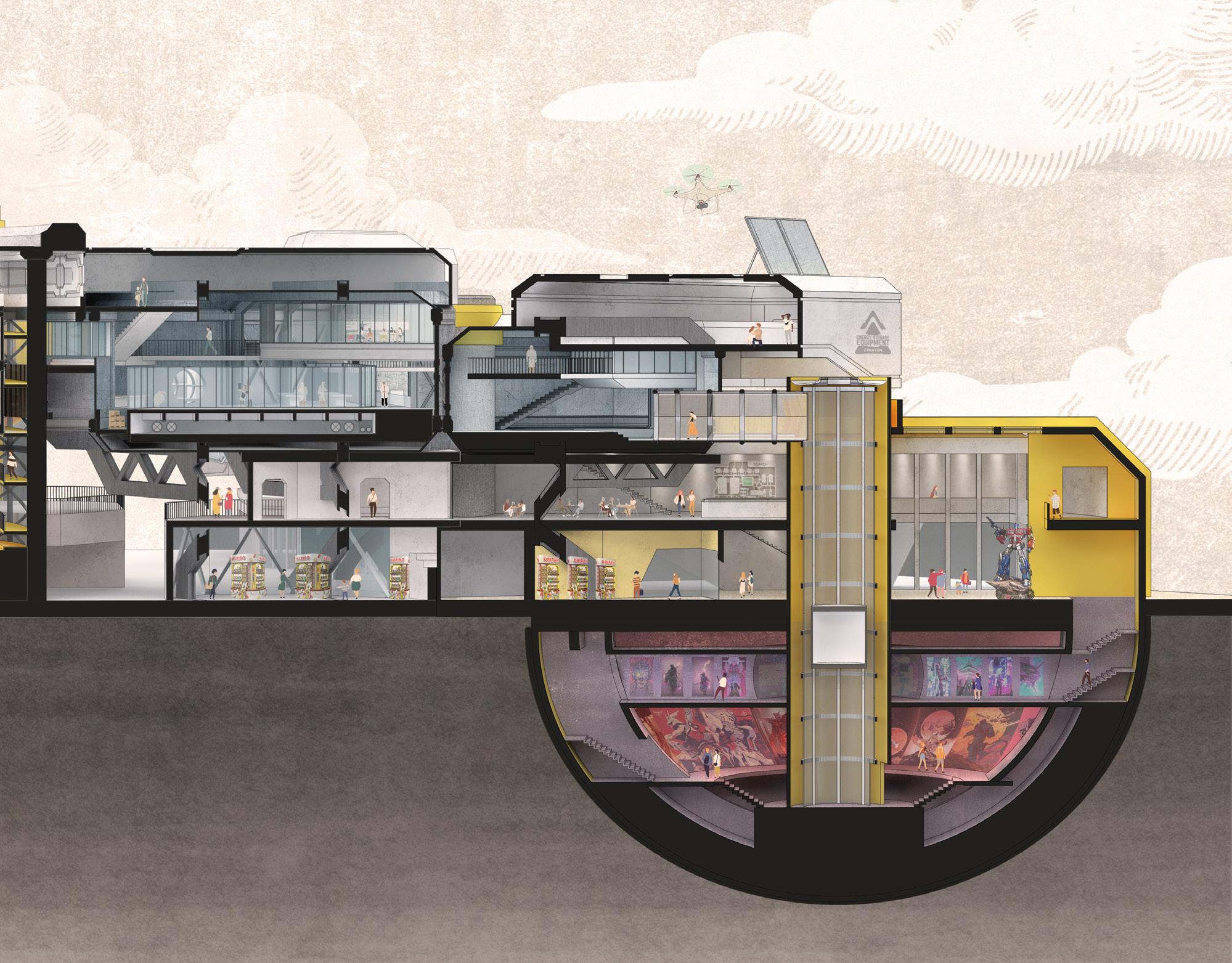
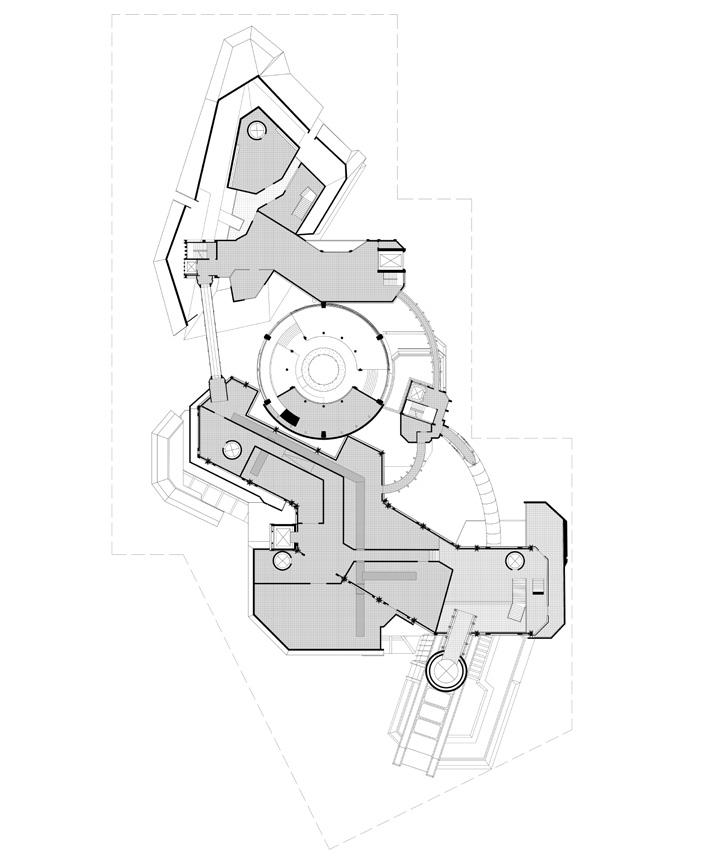
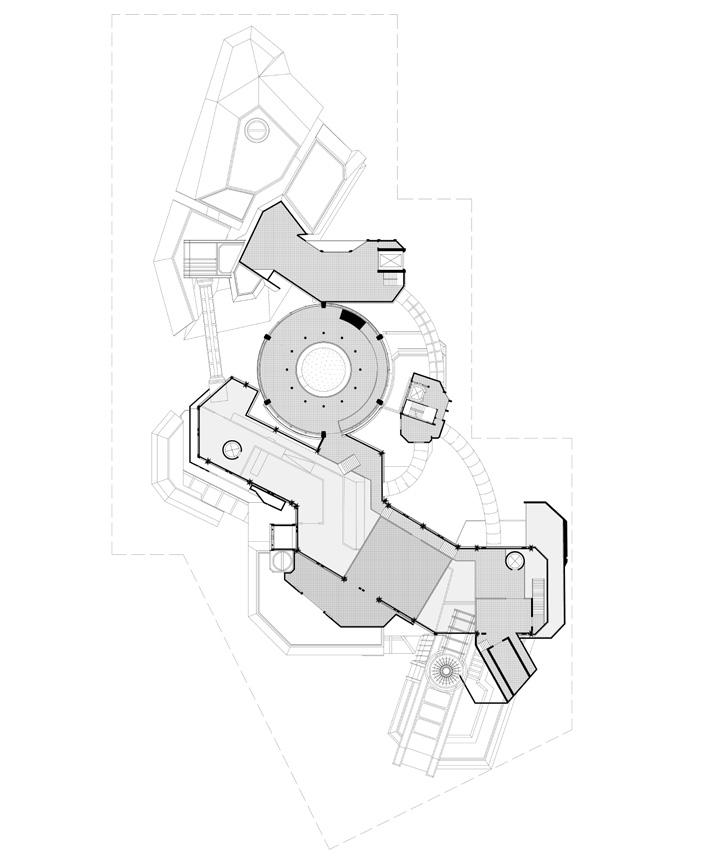

FLOOR 1.Toys production line 2.Atrim of product center 3.Leisure space 4.Designer studio 5.Exhibition hall
FLOOR 1.Produnction Studio 2.Chating space 3.Toy aircraft lab 4.Designer studio 5.Exhibition hall
FLOOR 1.Drone Lab 2.Toy aircraft lab 3.Exhibition hall 4.Designer studio 6.Facilities & service 7.Toys packing space 6.Facilities & service 7.Toys packing space Perspective Section 1 1 1 2 2 2 4 4 4 5 5 5 6 6 7 7 3 3 3
SECOND
THIRD
FORTH
Perspective View From the Gym
This image took from the existing gym on the west. It shows clearly about how I give the museum the texture of toys. In this rendering you can find a walking path in the centre which can let people go through different parts of the building. When you go through you can find the exhibition hall and the main stage on your left and the toys experience center and shops on your right.

Perspective View From the Main Entrance
This image took from the other side of the street. It shows clearly about how the elements tooked from toys are used in architecture deisgn to create form and spaces. In this rendering you can find the main entrance which marked by a big decal on the top, shops on the right side of it shading by the cantilever of the toys factory. On the top there is the gate for flying toy planes.


FLOODED WUHAN
The change & continuation of life in Wuhan after the city was flooded
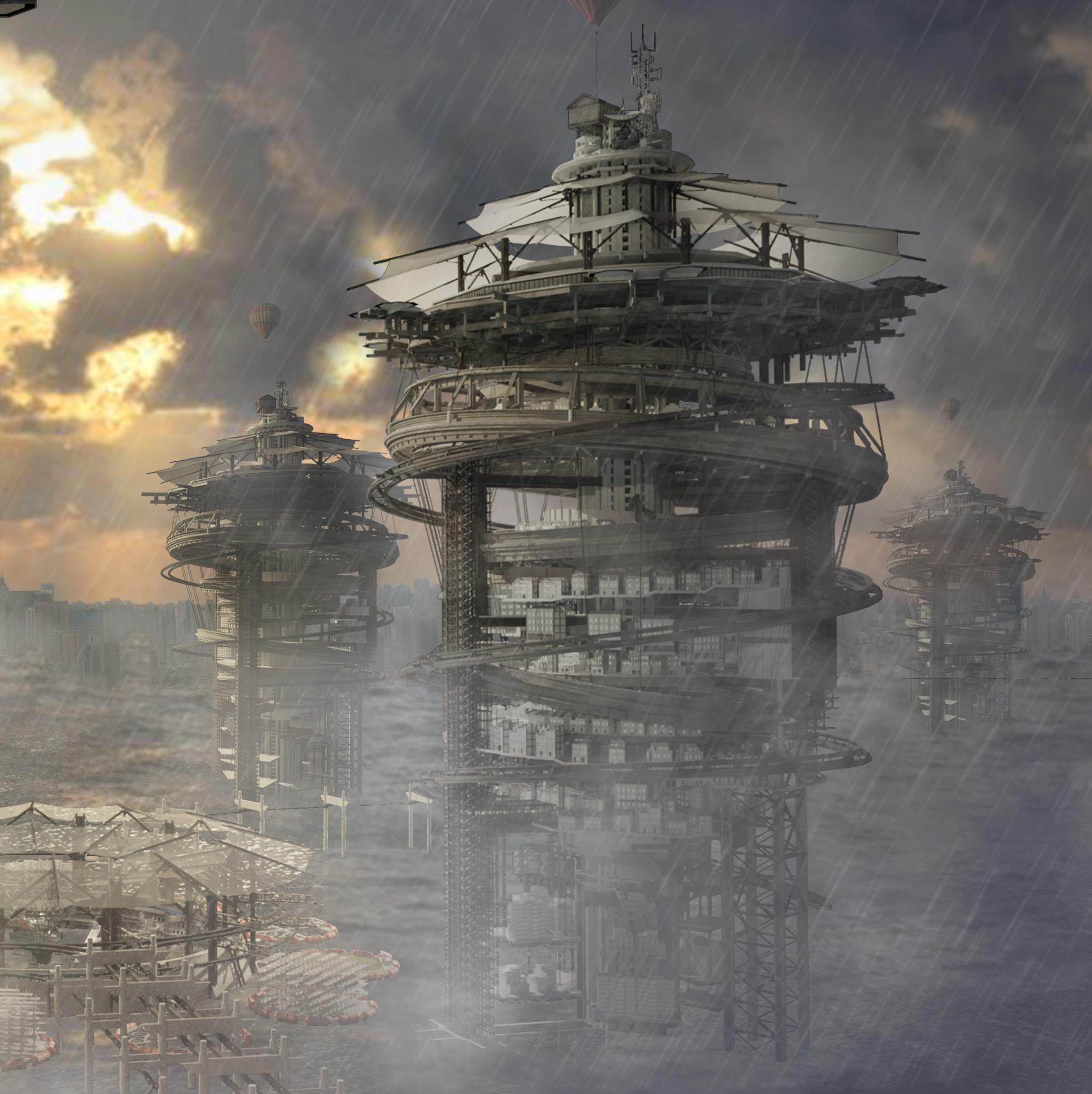
Individual Work Site: Wuhan, China Time: March 2022
Wuhan, a city along the Yangtze River, has been harassed by floods for thousands of years. In the future, with global climate change, this city is likely to experience more severe flooding. This project provide a possible solution to live with flooding with the help of accomdation towers, dams, mechines and floating farms. Most of the existing elements in the city will be preserved while organized with a new logic. People can still recognize they living in Wuhan although the life trajectory has changed.

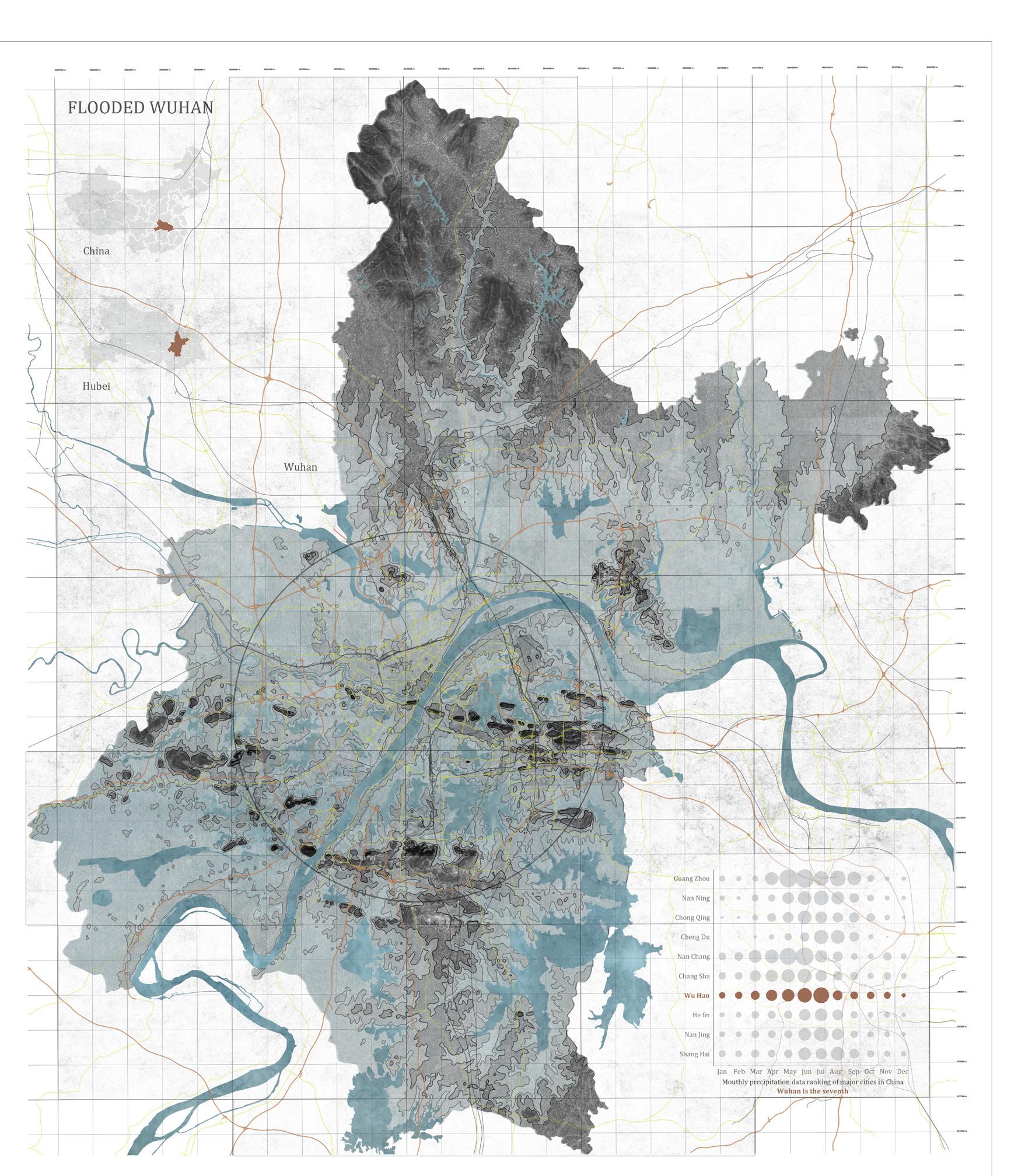
Flooded when water level rose 10 m Flooded when water level rose 2 m Flooded when water level rose 20m Flood in Zhengzhou 2021 Flood in Wuhan 2020 2021 Flood in Guangzhou 2020 2022 Flood in Chongqing 2020
Direct economic loss of flood and waterlogging disasters in China in recent 30 years.
In recent 30 years, with the rapid growth of China's GDP and the increase of global extreme climate, the economic losses caused by each flood disaster are increasing continually. Although the Chinese government is accelerating the construction of water conservancy facailities and disaster relief teams, the old drainge system in Wuhan is insufficient to withstand extreme rainfall.
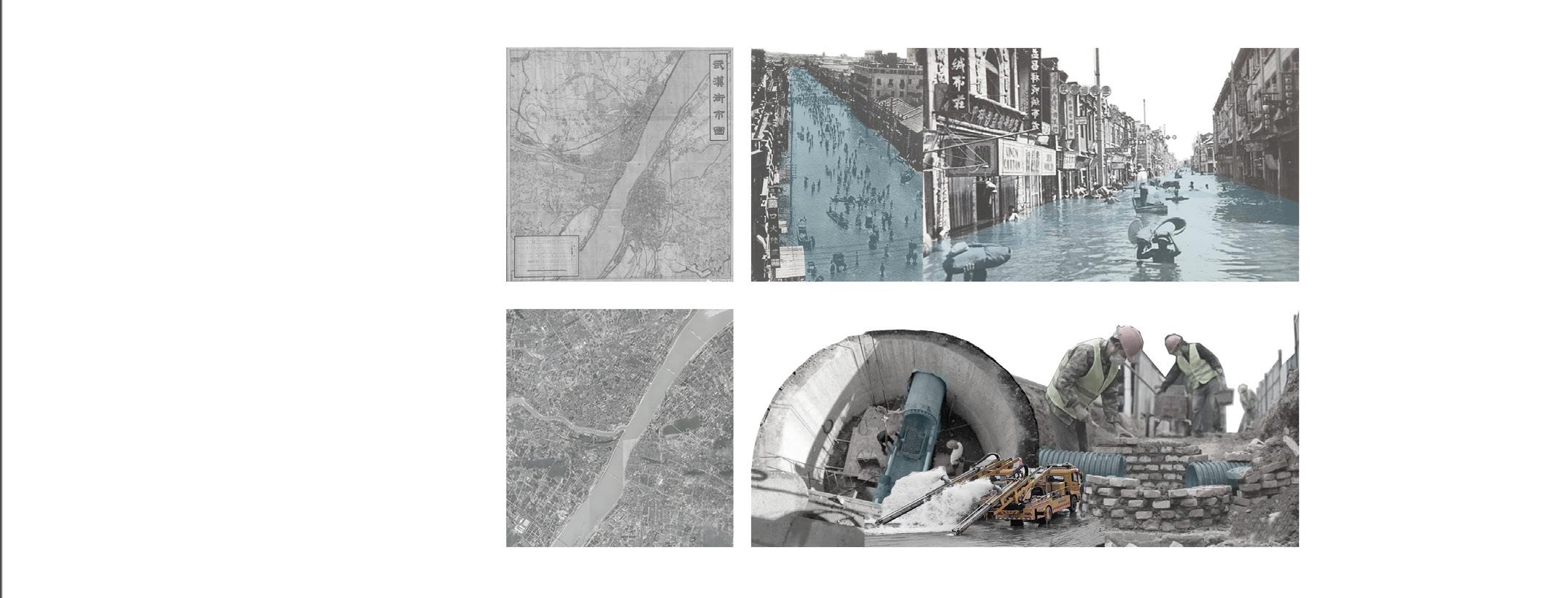
Wuhan is located at the confluence of two rivers and has heavy rainfall each year. So it's been suffered from flood since ancient times. Floods in 1931 killed thousands of people and displaced 400,000 residents in Wuhan. During the past 20 years Wuhan has expanded rapidly, but the quality of its drainage system cannot meet the flood control needs when heavy rains come. The Wuhan government has been working to renovate the city's drainage system for several years, but with limited success.
Wuhan has plenty of historical heritages in both Chinese and western style due to it's complex historical position.
Nowadays, Wuhan is one of the economic center in central China, which is a high density city with skyscrapers and various modern facilities.
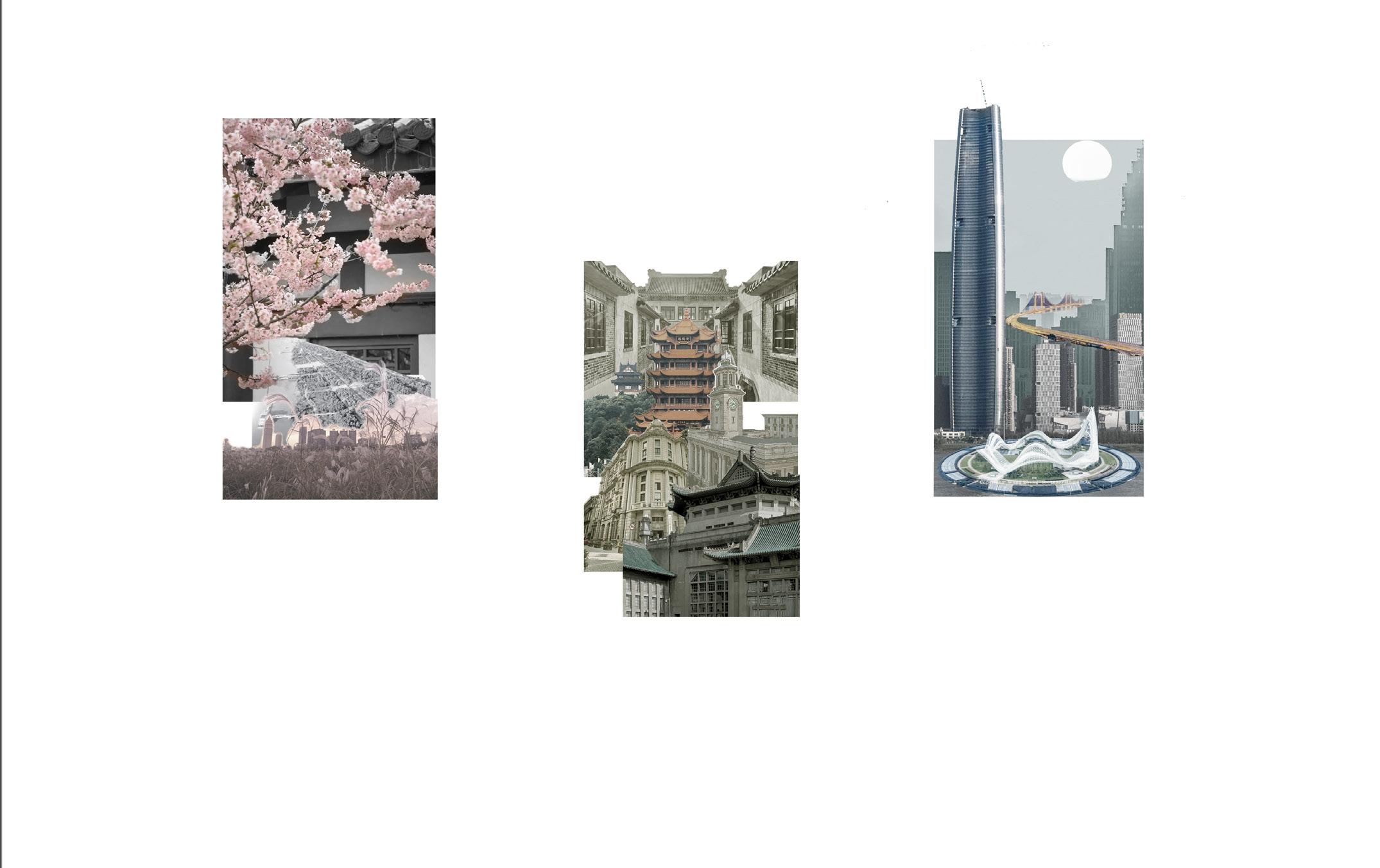
1990 100 billion RMB 200 billion RMB 300 billion RMB 2000 2005 2010 2015 2020 1995 WUHAN 1931 WUHAN 2022
HISTORY MODERN
Wuhan is famous for its sakura, parks and the scenery on the bank of the Yangtze River.
NATURE
The complexity of Wuhan City
PROCESS OF TRANSFORMATION
Wuhan is a city that full of complexity, These drawings are going to show the typology study and how different types of buildings can be preserved in the new system.
Step 0: City before the flood
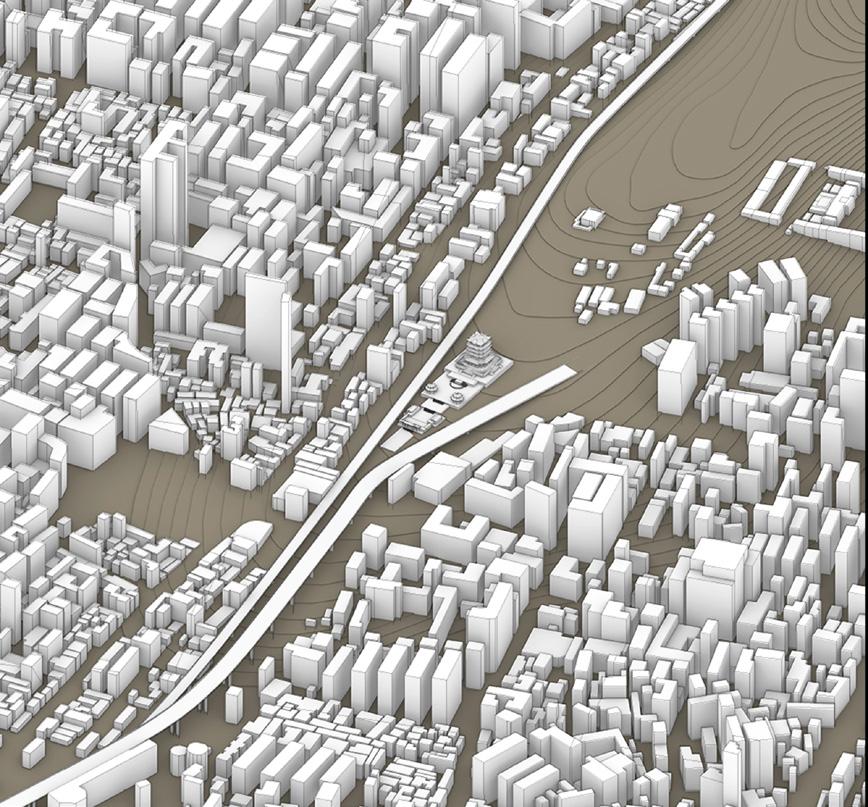
Wuhan is a complex city with long history, where the historic building in eastern and western style stay together with plenty of skscrapers. Viaducts and rail transit run through the mian roads.
Step 1: Tower & dam construction, building transfer
In order to defend the increasingly severe flooding, the city is going to be reorganized. The construction of towers that can accommodate the existing small or medium-size buildings will be started, as well as the dam that surround the large area needed to be protect. Giant modular mechines will help during the process.
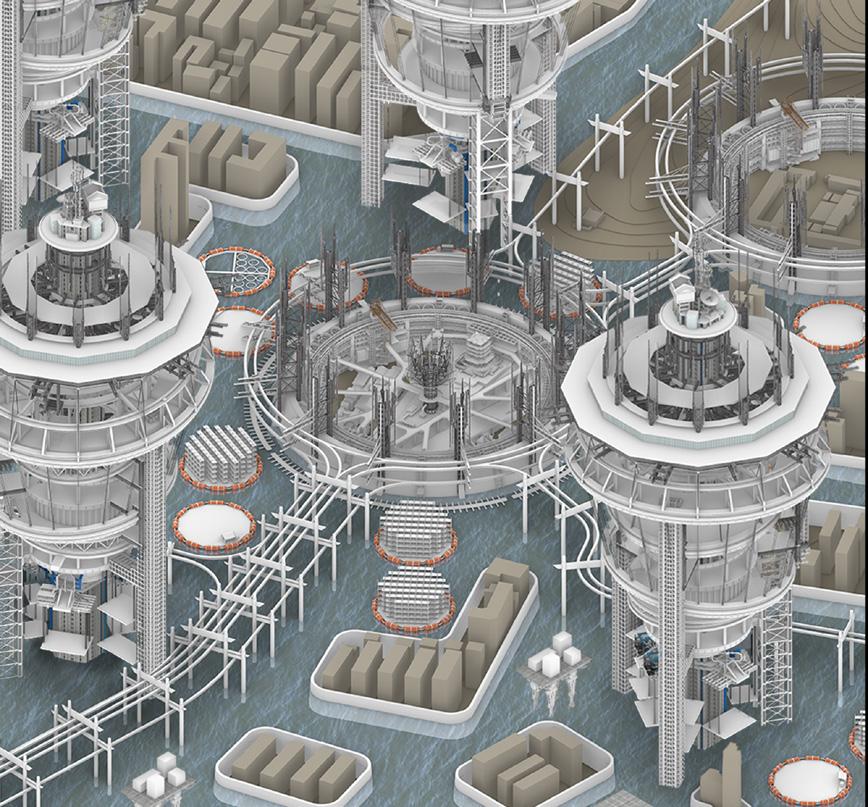
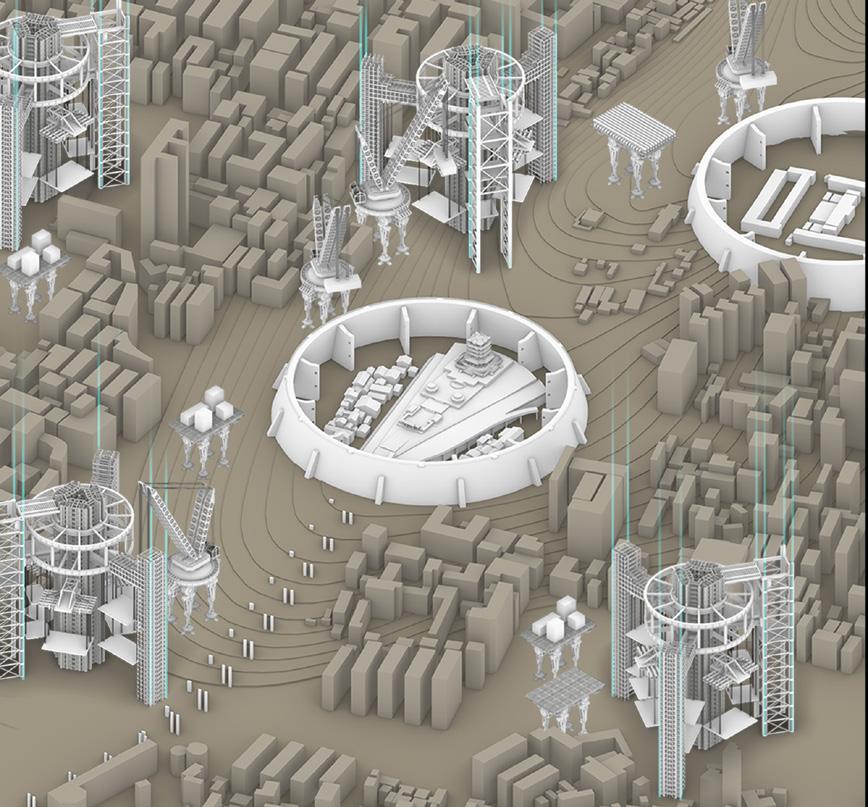
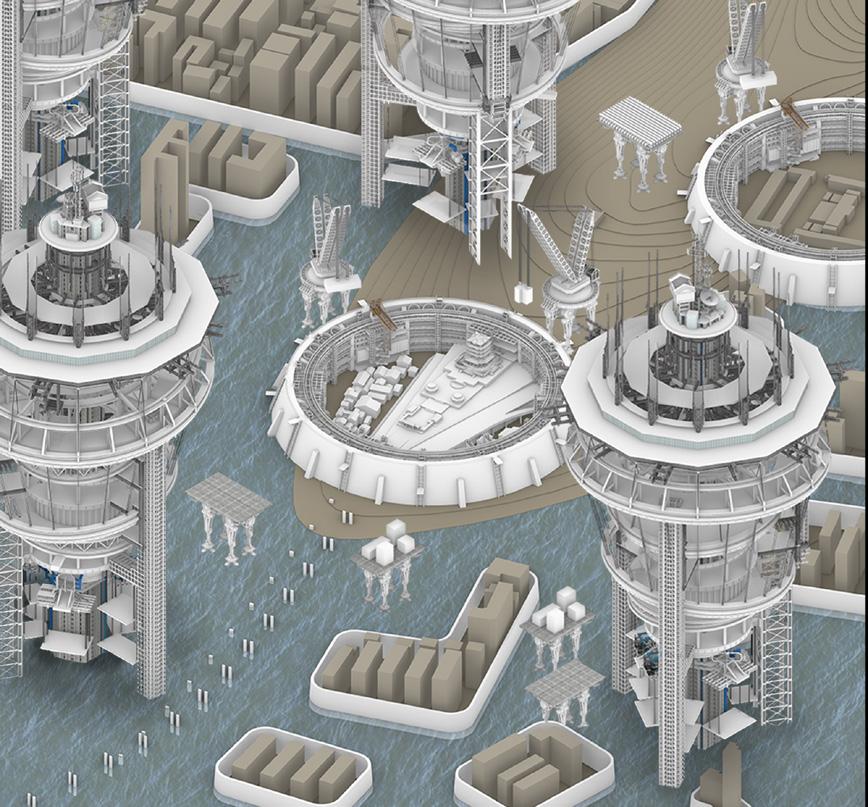
After the accommodation tower is built, more existing building can be placed on it with the help of mechine. More modular living and public space will be placed inside the dams and on the towers to make each of them a integrated community. Existing high-rise buildings will be protected by small modular levees.
After the construction of each part, finally a new rail transit system will be planned to connect each part of the city from the sky, which will work together with boats and mechines to take charge of the personnel and cargo transport. Floating argricultural module will be organized to serve the citizens.
Step 2: Modular construction, building transfer
Step 3: Transportation system & agricultural module

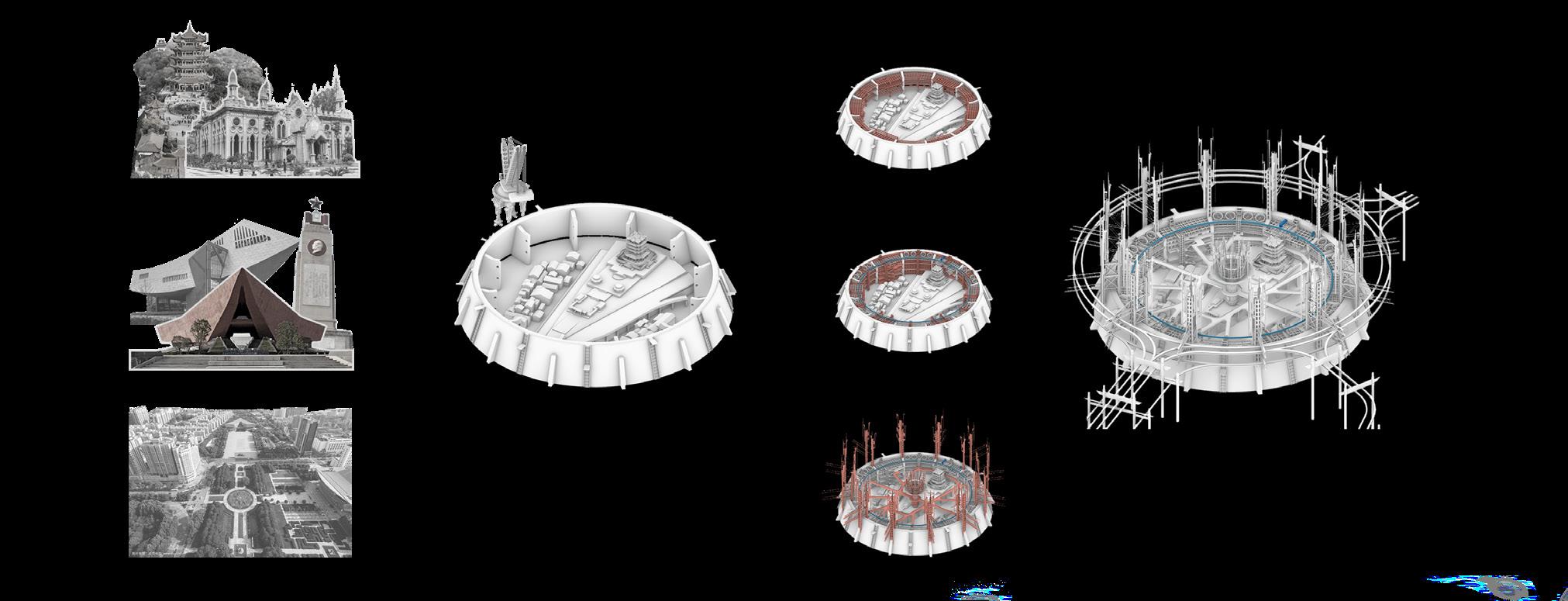
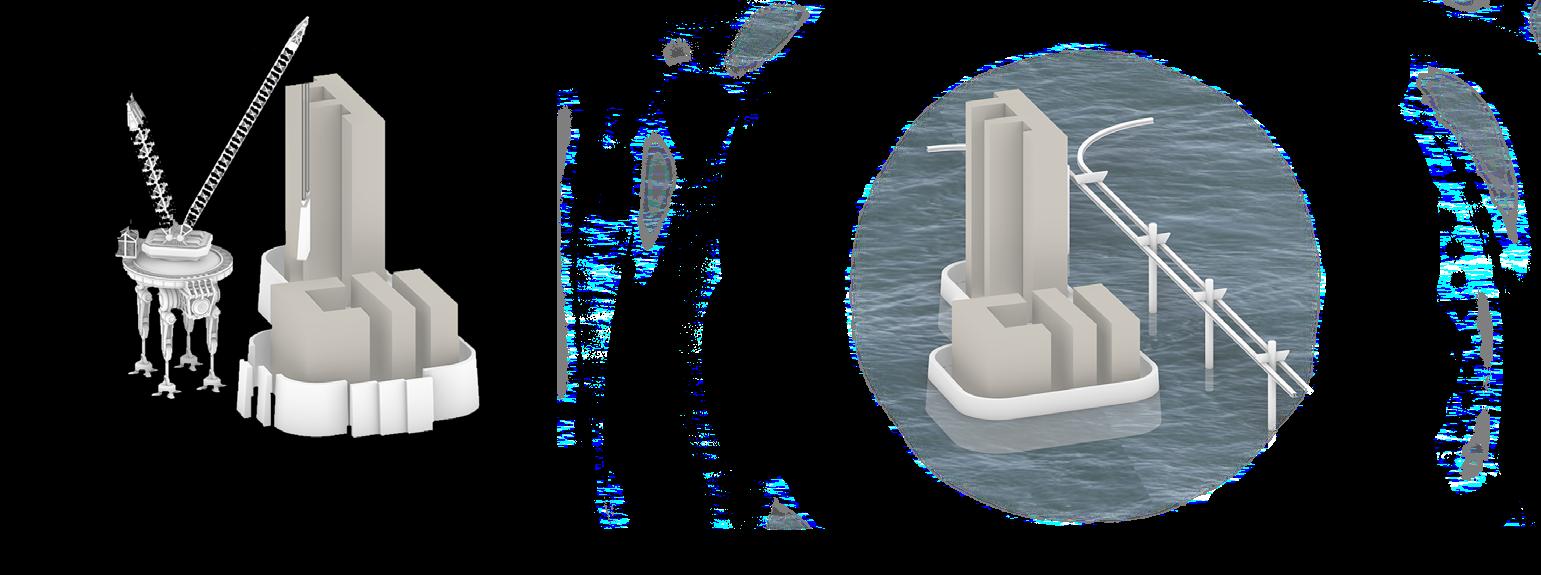

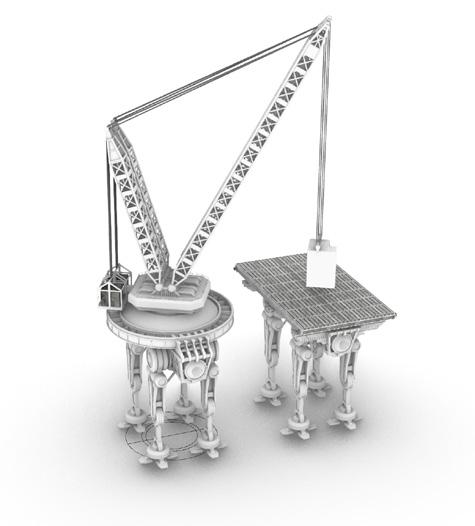


single Architectural Heritage Li-fen
Area Type 1 Pack Type 2 Dismantle
Large Heritage
Collected by mechines
Protected by the Circular Dam
Modular water proof walls are constructesd
Sky scrapers are connected by new transportation system
New integrated living area completed
Existing viaducts are transfered into the base of the rail transit system and public spaces.
Modular Construction
Transported to the tower Placed on the tower Self-build Building Monument Old Residence
Park / Plaza
Sky scraper Modern residence Transportation system

CONPONENTS OF ACCOMMODATION TOWER
The building accommodation tower combined by several parts: living circles and platforms, vertical transport system for buildings, viertical circulation system for residents, modular built public spaces, folding canopy and water treatment system, which make sure the tower can meet the need of daily life.
 Living sewage Treatment system
Tap water purification system
Sky rail transit system
Modular built public&tansport space
Folding canopy on the top to shade roof terrace
Roof terrace for exercise, commercial and leisure activities.
Living cricle type 1
Living cricle type 2
Living cricle type 3
Living platform type 1
Vertical building transport system
Living sewage Treatment system
Tap water purification system
Sky rail transit system
Modular built public&tansport space
Folding canopy on the top to shade roof terrace
Roof terrace for exercise, commercial and leisure activities.
Living cricle type 1
Living cricle type 2
Living cricle type 3
Living platform type 1
Vertical building transport system
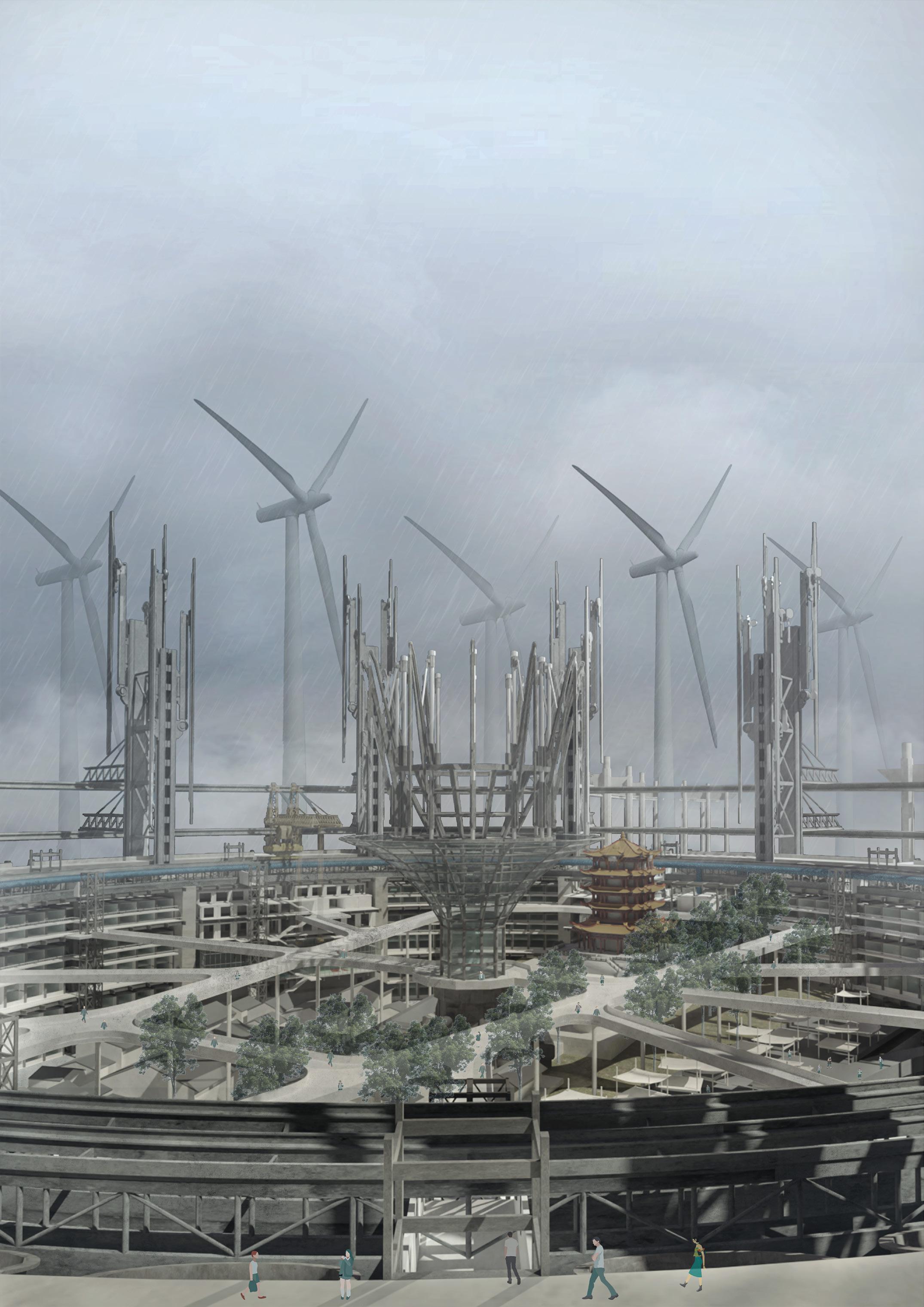
COMPONENT OF DAM AREA
Crane
the track around the dam that helping build and maintain modules in different functions.
Modular built spaces include
Lift module
Circulation module
Structure frame
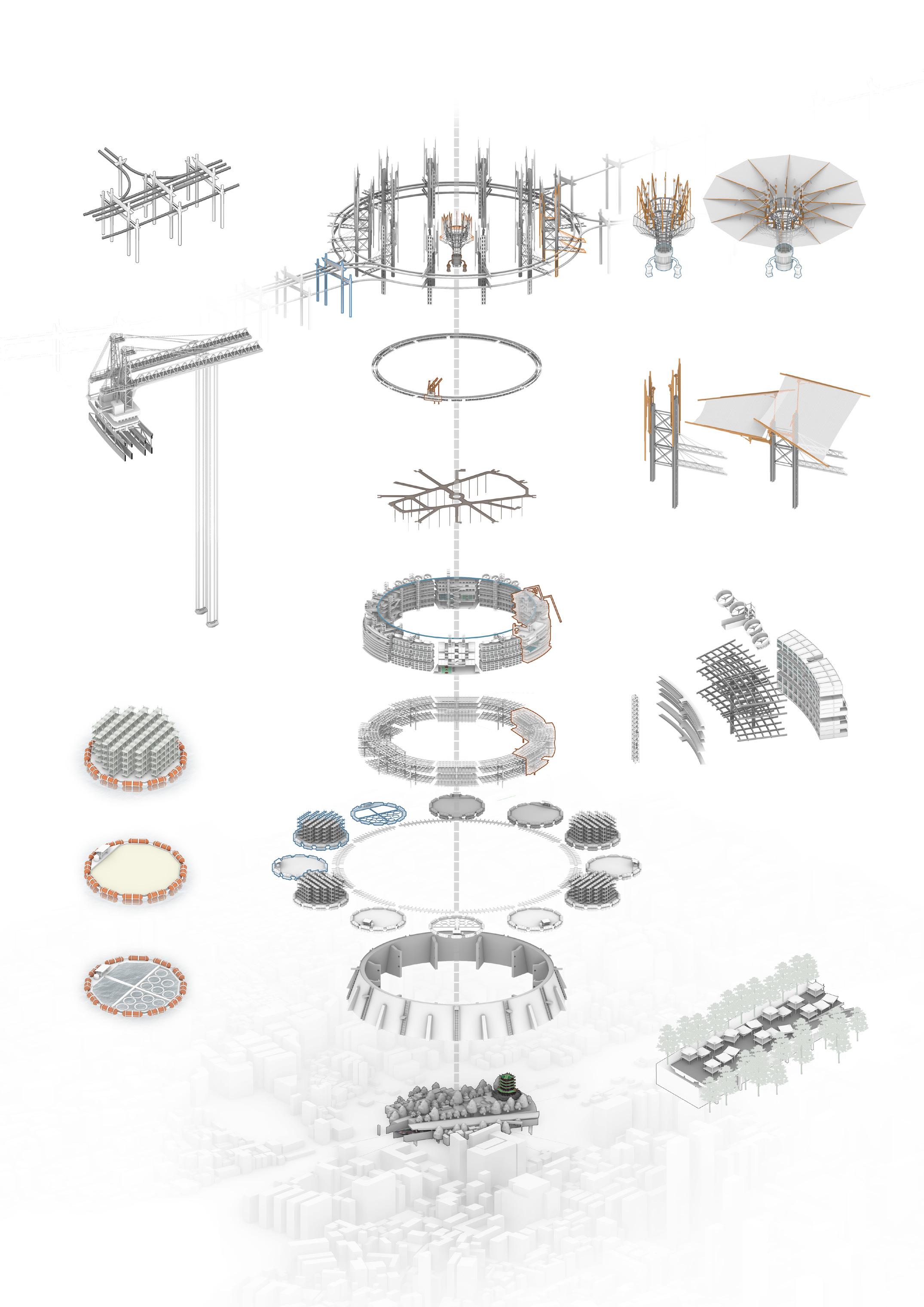
Functional module
Aquqculture module
These floating modules will provide foods for the city after conventional farmland has been flooded.
Outside commercial spaces and public spaces regenerated from the existing viaducts.
Folding canopy at the edge sharing the strcuture frame with the transportation system.
Central folding canopy with hydroelectric generator below.
Sky rail transit system
and
Vertical agriculture module
Traditional farm module
MODULAR LIVING AREA IN THE DAM
Facility Module

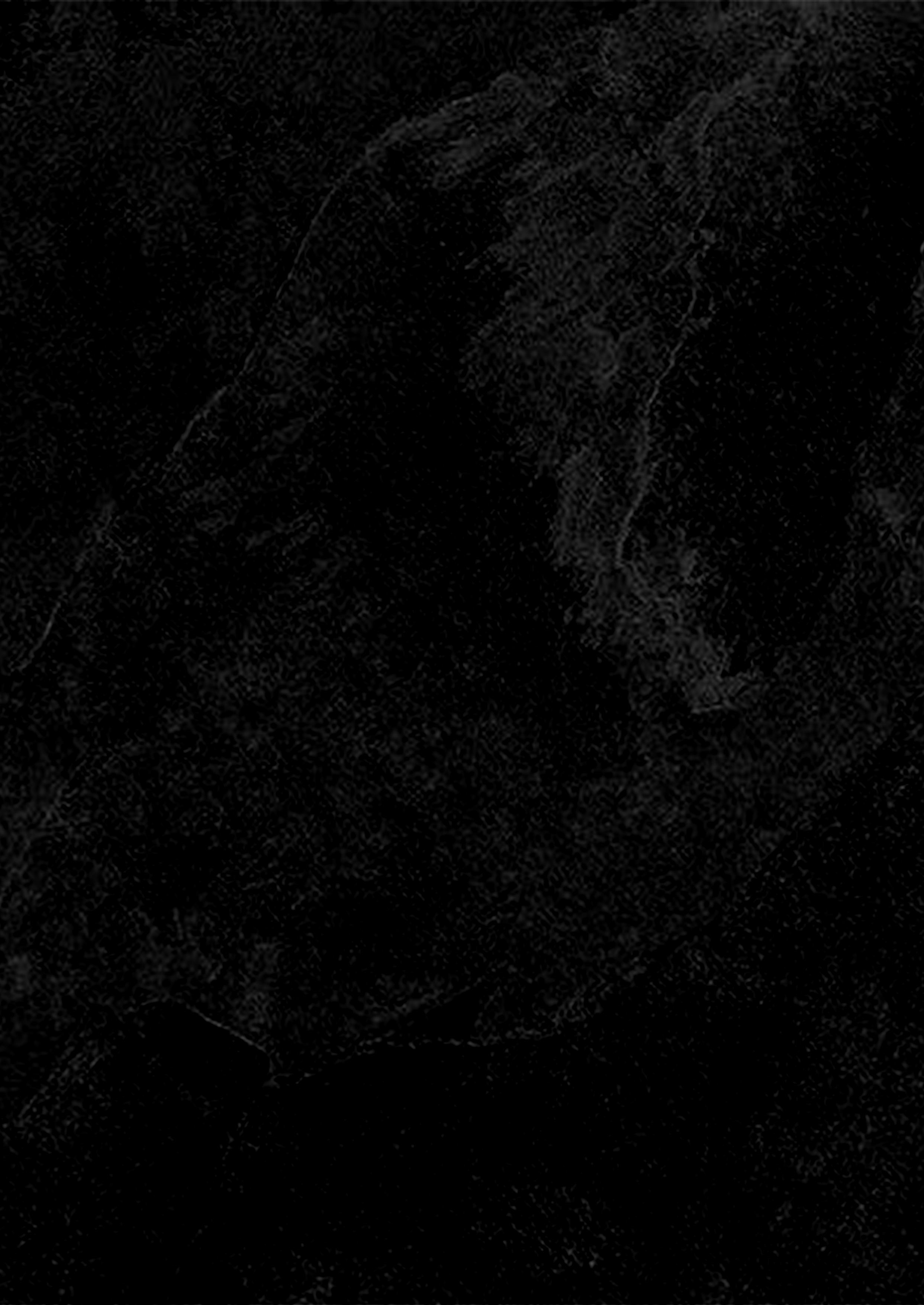
This module includes facilities for sewage treatment, domestic water purification, power transmission and so on to support the entire living area.
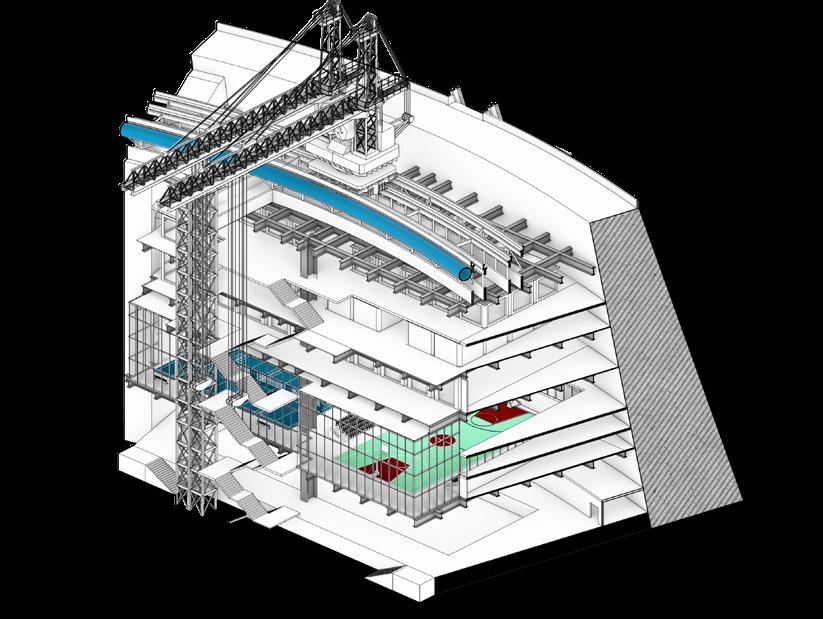
Residence Module
This module can accommodate different living units for singles for families. A gap is reserved between the living units and the dam for thermal ventilation.
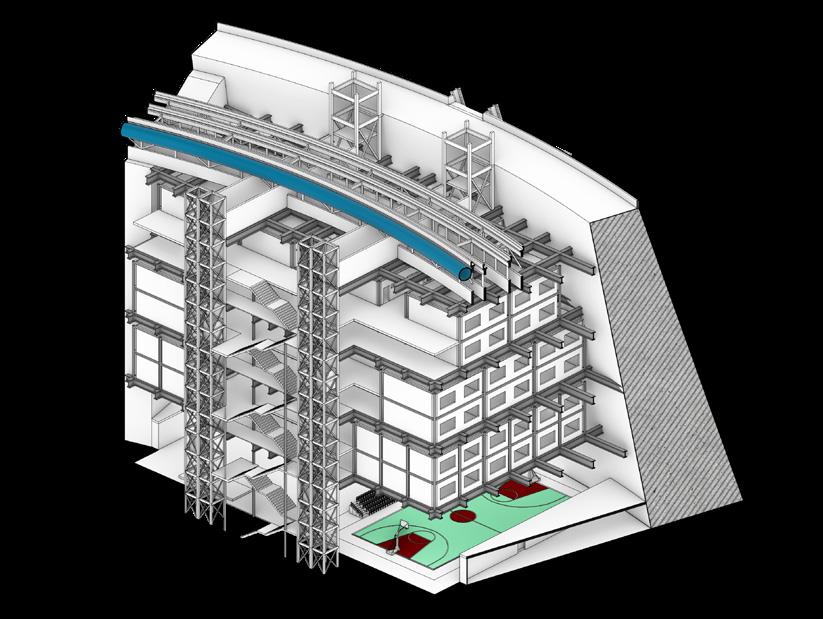
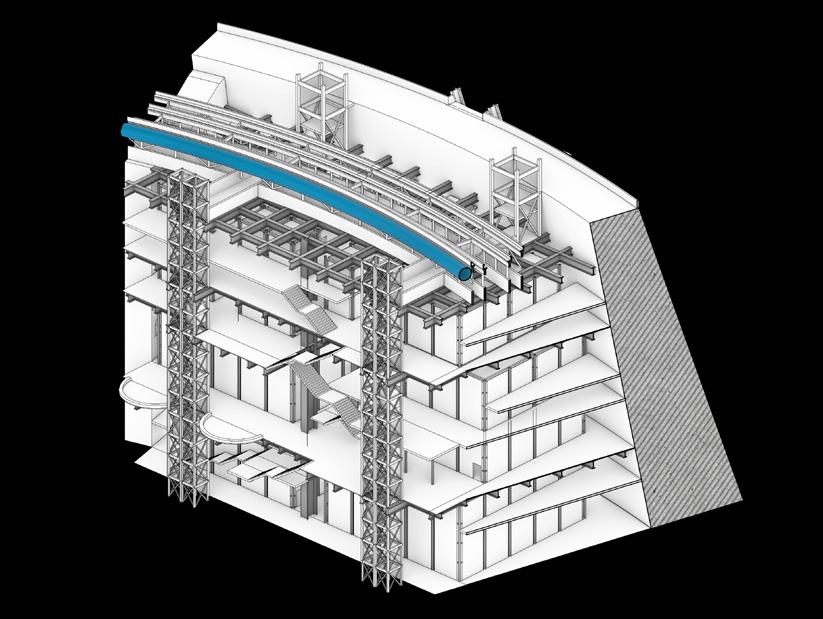
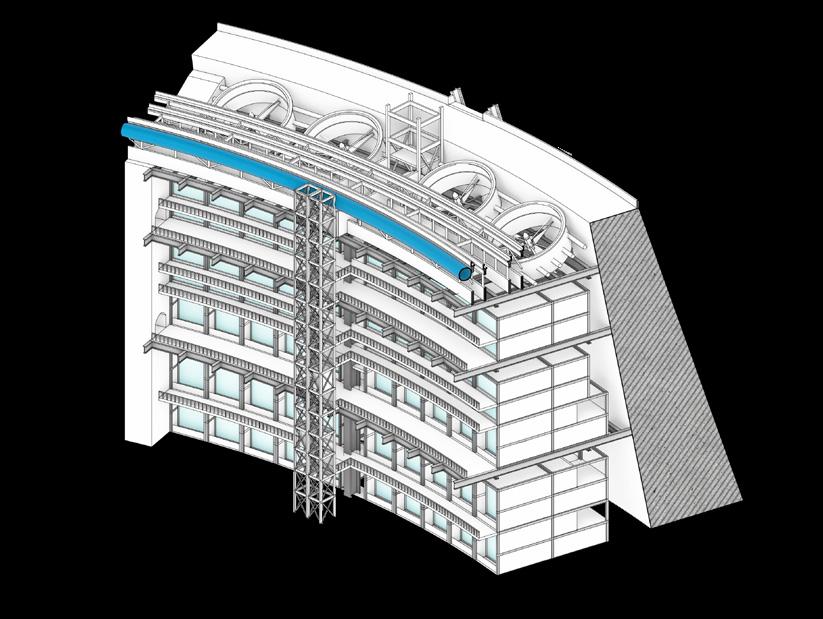
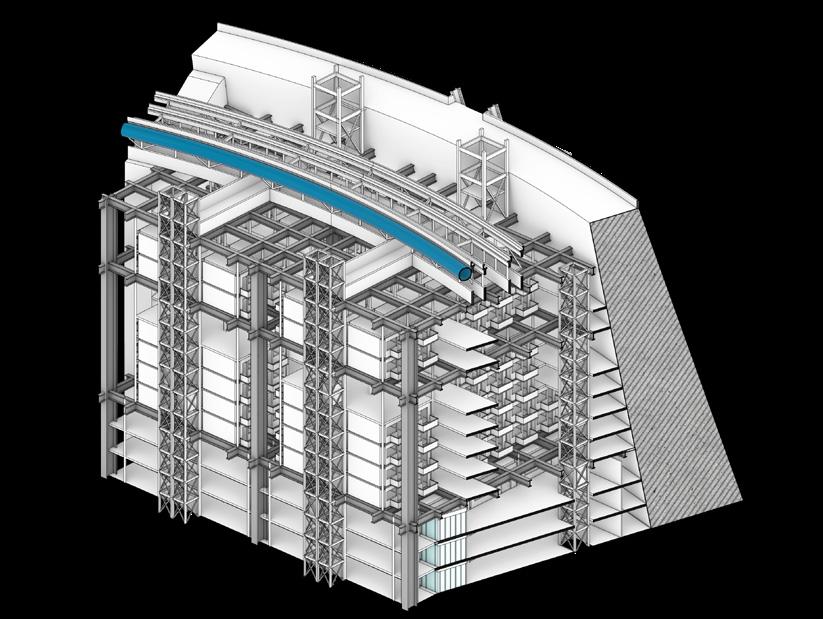

Sports & Exercise Module
This module includes courts like badmintion and basketball, swimming pool, gym, dance studio and other exercise spaces which serve the whole area.
Culture & Leisure Module
This module has several modular spaces in different scale that can hold culture or leisure functions like theatre, cinema, exihibition hall, KTV, lecture hall and so on.
Health Module
This module includes clinics, inpatient departments, operation rooms and other basic medical equipment rooms, which can meets the needs of people living in this area.
Education Module
This module contains the function of a school, which include classrooms, labortaries, offices, meeting rooms and gyms, to serve the children in this area.
Perspective View
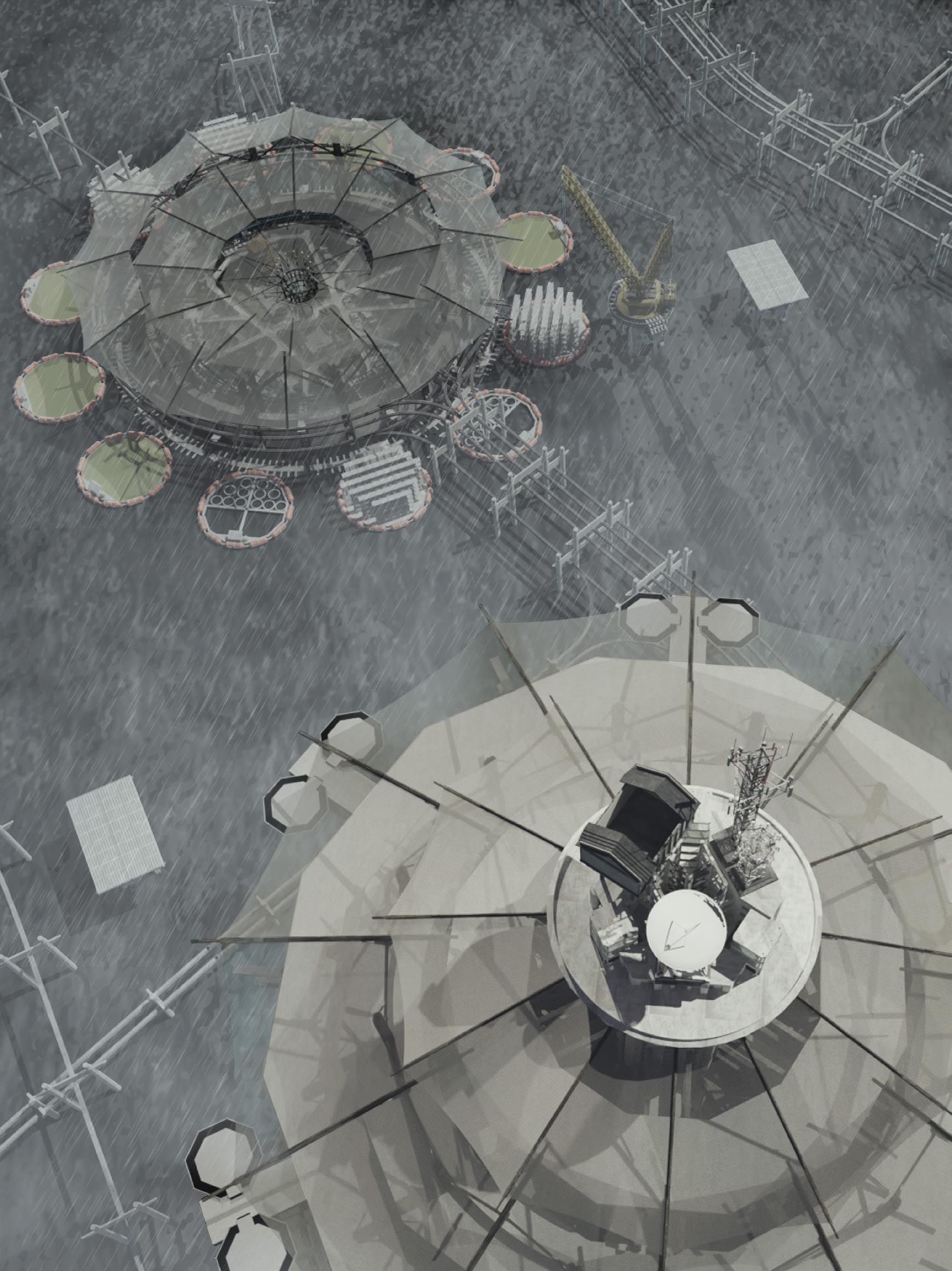 This top rendering shows how different living areas are connected by the sky rail transit system, Floating farmlands are placed around each living area and different kind of walking mechine helping with construction and transportation works in the city.
This top rendering shows how different living areas are connected by the sky rail transit system, Floating farmlands are placed around each living area and different kind of walking mechine helping with construction and transportation works in the city.
Perpsective View
This rendering shows the Huanghelou dam living area from human perspective. From this image we can feel the strong contrast between old architectural heritage and the new built mechanical structure. People's life style has changed while the memory of Wuhan remains.

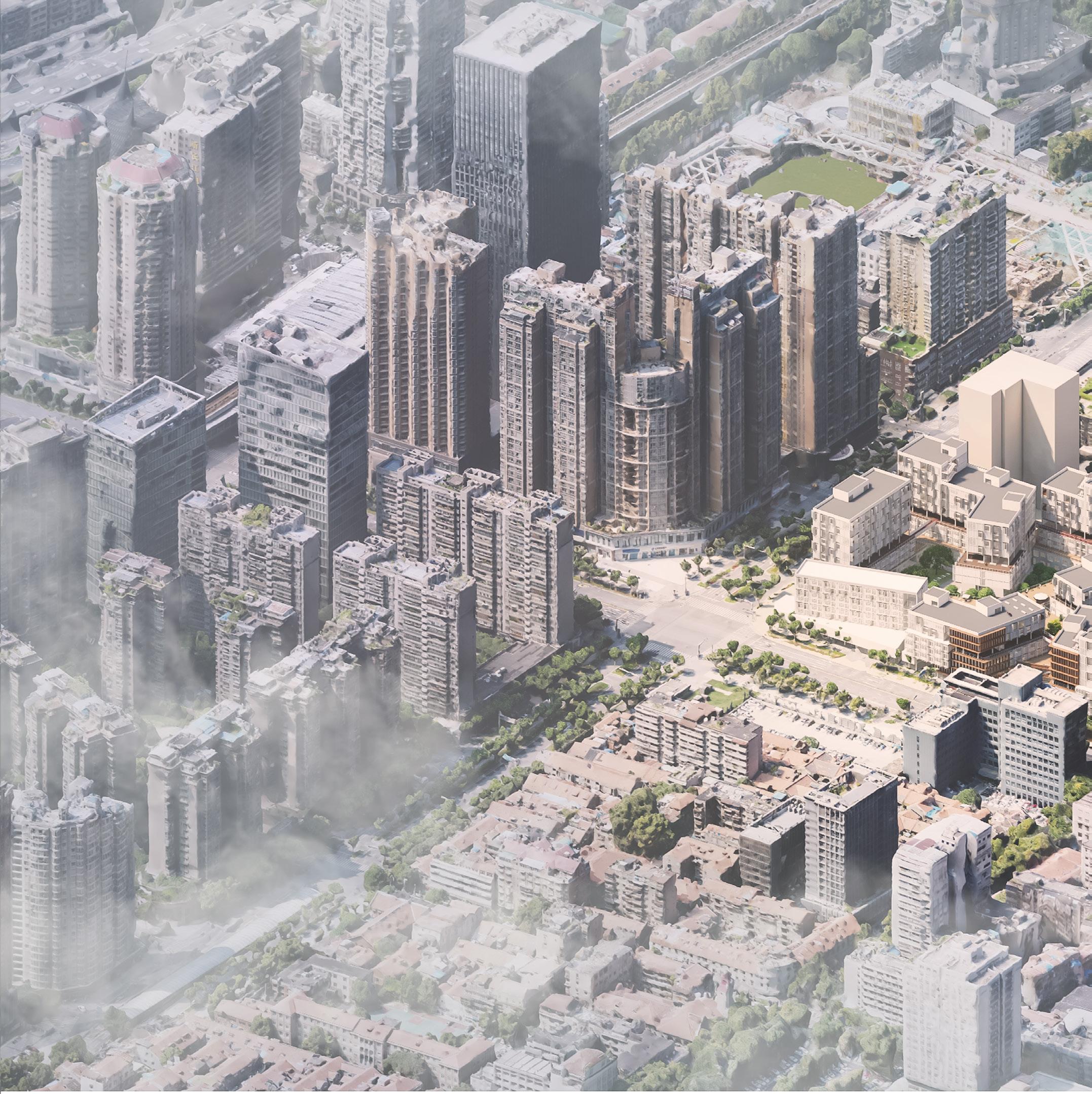
STREET LIFE
Design of Rental Apartments in New Urban Agglomerations in the Age of Population Mobility
Group Work Gourp members: Schueng Zhang, Zhi Shuai, Mingyi Chen
Site: Wuhan, China Time: Sep 2021
Chinese economic development is going through the era of urban agglomeration linkage and metropolitan area radiation. At this important stage, population has become a strategic resource that must be contested. In this project, we designed a living complex in downtown Wuhan, which would provides residents with cost-effective long-term rental housing and activity spaces according to their age in a vertical direction through a modular approach. In the design process, as the group leader, I mainly take charge of concept finding, massing generation, site plan design, digital modeling, structure and envelop design.
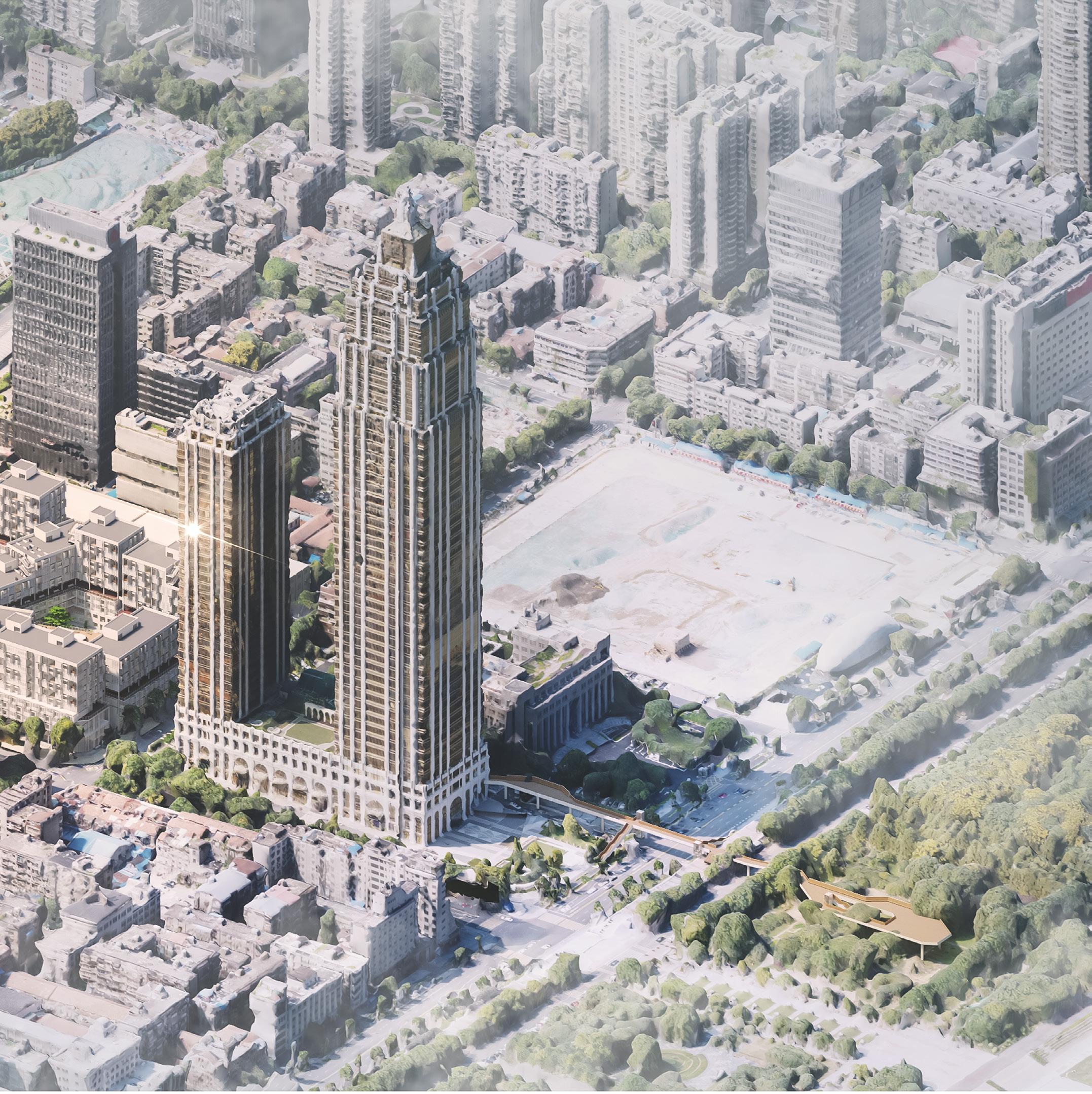
MANIFESTOS OF DESIGN


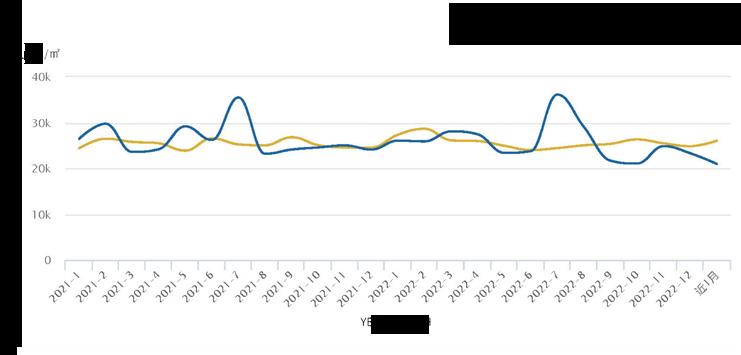
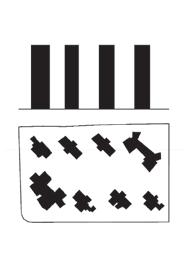
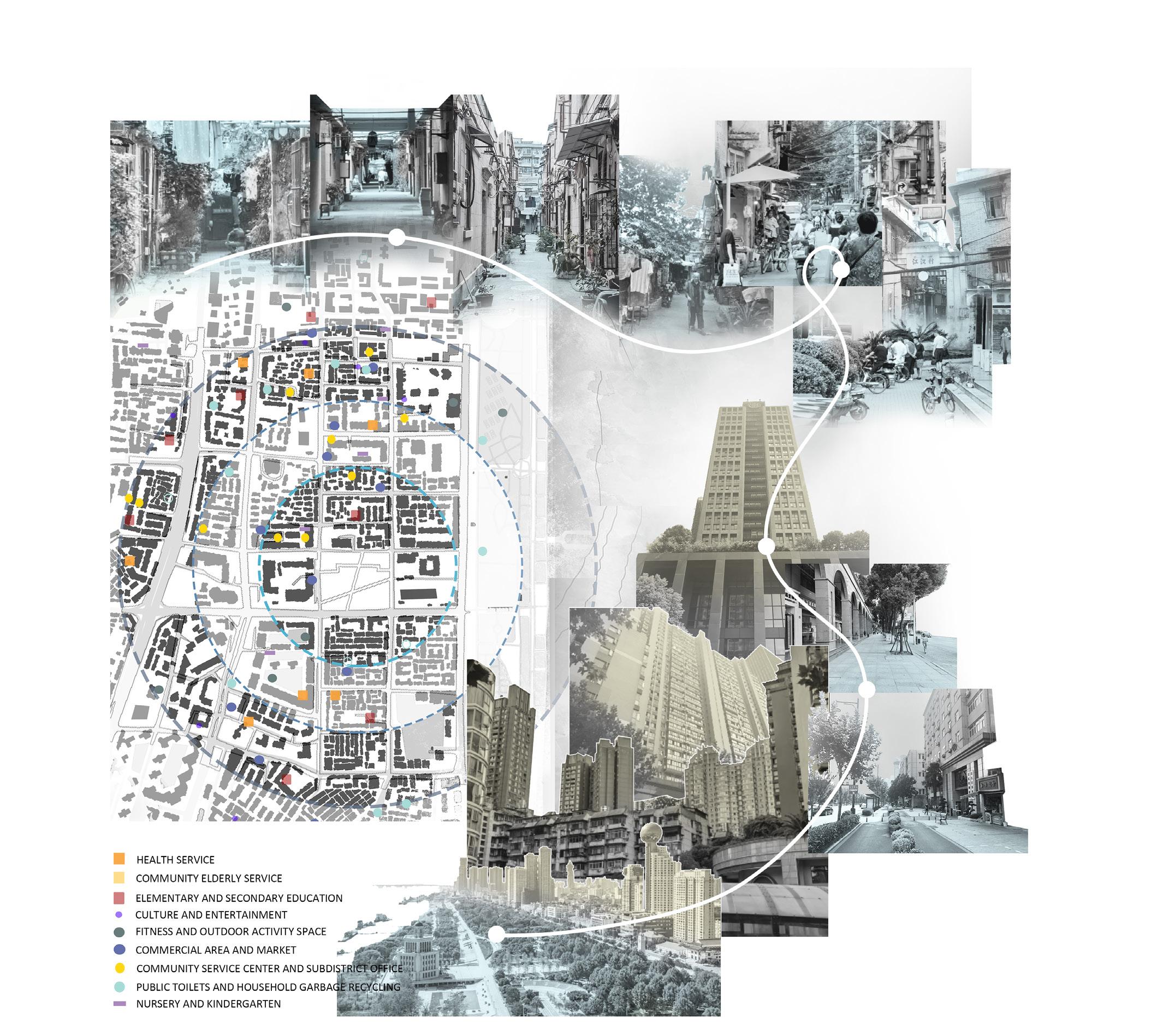
Street life - Suitable scale for pedestrian, maximize the area of streetfacing building, place for entertainment or rest along the street, market inside the block.
Affordable and comfortable - Minimum the space for each room to make them affordable while keep it comfortable, make groups and subgroups to share some public space and facilities.
Multiple public space - There will be public space in different size and quality in this block, like stadium, greenbelt, street, undefined space.

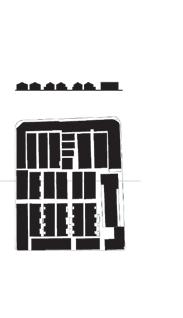
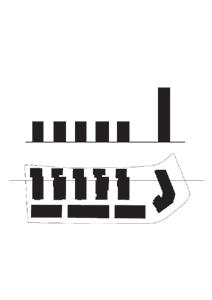
Li
Late
century
Price trends of recidences in Hankou Distribution of recidence areas. Distribution of prices Contemporary
SITE IN HANKOU AREA, WUHAN
fen Plot ratio: 1.41
20th
community
Plot ratio: 4.0
Community Plot ratio: 4.2
STEP 1
Making two storey basic block for public space follows the shape of the site.
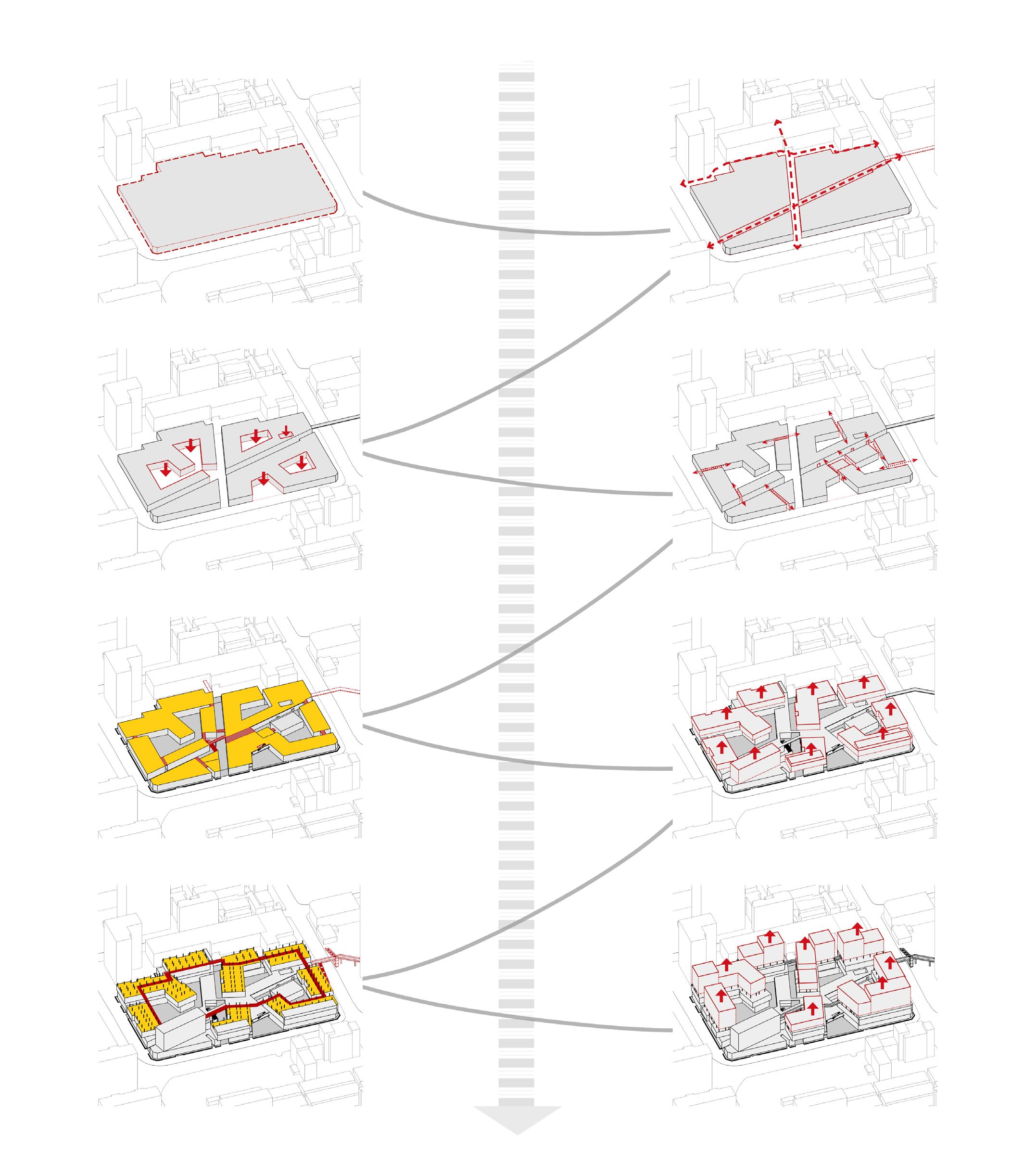
STEP 2
Adding three main street through the site. One of them connect the main street below and the warehouse. we make a hole in the old building to connect the street on the north. Another two are in the same direction, one is the gap between the existing buildings and the new community, another one connect the intersection and footbridge to the river beach.
STEP 3
After breaking the site into four blocks, we make seveal courtyard in different parts with specific spatial characteristics. Some of them are opened to the public, some of them are only serve the people living in this community and we put units for elderly people around thiese courtyard.
STEP 4
After adding the courtyard, we add several small alley connecting the main street with different courtyards. Their scale is the same as that of Lifen.
STEP 5
Making the first platform on the second floor by adding severl bridges connect different blocks. At this level, we want to guide the crowd to gather in the center of this area.
STEP 6
Adding family units and the apartment block
STEP 7
Connecting different blocks on forth floor with a jogging path, which provid people a space to do some exercise. other space on this floor can be used for other types of exercise like table tennis or leisure activities. In the future, more residential units can be added in this floor if needed due to the advantage of prefabircation.
STEP 8
Adding youth blocks on the top. Considering the sunshine conditions of the elderly housing on the ground floor, we design different units into different heights and take good use of the roof as drying and planting space.
MASSING GENERATION
STREET LIFE IN 21TH CENTURY
We hope to provide a affordable and comfortable place for people in the city who are constantly struggling for their livelihood and dreams, or whose old houses are too shabby to live in. We want them to feel the warmth and happiness in the street life, and use these accommodations as stepping stone to lead a more wonderful life.
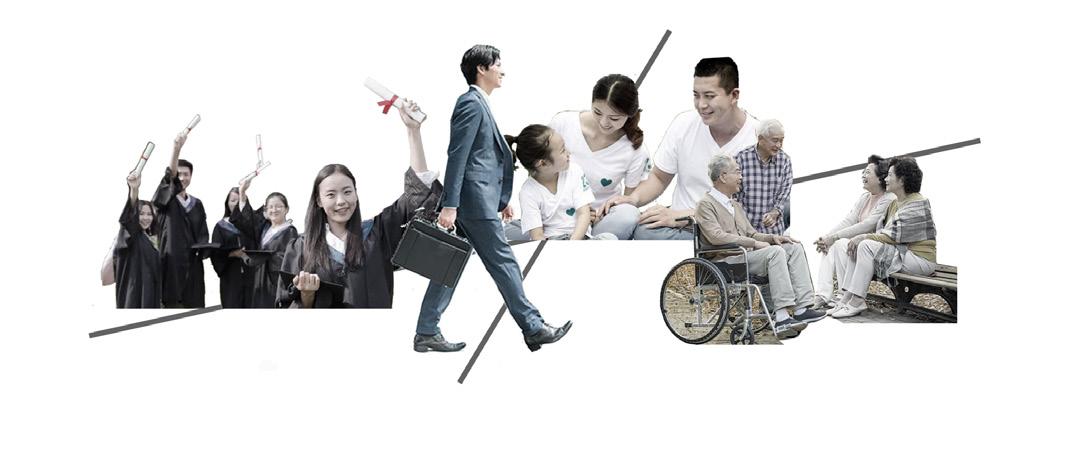
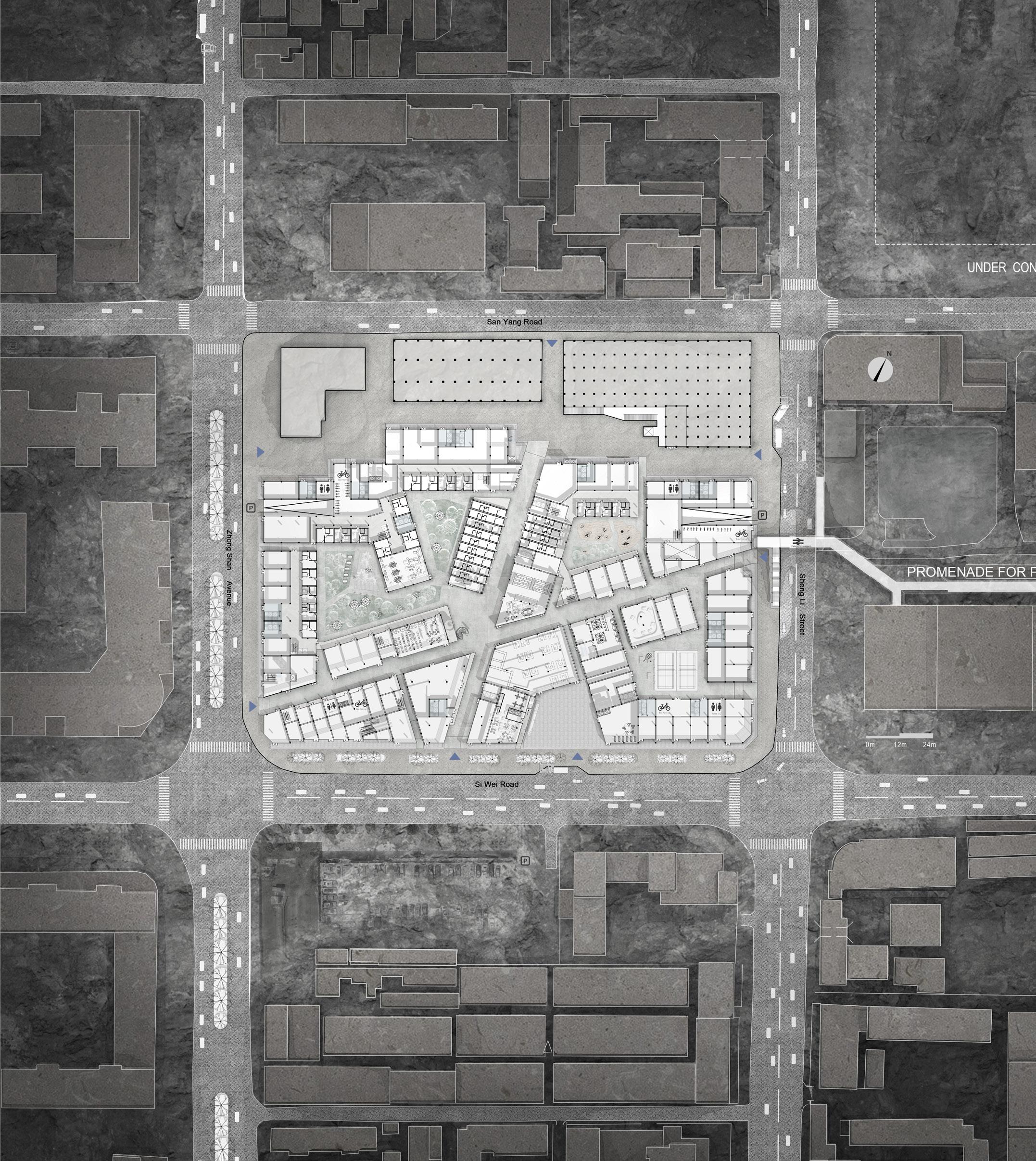
SITE PLAN -- NEW TYPE OF STREET LIFE
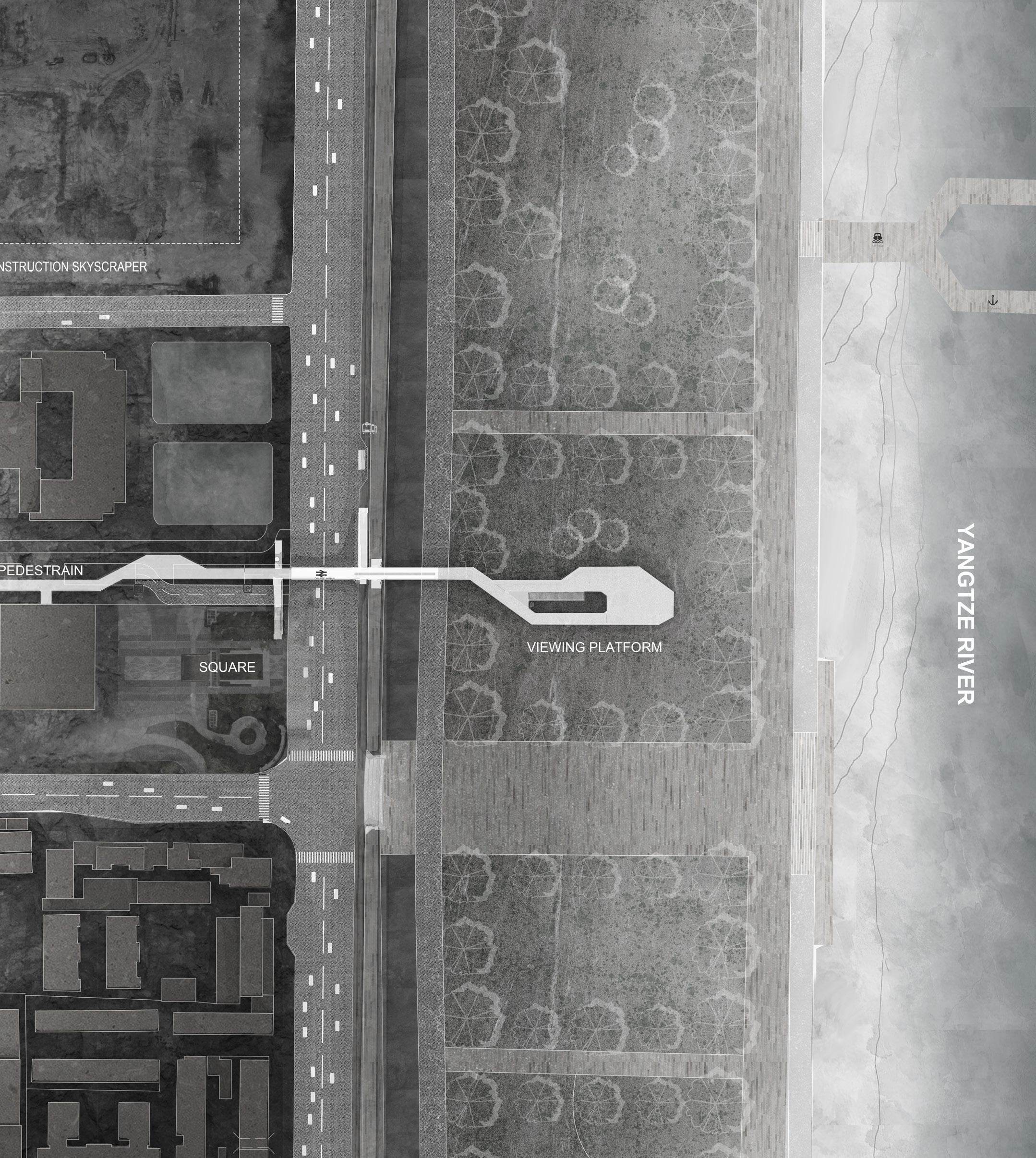
we would like to build more horizontal connectinonbetween people rather than vertical. we learn from the scale and lifestlye in Lifen and the old street, also the improvement of modern buildings like better sunlight, facilities, structure and thermal environment. Trying to find a new type of street life.
In the general plan, we took into account the location of the bus station and subway station near our site and the important attraction of the river beach green belt. So we set up a leisure square open to the public, and determined the connection position of the pedestrian bridge. This safe and convenient pedestrian bridge replaces the driveway with many underground garage entrances below it.
At the same time, the two short cuts passing through our site open up the north and south and east and west, so that people who rent in this community can easily commute and enjoy the museum, parking lot and the green space of the river beach.
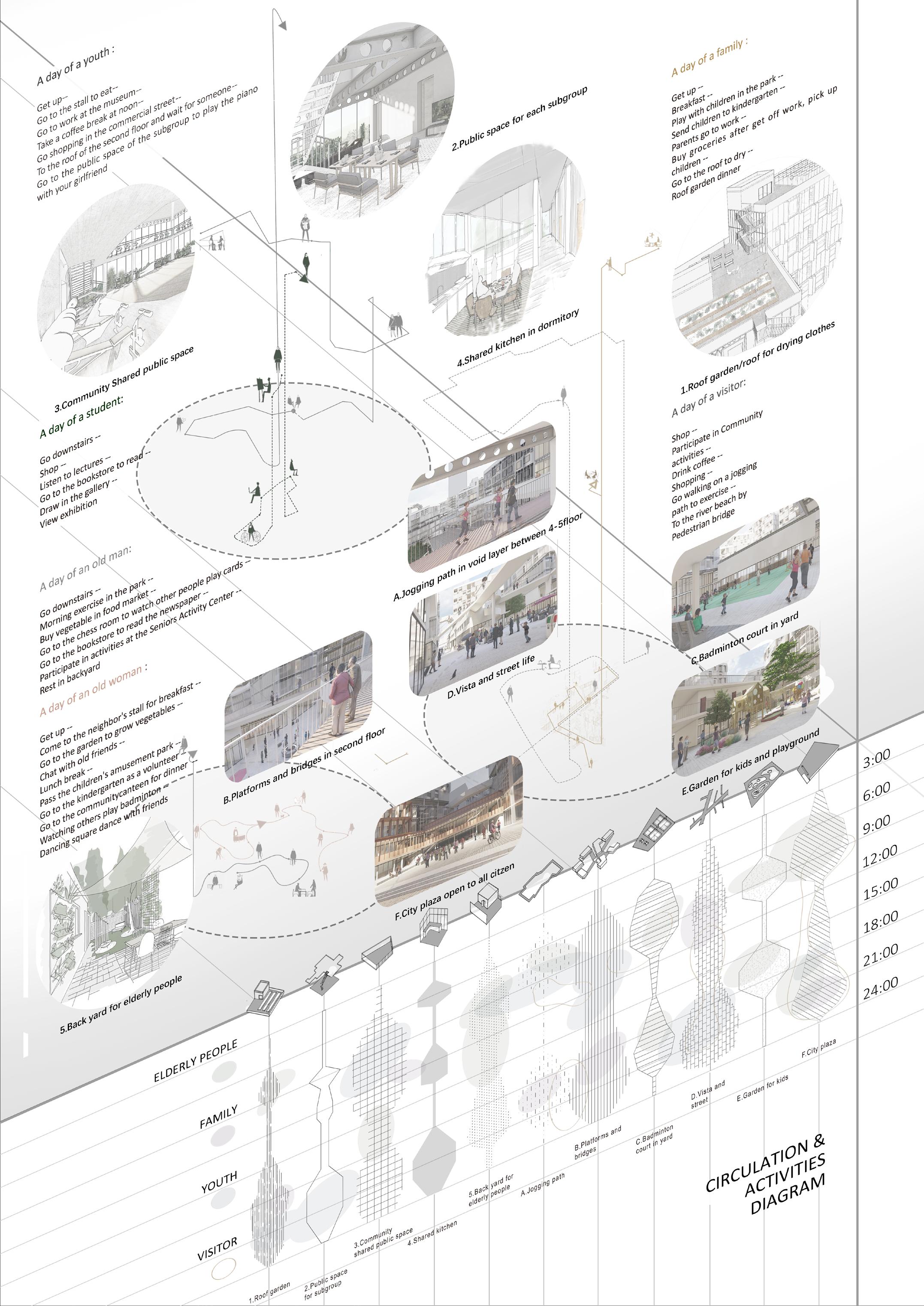
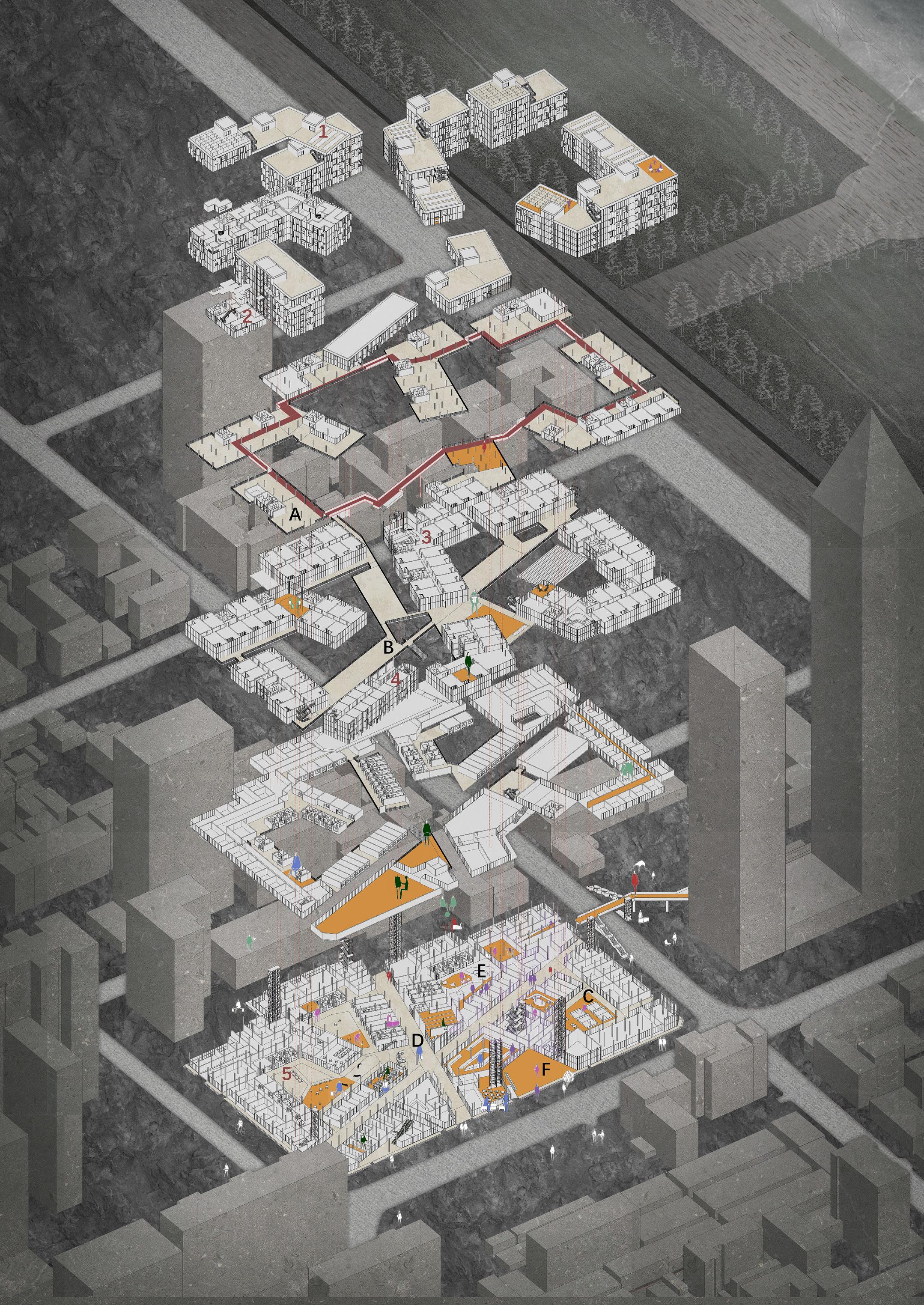
AXONOMETRIC EXPLODSION DRAWING
PREFABRICATION & MODULAR CONSTRUCTION

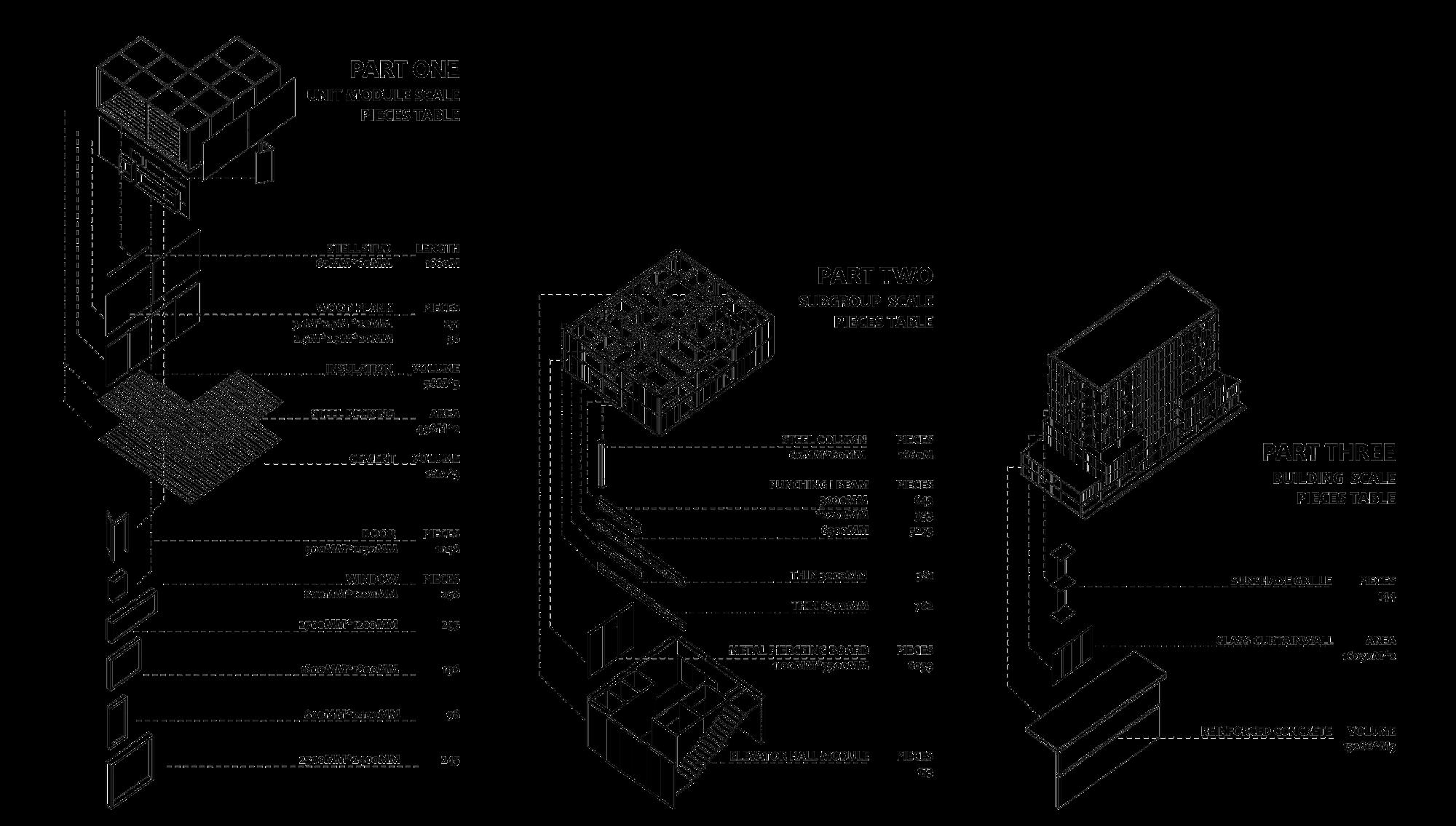
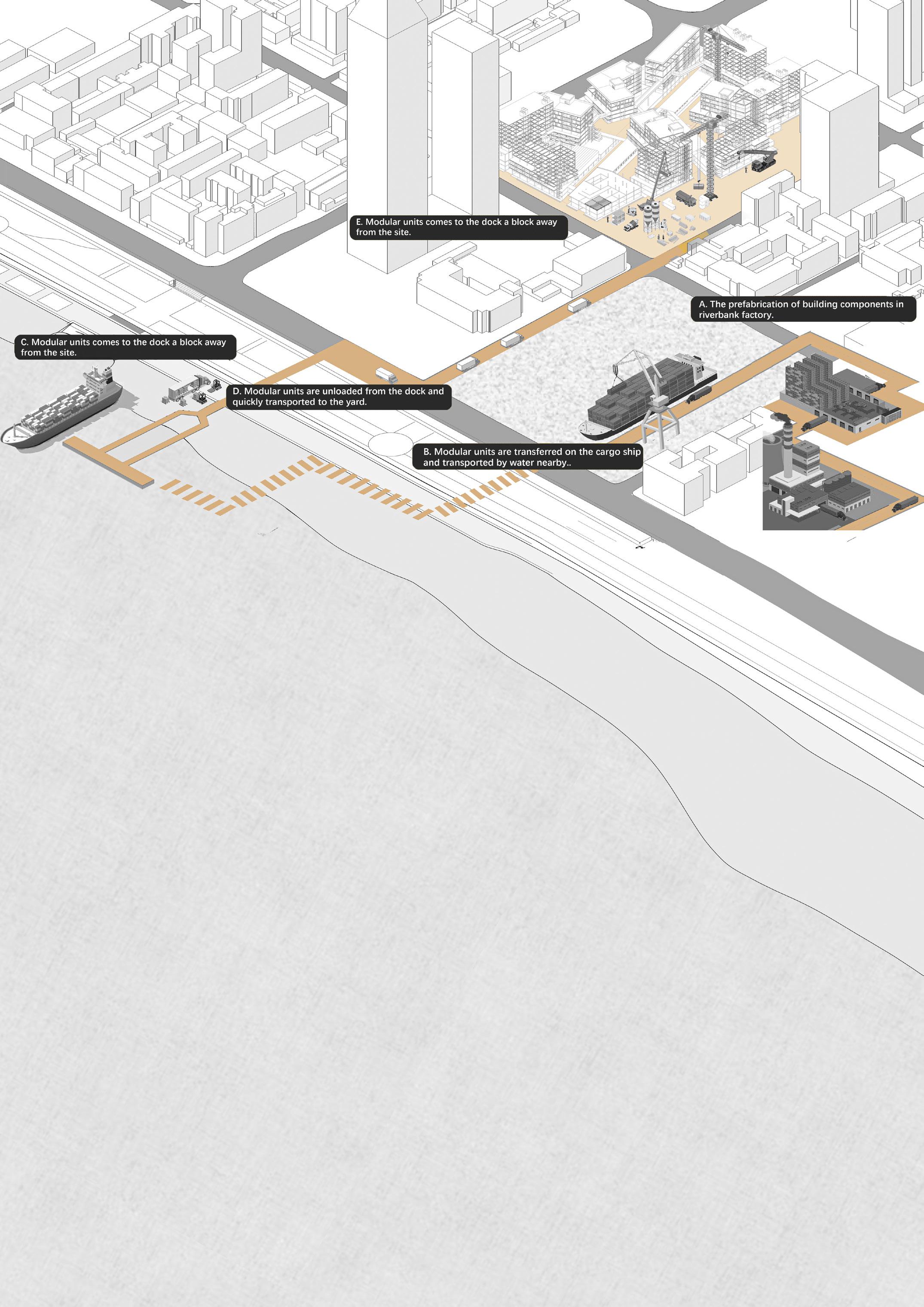 STEP 1
Putting circulation core and the floor of public space in the steel frame.
STEP 2 Putting pre-fabricatied living units inside the steel frame.
STEP 3 Adding cork panels as insulation layers.
STEP 4 Adding white board on the facade.
STEP 5 Adding metal mesh panel outside as shadding.
STEP 1
Putting circulation core and the floor of public space in the steel frame.
STEP 2 Putting pre-fabricatied living units inside the steel frame.
STEP 3 Adding cork panels as insulation layers.
STEP 4 Adding white board on the facade.
STEP 5 Adding metal mesh panel outside as shadding.
1. BUILDING STRUCTURAL FRAME
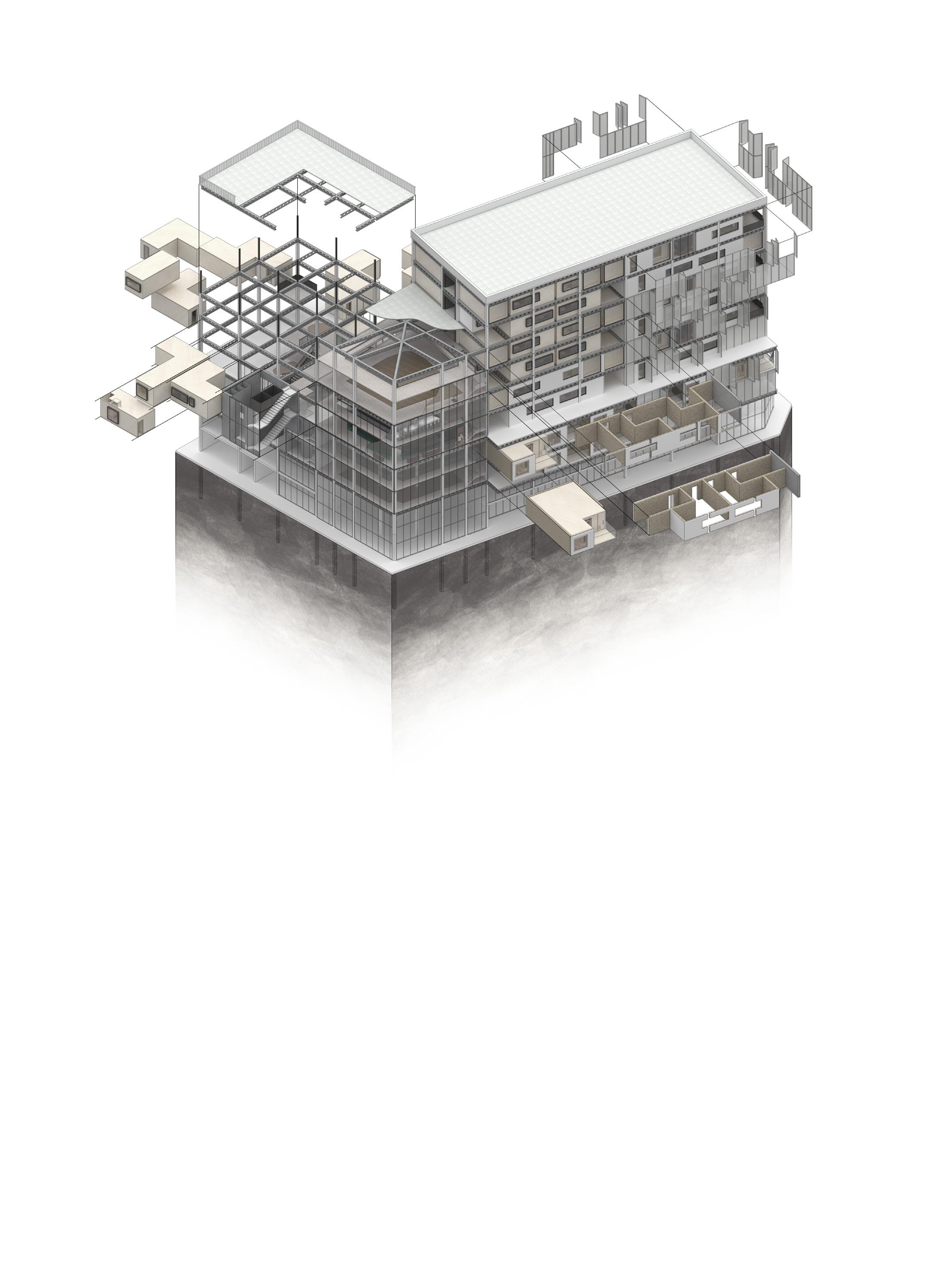
5. ADDING METAL MESH
2. ADDING UNITS & FLOOR
METAL FRAME
INSULATION LAYER
CEILING BOARD
INTERIOR FACADE BOARD
INSULATION LAYER
STRUCTURE PACKING OUTSIDE BOARD
CEMENT LAYER
INSULATION LAYER
CONCRETE LAYER
WAVE STEEL PLATE
METAL FRAME
3. ADDING INSULATION LAYERS
4. ADDING FACADE BOARDS
EXPLOSION DRAWING OF ONE BLOCK

WOOD FLOOR
The whole building excapt the commercial space in first two floor are pre-fabricated. We plan to build the steel frame in standard module first, and then transporting all living units to our site and hoisting them to the right space after they are produced all living units in the factory in Wuhan. Prefabrication give us great flexibility to change different types of units following the need of different age groups and adding and reducing the number of units at any times without bring bad effect to the whole sturcture system.
EXPLOSION DRAWING OF ONE UNIT
SUBGROUP OF YOUTH BLOCKS FLOOR TWO
DESIGN OF UNITS & SUBGROUPS
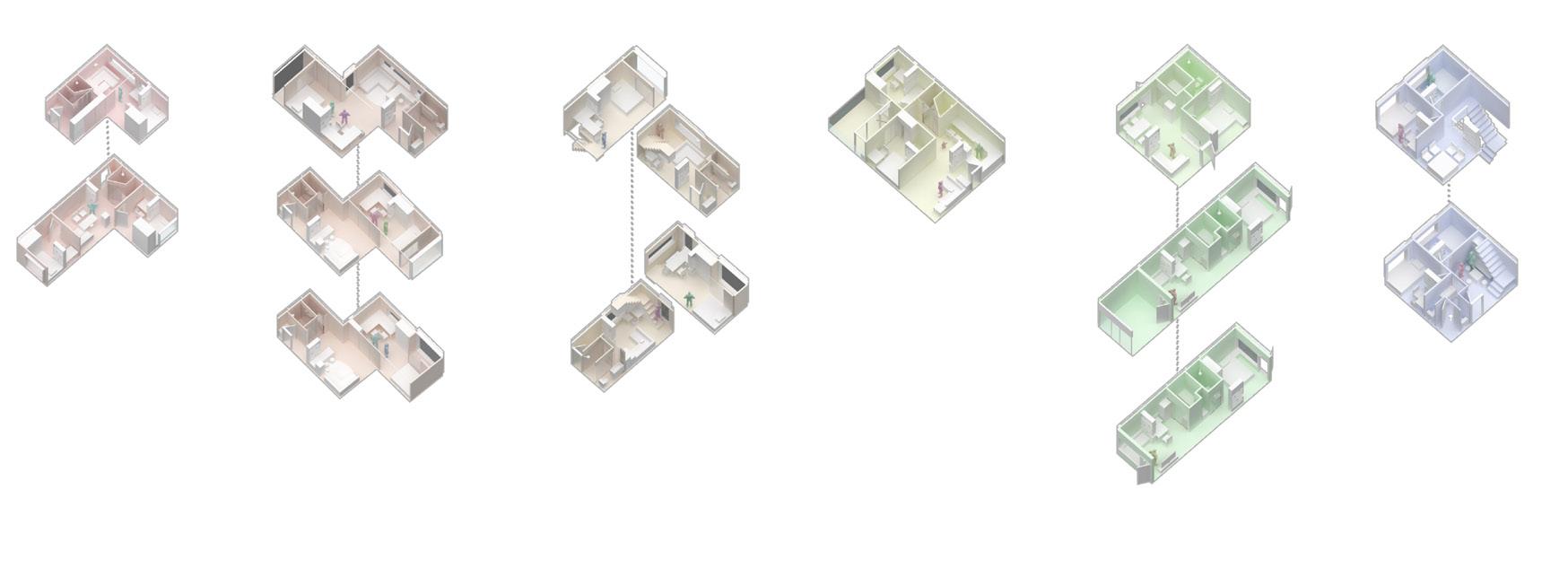
we make our programming according to our anylasis about how the need of renting houses differs by ages which help us to decide the housing types ratio. 4 classes of units are designed according to the programming for our different age level: Youth, Family, Elderly and Workers. We keep our intention which is to balance cost and quality during the design process. There are 13 types of units severed different people and several units will be organized as a subgroup with sharing spaces like living rooms, kitchens or courtyards.
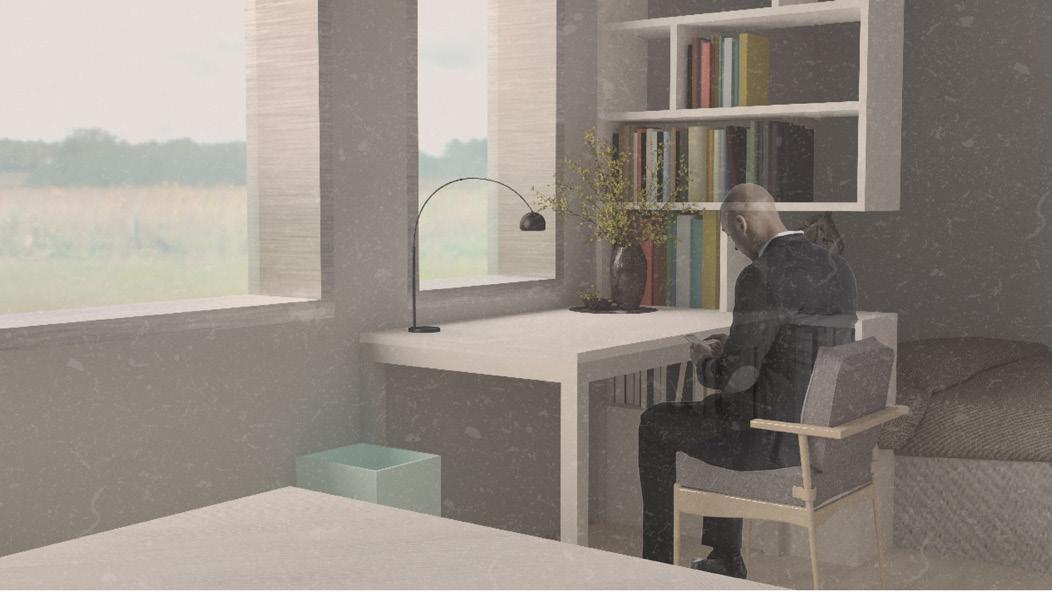
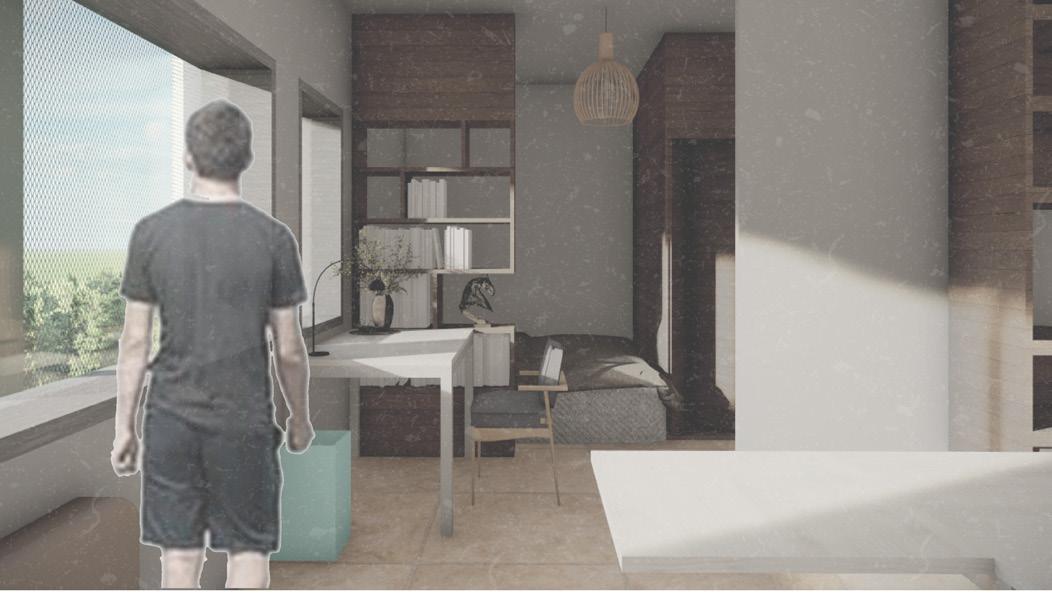
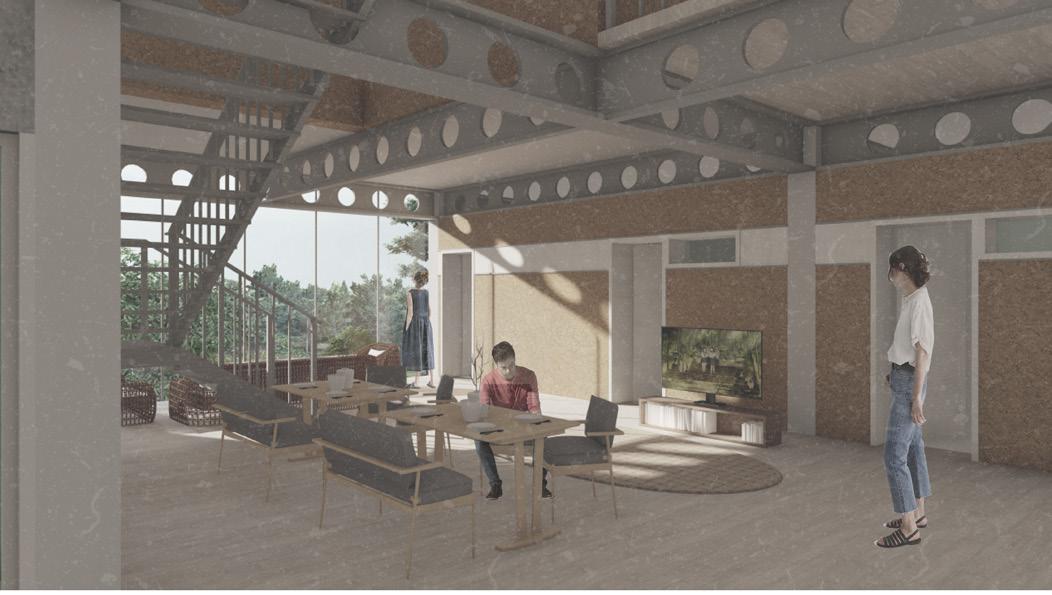
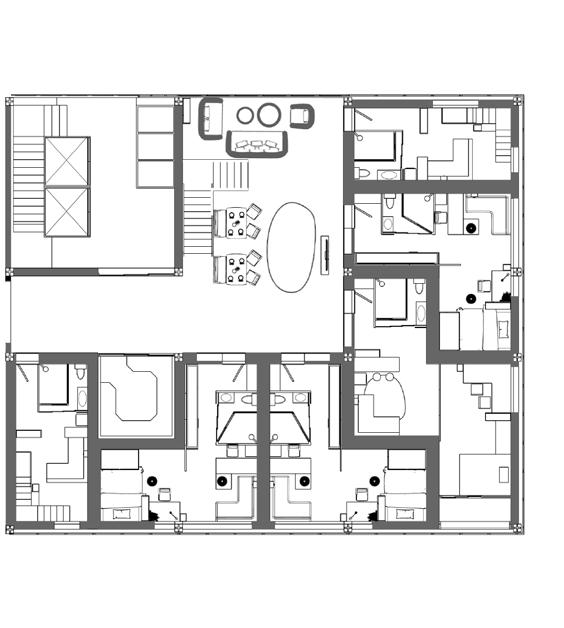
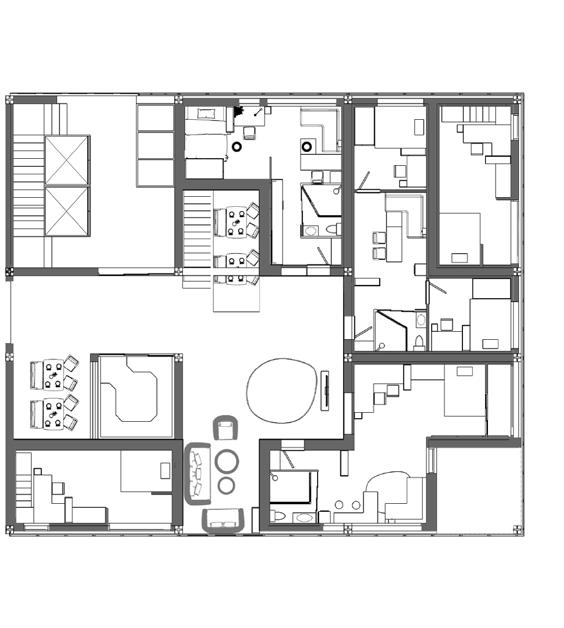
UNIT TYPE A-1/2 27m2 for single person 36m2 for roomates UNIT TYPE A-3 36m2 for couples UNIT TYPE A-4 (loft) 36m2 for couples or two people UNIT TYPE B 54m2 for couple with children UNIT TYPE D 30m2 for 4 people (the cheapest) UNIT TYPE C 30m2 for elderly people 36m2 for elderly people with small shop 27m2 for elderly people
SUBGROUP OF YOUTH BLOCKS FLOOR ONE PUBLIC SPACE IN A YOUTH SUBGOURP.
INTERIOR RENDERING OF A YOUTH UNIT.
Floor board
Water proof layer
Wave steel plate
I shape steel beam
Elevation board
Insulation layer
Outside board of unit
Structure packing & insulation layer
Interior facade board
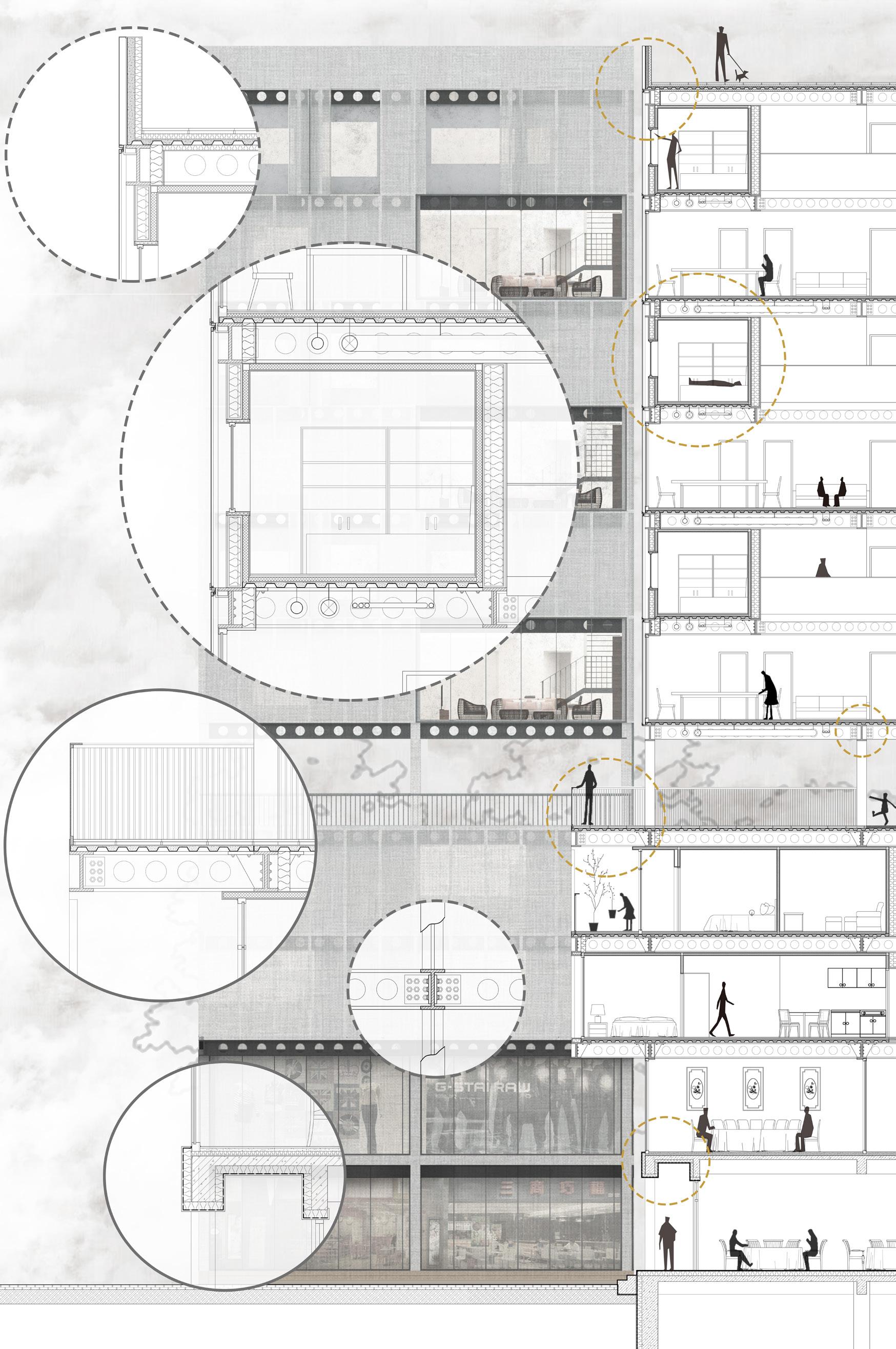
Wood floor or tile
Cement plaster
Insulation layer
Wave steel plate
I shape steel beam with hole
Pipes for water and electric wire
Concrete overlap layer
Steel column
Steel beam
Connection panel
Elevation board
Insulation layer
Separation board
Reinforce concrete beam
DETAIL SECTION 0 500 1000 1500 2000 0 500 1000 1500 2000
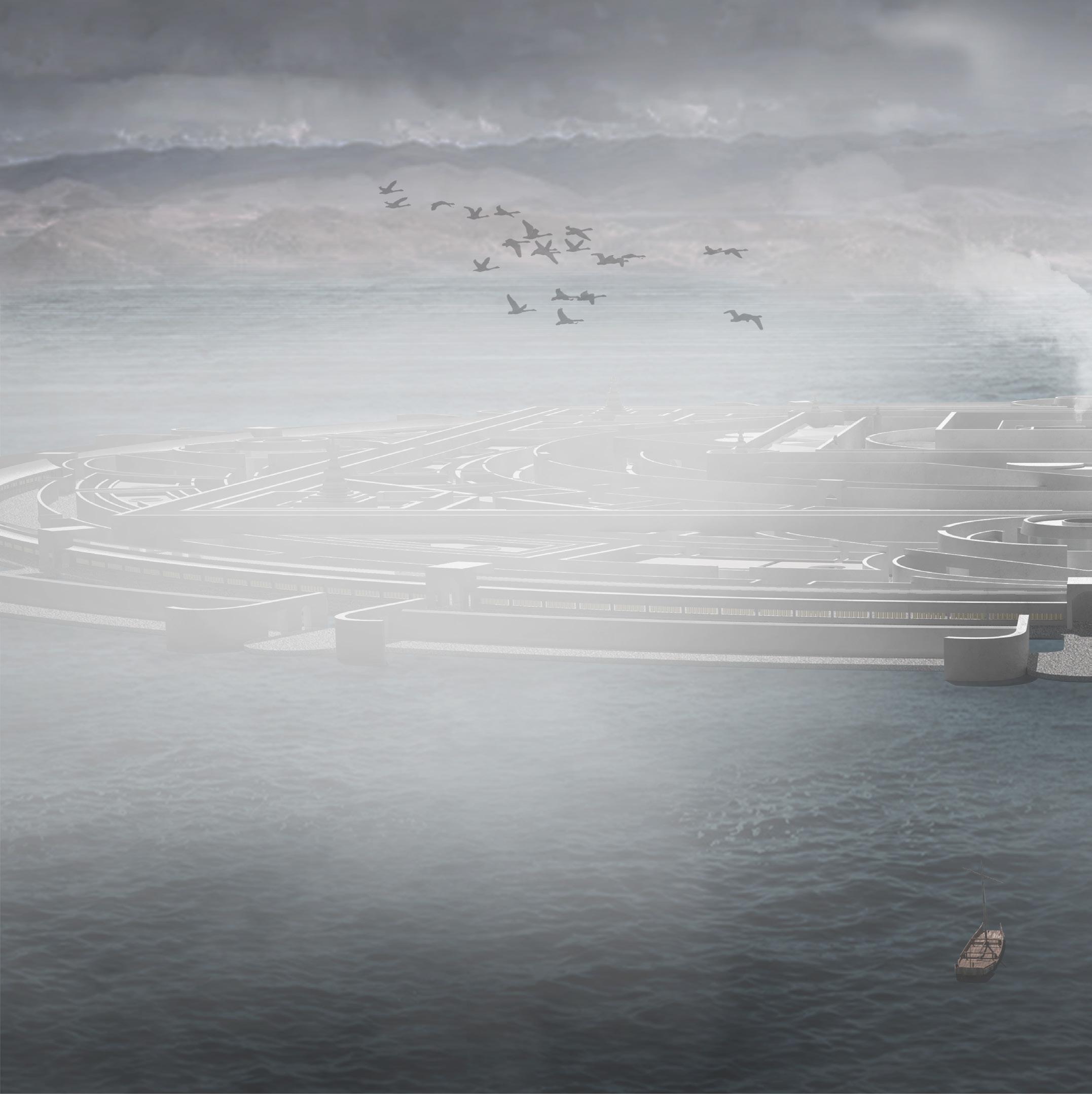
ONE LAST DEDICATION
Sky Burial Center on Yamdrok Lake
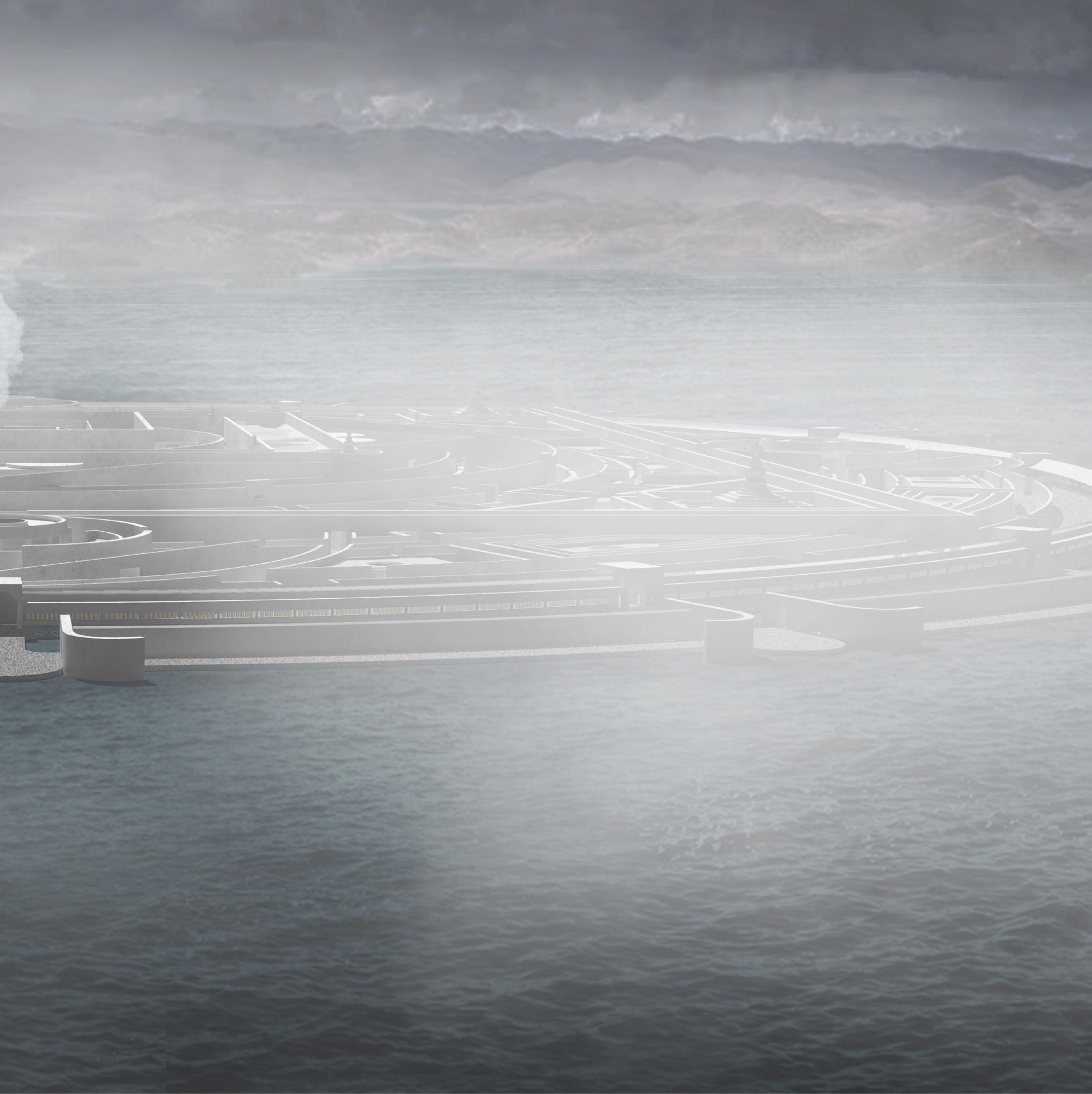
Individual Work Site: Tibet, China Time: Sep 2022
Sky burial in Tibet is a funeral practice in which a human corpse is placed on a mountaintop to decompose while exposed to be eaten by vulture. This project focus on exploring a design possbility of sky burial platform with religious and public space around it. The whole complex combines post-modernism and the spiritual core of Buddhism. I hope this project can not only provide a proper space for the rite, but also helping the public to understand sky burial.
The site I chose was on Yamdrok Lake, which is known as the three holy lakes in Tibet along with Namtso and Manasarovar Lake. There is a holy mountain (Noijin Kangsang) to the west and a Buddhist temple (Sandin Temple) on the south, which means this is an appropriate site for sky burial.
Sky burial is a funeral practice in which a human corpse is placed on a mountaintop to decompose while exposed to the elements or to be eaten by scavenging animals, especially carrion birds. It is a specific type of the general practice of excarnation. It is practiced in the Chinese provinces and autonomous regions of Tibet, Qinghai, Sichuan, and Inner Mongolia. Sky burial has its roots in Benzoic and animist theory, which reflects the Tibetan people's faith in the sky and the sun, the pursuit of happiness in the afterlife and the world view of equality of all beings.
Some people think this kind of burial is too bloody and cruel, but in fact, I think this is a kind of misunderstanding. Sky burial reflects the Tibetan people's most simple feelings towards nature. Due to the fact that the Tibetan Plateau region has a harsh climate, the Tibetan people are very grateful to nature for giving them food while they are alive, so they return their favor by dedicateing their bodies to the creatures of nature when they die.
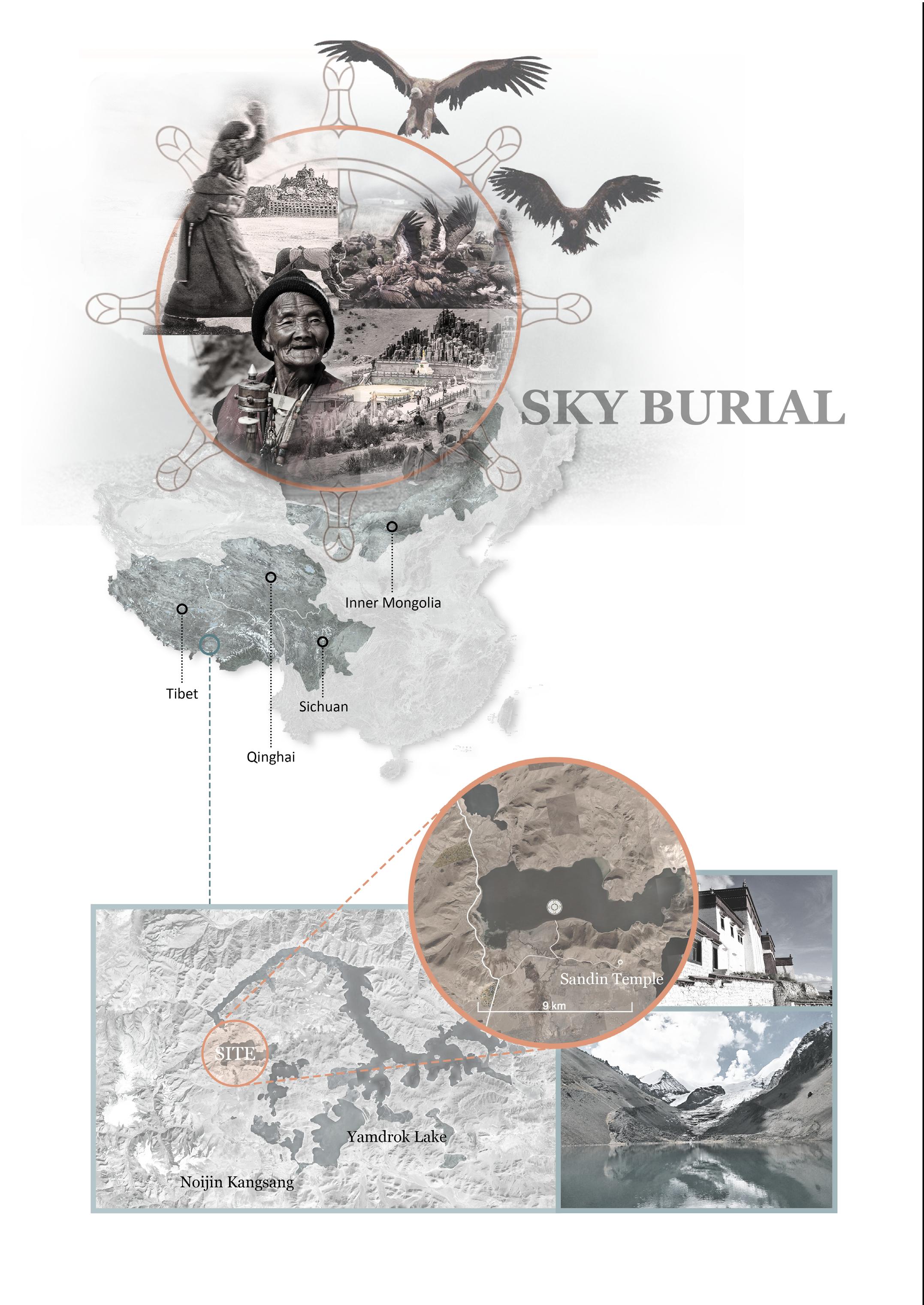
MANDALA
A mandala is a geometric configuration of symbols. In various spiritual traditions, mandalas may be employed for focusing attention of practitioners and adepts, as a spiritual guidance tool, for establishing a sacred space and as an aid to meditation and trance induction. In Buddhism, it is used as a map representing deities, or especially in the case of Shinto, paradises, kami or actual shrines. A mandala generally represents the spiritual journey, starting from outside to the core, through layers.
The spiritual meaning and typology of mandala give me an inspiration of the organization of the sky burial platform and other minor spaces - a centripetal space surrounded by layers, which can improve the sanctity of the core

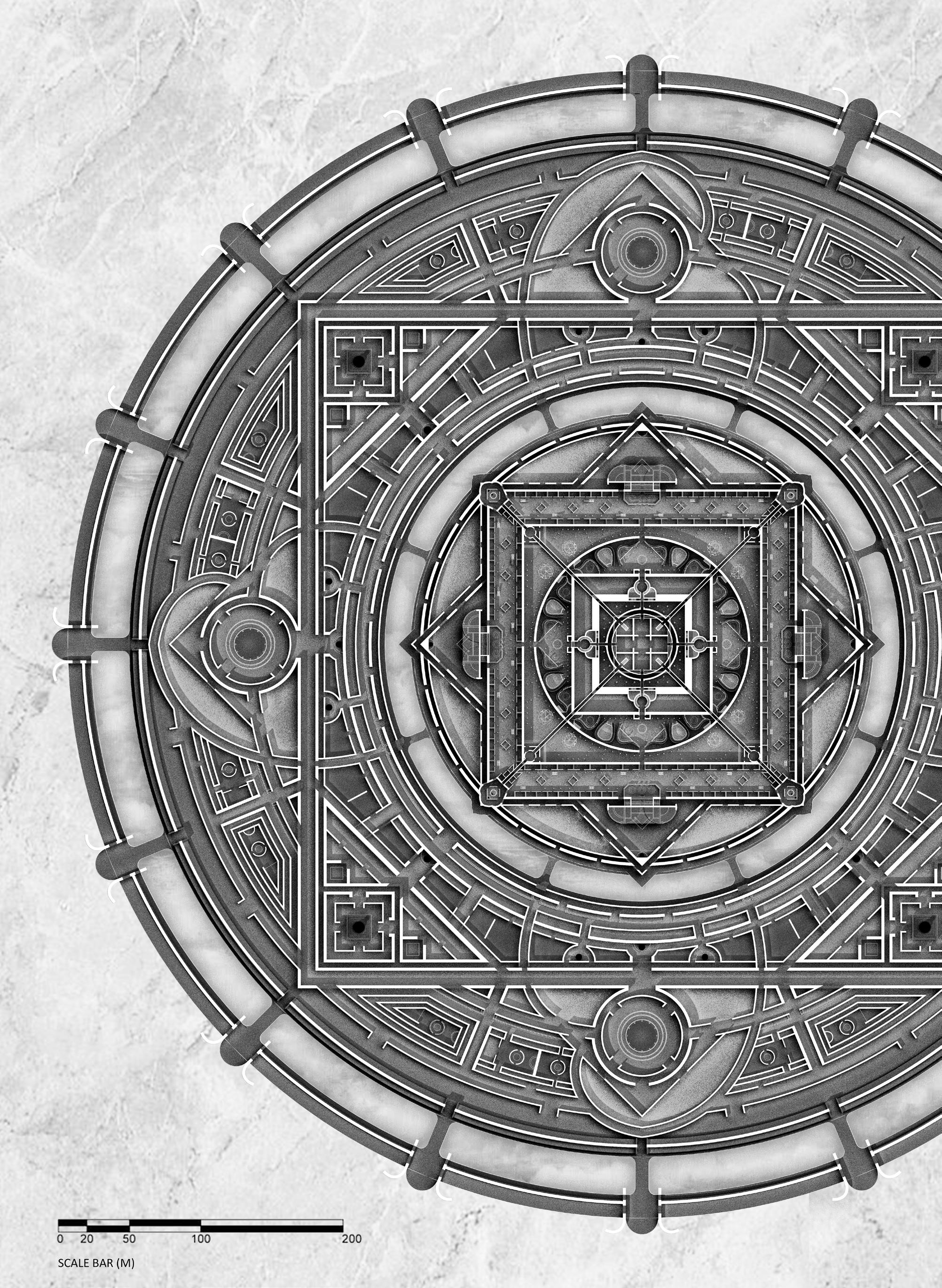
4 5 6 7 8 9 10 13 12 12
FIRST FLOOR PLAN
GROUND FLOOR PLAN
The whole plan has a strong centrality, from the outer layer to inner layer space gradually changing from chaos to order. Ths sky burial platform located at the centre which is the most sacred space. The middle layers carries the functions of a buddhist temple. The functions of outer layer are more secular, mainly serving tourists. Different layers are separated by water and channel for the turning scripture.

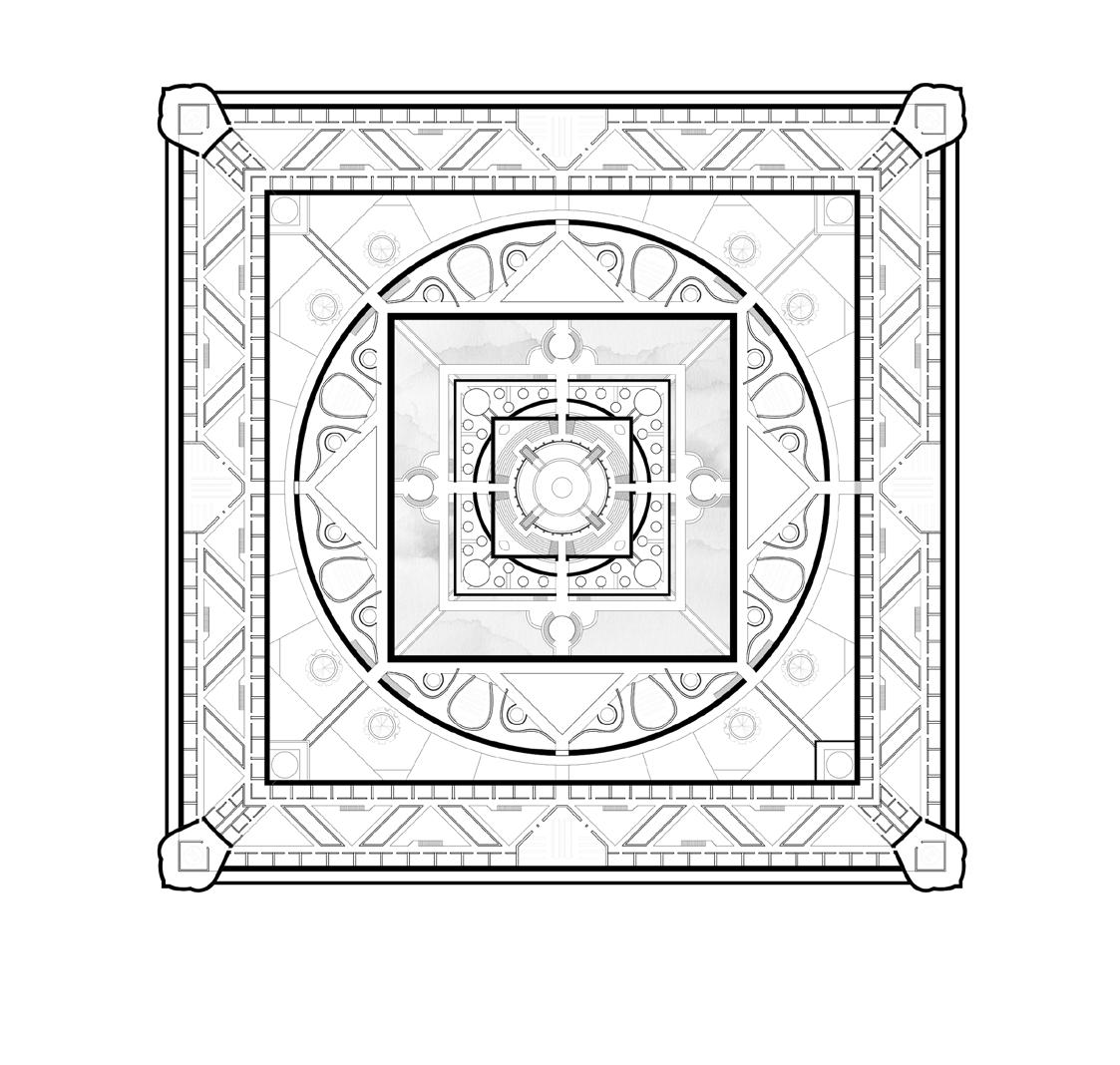
1 2 3 5 6 7
1. Sky burial platform
2. Audiences seating area
3. Chanting area
4. Preparation room for sky burial
5. Dratsang (School of monks)
6. Monks debiting space
7. Monks living area
8. Worship area
9. Starting point of funeral
10. Mortuary
11. Tearoom
12. Turning scripture channel
13. Lingka (garden) for monks
14. Lingka (garden) for the public
11 15 12 14
15. barge berth
 1.After retirement, tibetans will spend their time on Buddha worship which is to pray to the Buddha and repent of the krama one has created.
3.On the day of funeral, relatives will carry the body to the sky burial platfrom while the audience will come the other way.
5.When the sky burial take place, vultures will eat the dead's body after the master cut up it.
4.Monks take charge of this will recite sutras and burn aromatic plants to attract vultures.
6.After the rite, the family of death still need to recite sutras for 49 days for the reincarnation of soul.
2.They will find peace and happiness by devote themselves to buddha workship and get away from world's chaos.
1.After retirement, tibetans will spend their time on Buddha worship which is to pray to the Buddha and repent of the krama one has created.
3.On the day of funeral, relatives will carry the body to the sky burial platfrom while the audience will come the other way.
5.When the sky burial take place, vultures will eat the dead's body after the master cut up it.
4.Monks take charge of this will recite sutras and burn aromatic plants to attract vultures.
6.After the rite, the family of death still need to recite sutras for 49 days for the reincarnation of soul.
2.They will find peace and happiness by devote themselves to buddha workship and get away from world's chaos.
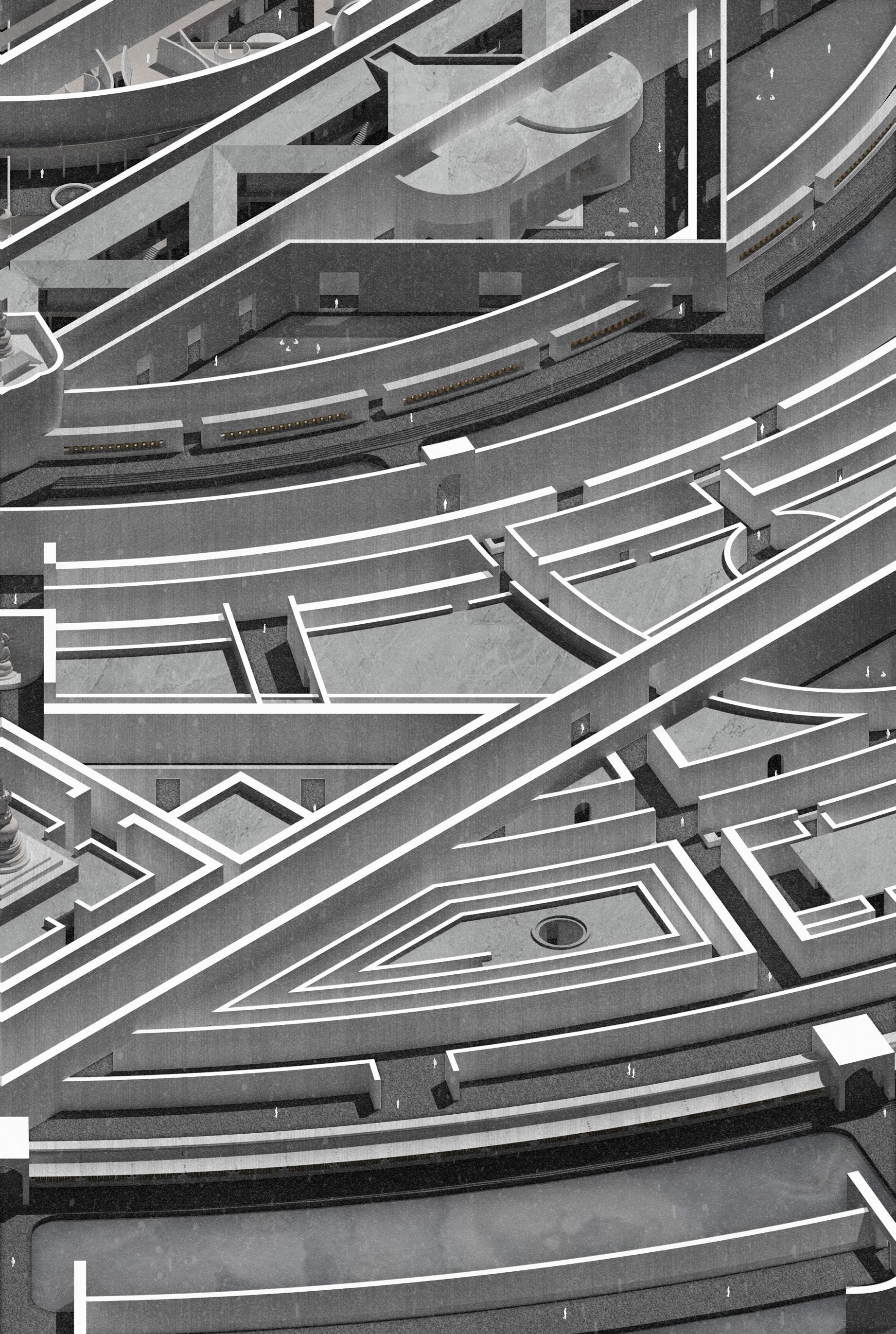




 The Revolution of 1911 Museum Zhang Zhidong & Wuhan Museum
Hubei Historical Museum Zhongshan Ship Museum Chinese Architecture Museum
The Revolution of 1911 Museum Zhang Zhidong & Wuhan Museum
Hubei Historical Museum Zhongshan Ship Museum Chinese Architecture Museum



























































 Living sewage Treatment system
Tap water purification system
Sky rail transit system
Modular built public&tansport space
Folding canopy on the top to shade roof terrace
Roof terrace for exercise, commercial and leisure activities.
Living cricle type 1
Living cricle type 2
Living cricle type 3
Living platform type 1
Vertical building transport system
Living sewage Treatment system
Tap water purification system
Sky rail transit system
Modular built public&tansport space
Folding canopy on the top to shade roof terrace
Roof terrace for exercise, commercial and leisure activities.
Living cricle type 1
Living cricle type 2
Living cricle type 3
Living platform type 1
Vertical building transport system



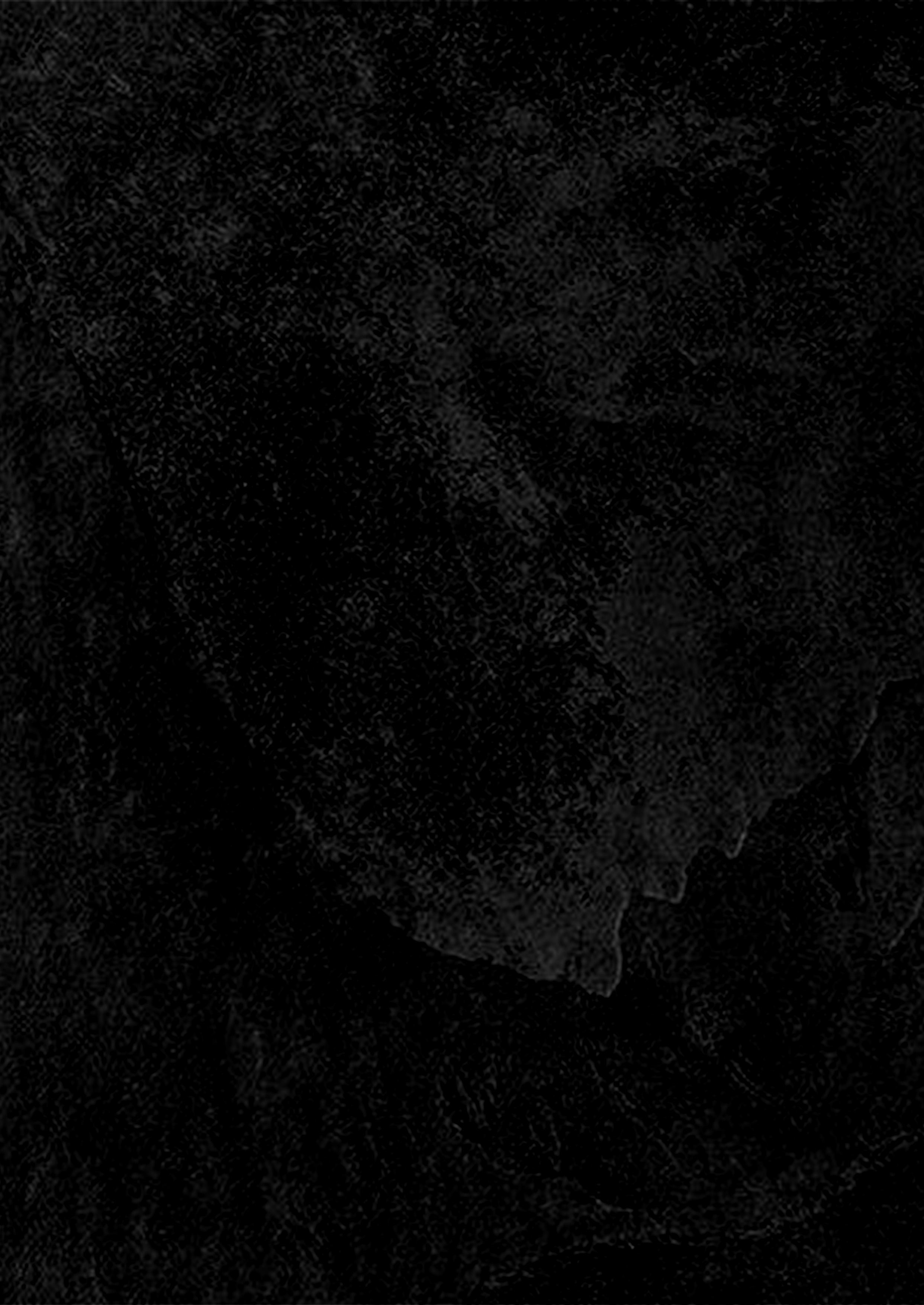
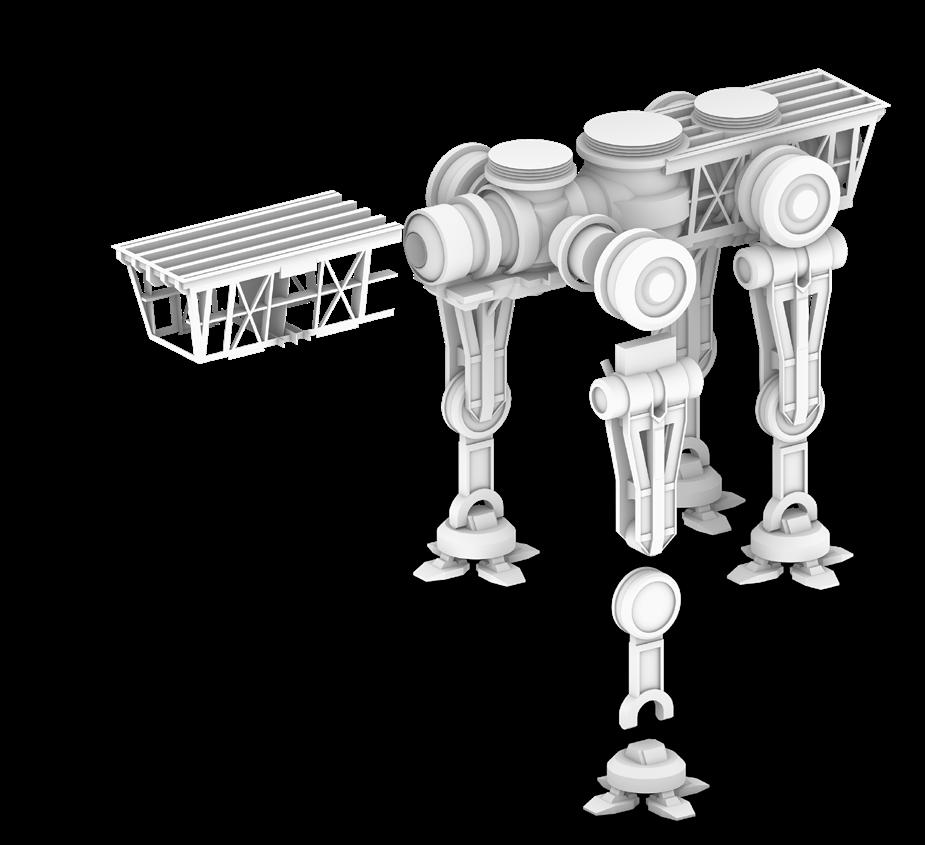
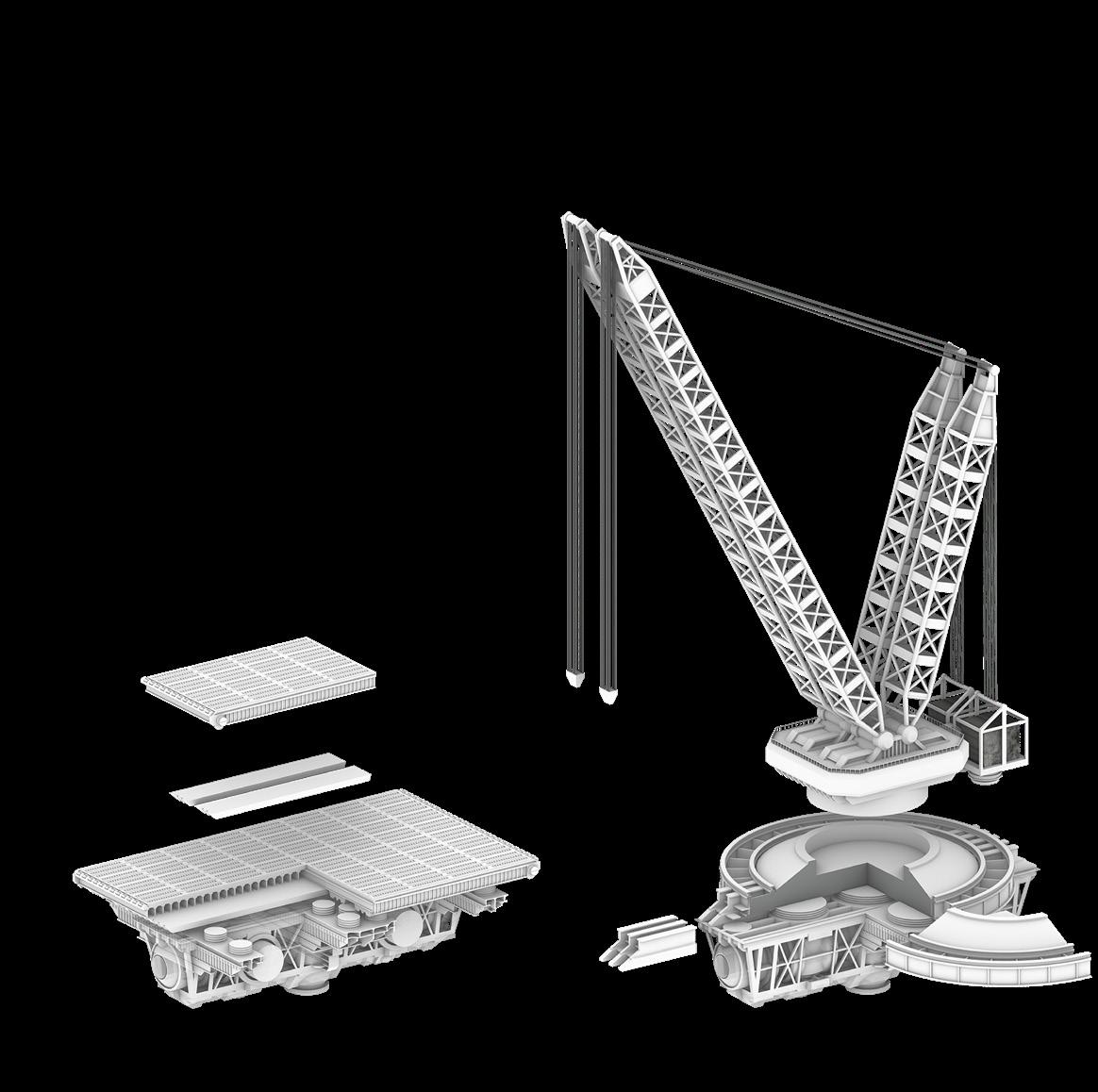
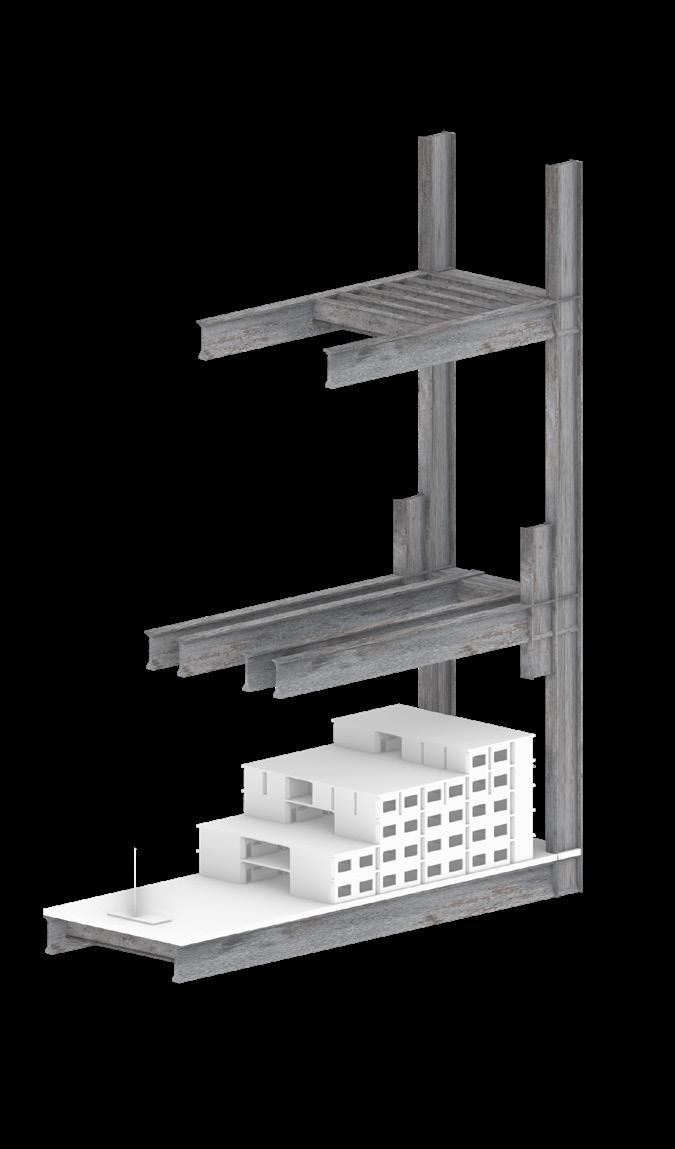

 Education Module
Crane Module
Health Module
Building Transport Module
Leisure Module
Core Module
Education Module
Crane Module
Health Module
Building Transport Module
Leisure Module
Core Module








 This top rendering shows how different living areas are connected by the sky rail transit system, Floating farmlands are placed around each living area and different kind of walking mechine helping with construction and transportation works in the city.
This top rendering shows how different living areas are connected by the sky rail transit system, Floating farmlands are placed around each living area and different kind of walking mechine helping with construction and transportation works in the city.



















 STEP 1
Putting circulation core and the floor of public space in the steel frame.
STEP 2 Putting pre-fabricatied living units inside the steel frame.
STEP 3 Adding cork panels as insulation layers.
STEP 4 Adding white board on the facade.
STEP 5 Adding metal mesh panel outside as shadding.
STEP 1
Putting circulation core and the floor of public space in the steel frame.
STEP 2 Putting pre-fabricatied living units inside the steel frame.
STEP 3 Adding cork panels as insulation layers.
STEP 4 Adding white board on the facade.
STEP 5 Adding metal mesh panel outside as shadding.
















 1.After retirement, tibetans will spend their time on Buddha worship which is to pray to the Buddha and repent of the krama one has created.
3.On the day of funeral, relatives will carry the body to the sky burial platfrom while the audience will come the other way.
5.When the sky burial take place, vultures will eat the dead's body after the master cut up it.
4.Monks take charge of this will recite sutras and burn aromatic plants to attract vultures.
6.After the rite, the family of death still need to recite sutras for 49 days for the reincarnation of soul.
2.They will find peace and happiness by devote themselves to buddha workship and get away from world's chaos.
1.After retirement, tibetans will spend their time on Buddha worship which is to pray to the Buddha and repent of the krama one has created.
3.On the day of funeral, relatives will carry the body to the sky burial platfrom while the audience will come the other way.
5.When the sky burial take place, vultures will eat the dead's body after the master cut up it.
4.Monks take charge of this will recite sutras and burn aromatic plants to attract vultures.
6.After the rite, the family of death still need to recite sutras for 49 days for the reincarnation of soul.
2.They will find peace and happiness by devote themselves to buddha workship and get away from world's chaos.

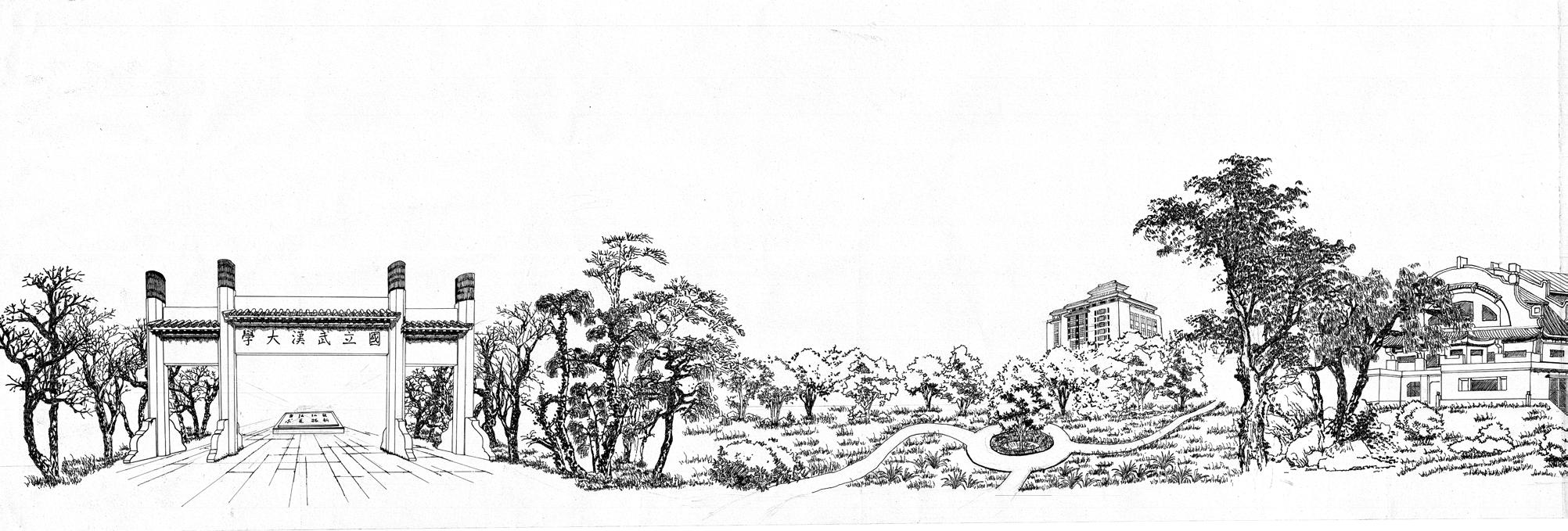
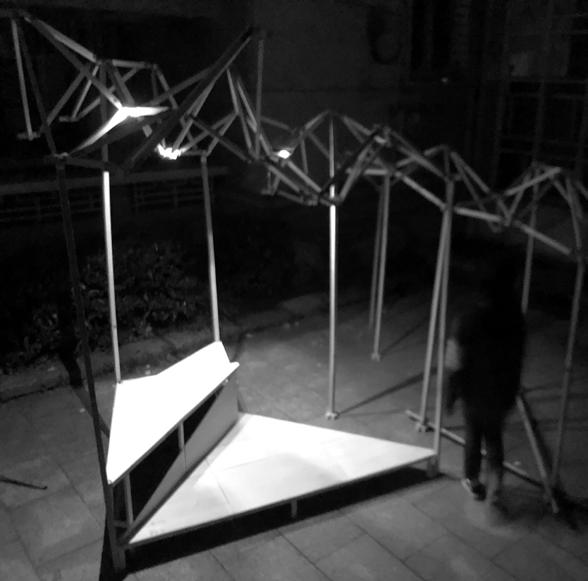


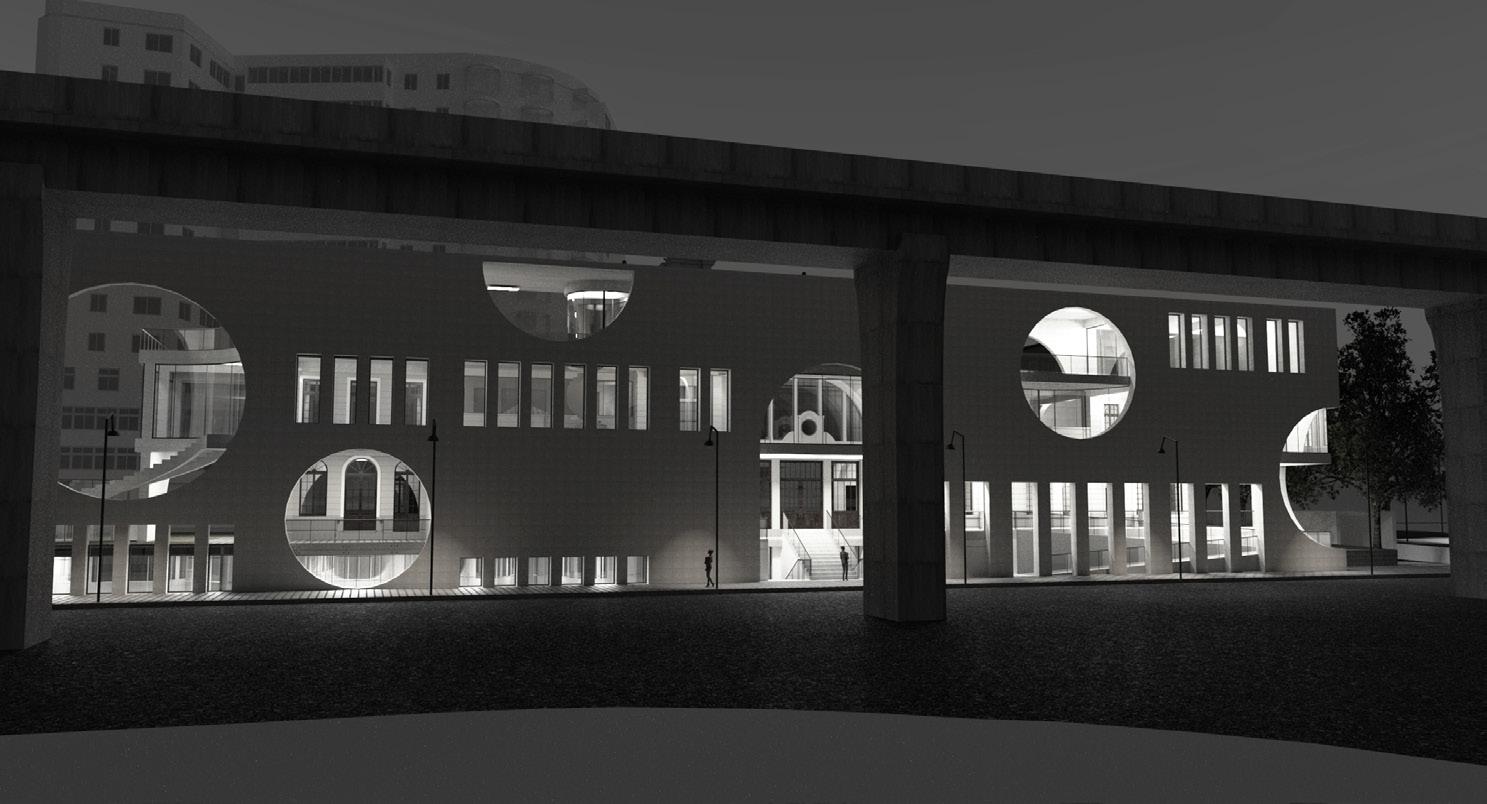 Dazhimen Railway Station Renovation Project
1:1 Pavilion Construction The Rising Cloud Pottery Work The Castle Ruin
3D Composition Work The Explosion Circle
Dazhimen Railway Station Renovation Project
1:1 Pavilion Construction The Rising Cloud Pottery Work The Castle Ruin
3D Composition Work The Explosion Circle

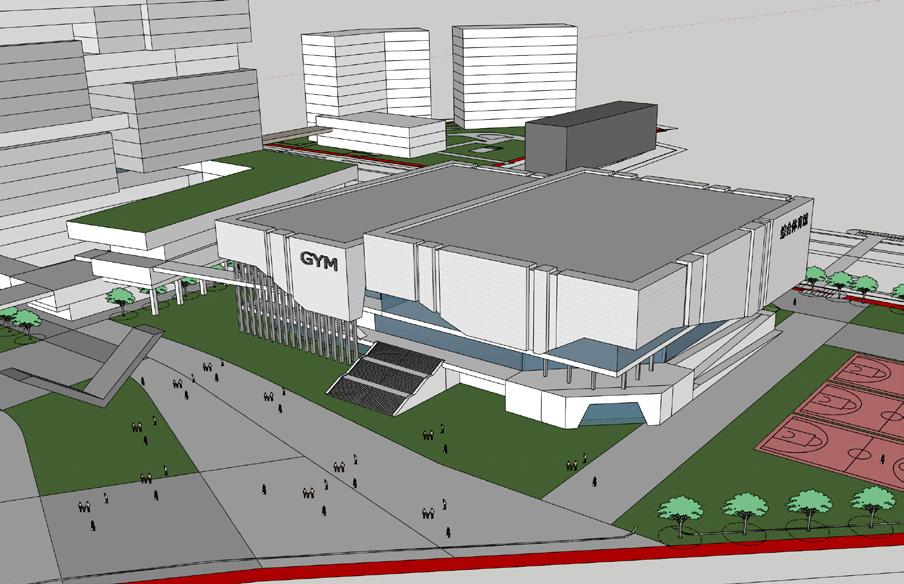
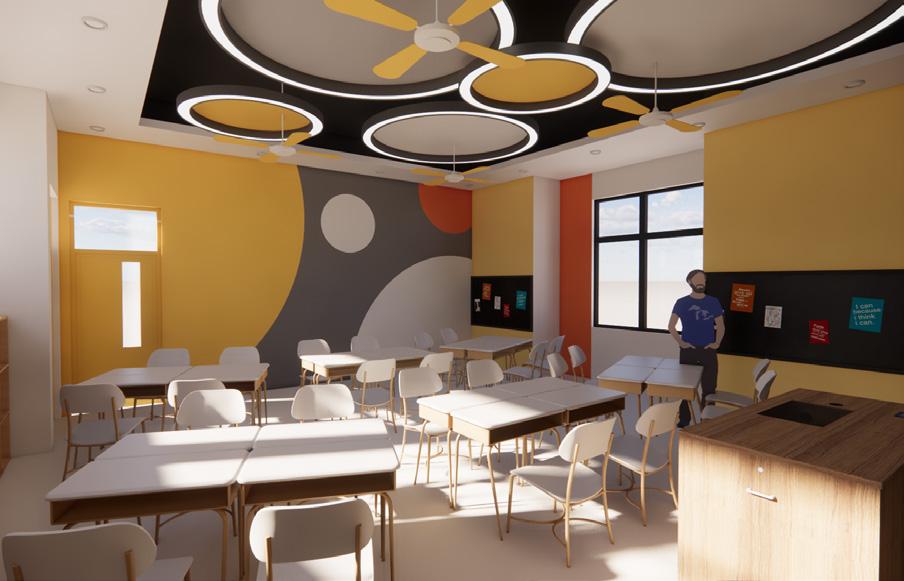 Art Classroom Interior Design of Shatang School Ezhou,China
Concept Design of the Gym of Anhui Agricultural University Hefei,China
Practice in HNAD. 2021
Practiced in CSADI. 2022
Practiced in CSADI. 2022
Art Classroom Interior Design of Shatang School Ezhou,China
Concept Design of the Gym of Anhui Agricultural University Hefei,China
Practice in HNAD. 2021
Practiced in CSADI. 2022
Practiced in CSADI. 2022